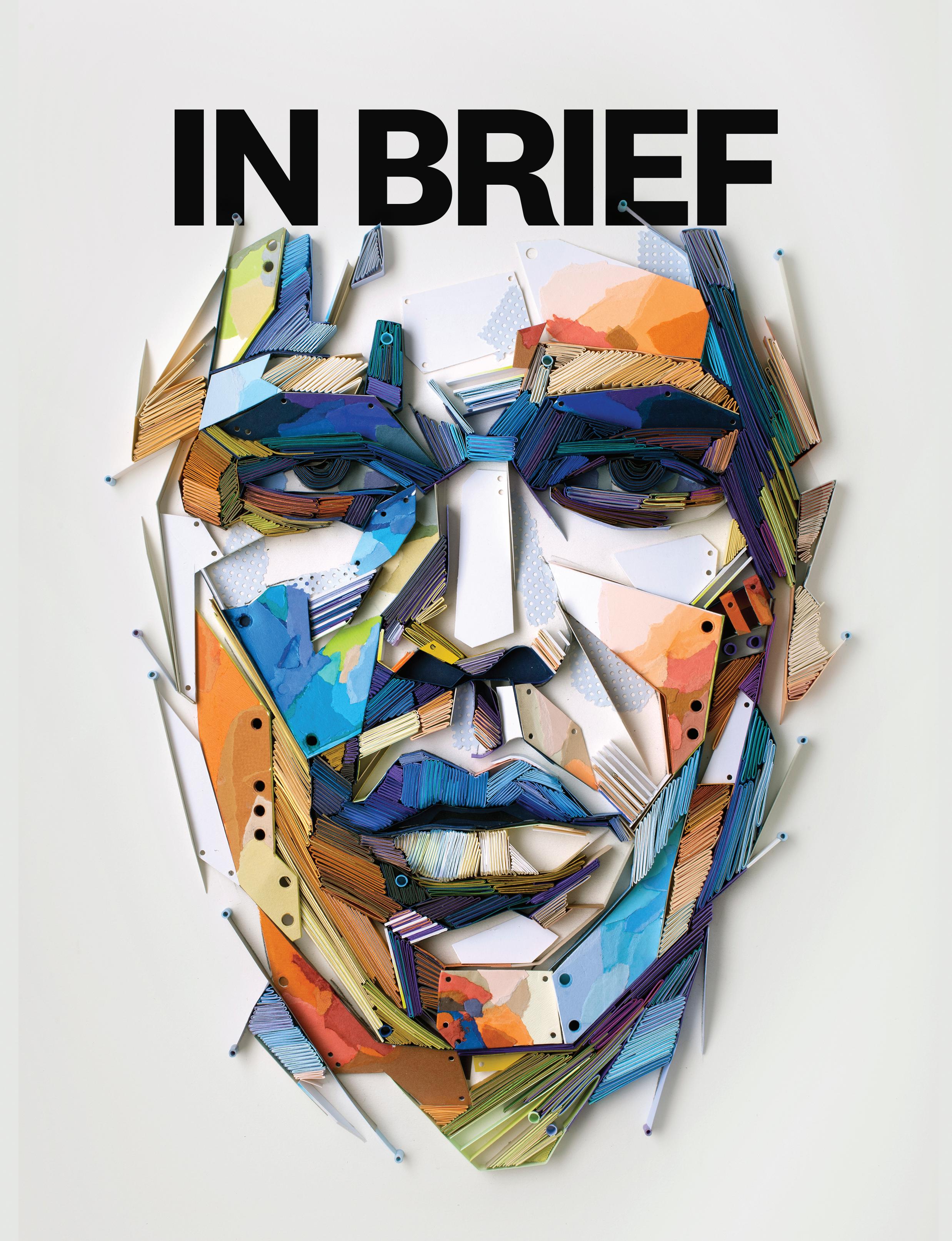
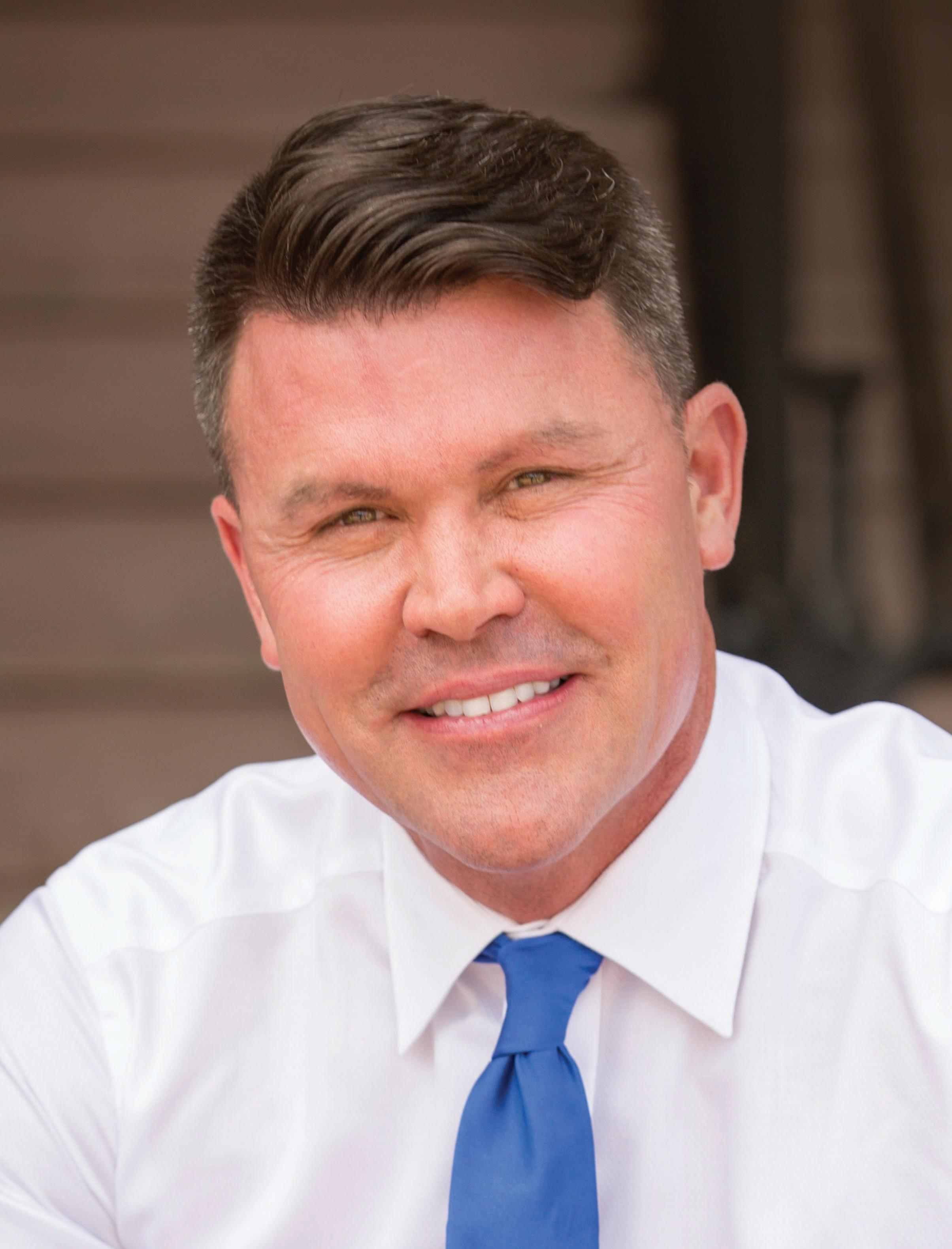
We American lawyers take the law, to day’s political discourse, and the plight of Americans in need very seriously. Most assuredly much more serious than most other Americans. Sometimes the jokes enjoyed by others weigh on us because of the many complications we are taught and trained to know. We see layers. We see the importance of stare decisis to our American society. We see due process.
For example:
“If you are pro-life and anti-mask, you are pro-choice,” one left-leaning friend sent me in the wake of the leaked opin ion from the U.S. Supreme Court, as it weighed overturning Roe v. Wade, the famous 1972 case legalizing abortion in America.
“If you can wait in line for hours for testing… you can vote in person,” came from another more right-leaning friend, as Republican-dominated leg islatures moved to restrict mail-in bal loting across the country in the wake of historically high election turnout in 2020.
These pandemic-related observa tions overlay very complicated so cial issues such as abortion, voting rights, socio-economic disparities, and long-held personal liberties. Yet, when they come in the form of a meme, a short text or even a gif, I find my self analyzing the “jokes” in a much more serious way than I am sure they were intended. I think that is what we lawyers do. While we know there is more than one view to consider on most every issue in American life, we also know respecting the rule of law underpins everything sacred about this great country. Without it, we are nothing.
At this time of palpable tension in our country, at OCU Law we are finding common ground within our law school commu nity. Through constant em phasis on civility, integrity, vigorous debate, and respect for diverse perspectives, we are creating effective advo cates for law and for social
justice. The promise of "one nation, in divisible" is not self-fulfilling, but rather requires the hard and constant work of our democracy. And this work is per formed every day by American lawyers doing great things in defense of the fundamental principles of our democ racy, our historic individual liberties, and an informed, active citizenry.
Here at OCU School of Law, we view that work as our calling. And thankful ly hundreds of our students, and thou sands of our alumni, answer this call every day.
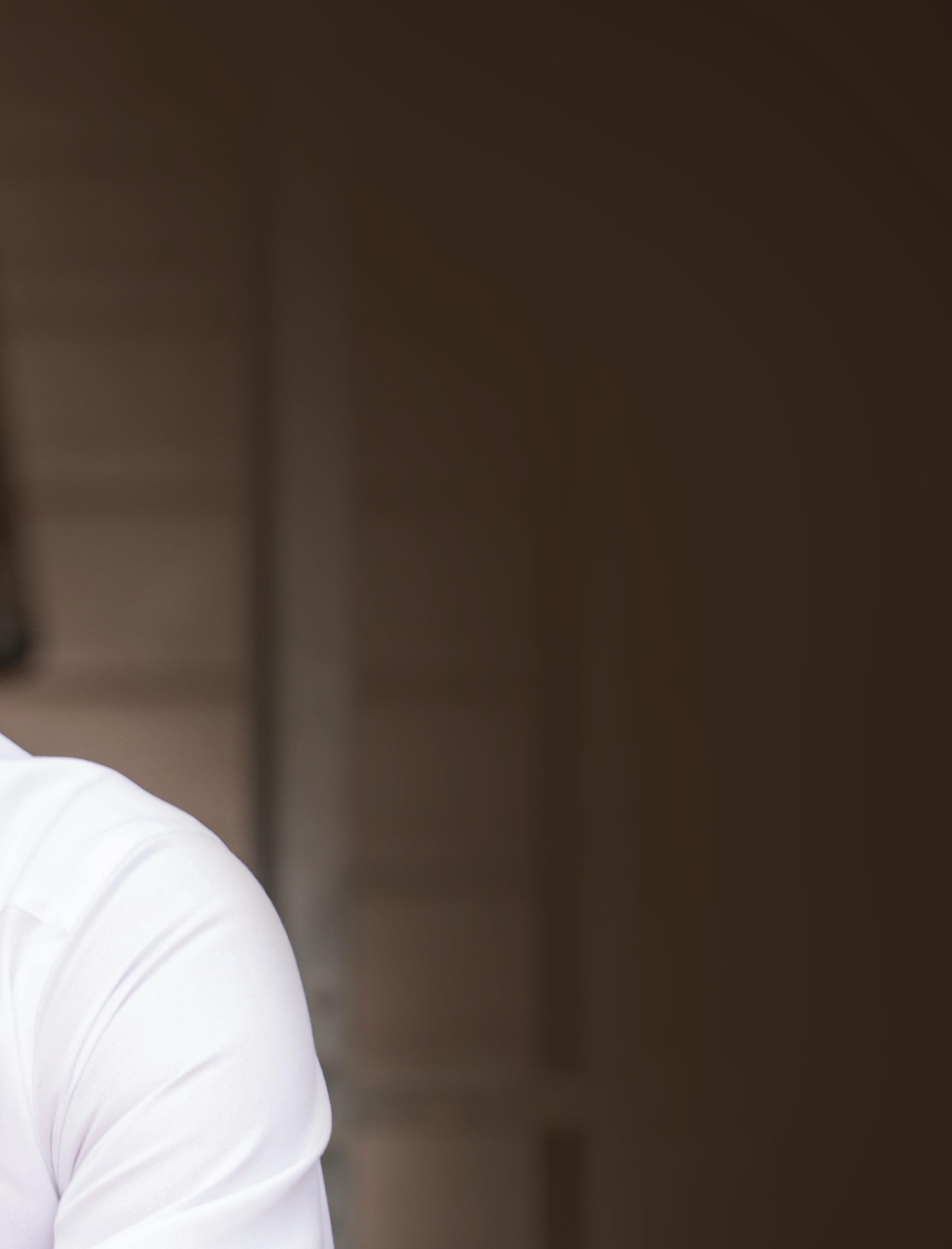
This year’s edition of In Brief provides a wonderful glimpse into the ongoing, ex traordinary work of our students, our professors, our staff and many of our alumni. Our stories include topics on tax reform written by Professor Phyllis Taite, the benefit of lawyers in the leg islature written by the Hon. Collin Wal ke (’08), thoughts on international law and the war Ukraine written by Profes sor Homer Pointer and Professor Jer emy Telman, Social Media Regulation written by Professor Marc Blitz, Immi gration law featuring Martin Valko ’02, Cannabis law in Oklahoma written by Donald Gies ’19 and Ameen Behbaha ni ’20, and the laws surrounding NFTs and Cryptocurrency written by Profes sor Tim Hsieh. Finally, we are highlight ing a couple of amazing alumni: Okla homa Supreme Court Justice Yvonne Kauger ’69, who was recently inducted into both the Oklahoma Hall of Fame and the Oklahoma Historical Society’s Historians Hall of Fame, and a posthu mous profile of Melvin Combs, Jr. ’72, for his mentoring efforts in OKC's black legal community.
So in a world of memes, tweets and texts, our serious, good, deep work con tinues — which is a credit to our OCU community and the rule of law. We hope you enjoy.
Dean Jim Roth ’94
A few friends’ memes this week got me thinking:
Photograph by Simon Hurst
Dawn Harth Timothy T. Hsieh
Phyllis C. Taite
Rep. Collin Walke
Marc J. Blitz
D.A. Jeremy Telman
Homer S. Pointer
Donald E. Gies III
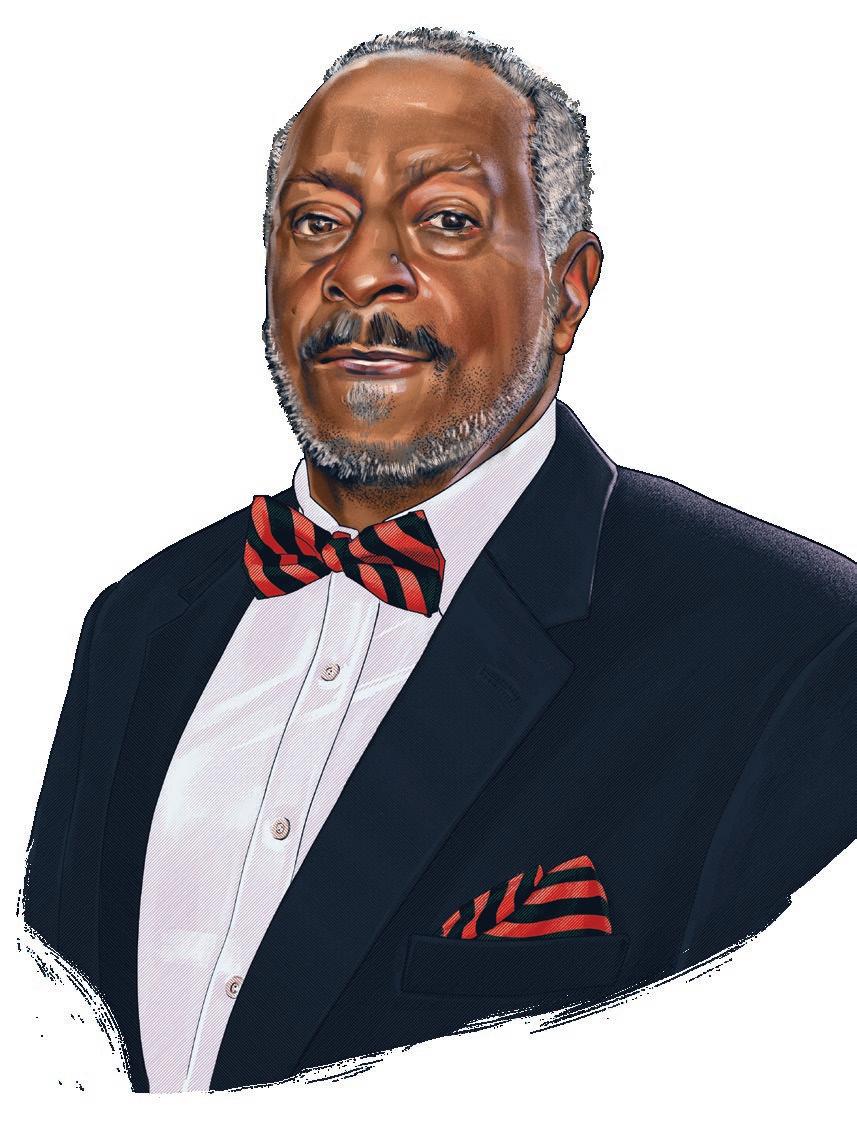
Ameen Y. Behbahani
Julieta Mendoza
Christine Eddington
Lindsey Pever
Ta'Chelle Jones
Lauren Stradinger
Stephen G. Butler Angela Startz
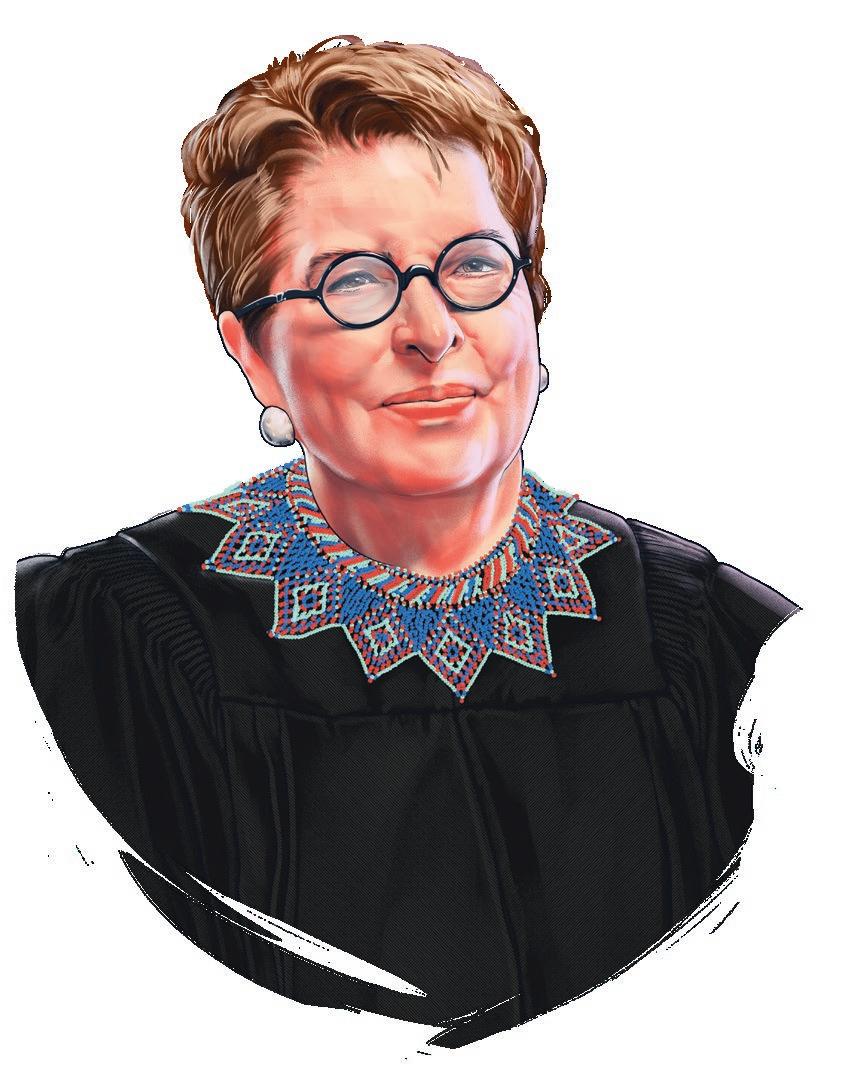 Cover artwork by Yulia Brodskaya
Cover artwork by Yulia Brodskaya
DEAN Jim Roth ’94 CONTACT INFORMATION Admissions 405.208.5354, lawquestions@okcu.edu Advancement 405.208.7100, lawadvancement@okcu.edu Law Student Services 405.208.5332, hireoculaw@okcu.edu 800 N. Harvey Avenue, Oklahoma City, OK 73102 • 405.208.5337, law.okcu.edu All editorial contributions and submissions are welcome and are subject to editing and are used at the Editor-in-Chief’s discretion. In Brief Magazine is a copyrighted publication of Oklahoma City University School of Law. 44 Distinguished AlumniPHOTOGRAPHY Simon Hurst Photography Ian Weston ILLUSTRATIONS Yuschav Arly Yulia Brodskaya Liam Proniewicz WFlemming Illustration CREATIVE DIRECTION & GRAPHIC DESIGN Amy Fuller Flint Inc Lauren Stradinger MBA ’20 Pyrmont Creative Services EDITOR-IN-CHIEF Stephen G. Butler Assistant Dean for Advancement & External Relations Ally Rodriguez ’14 Lagom Creative Studios EDITORIAL STAFF Learn about the latest OCU Law news and events, connect, and have a conversation with us @OCULaw CONTRIBUTORS

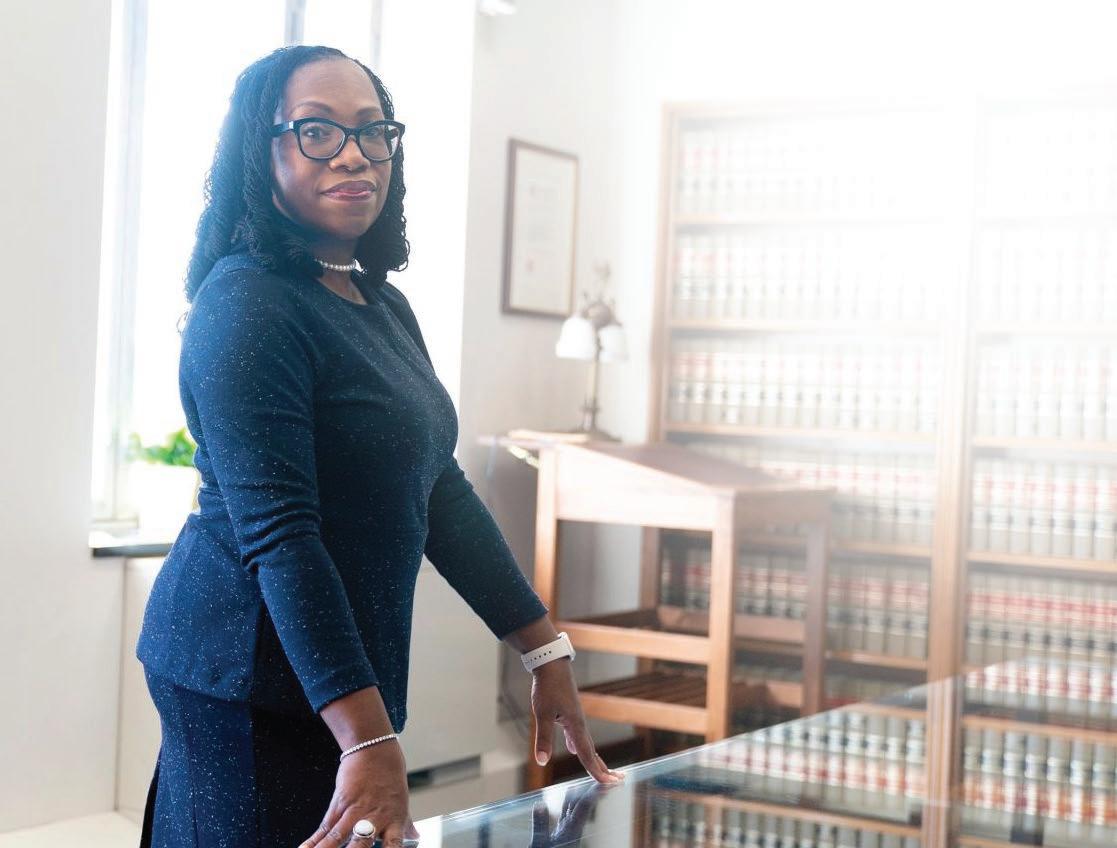

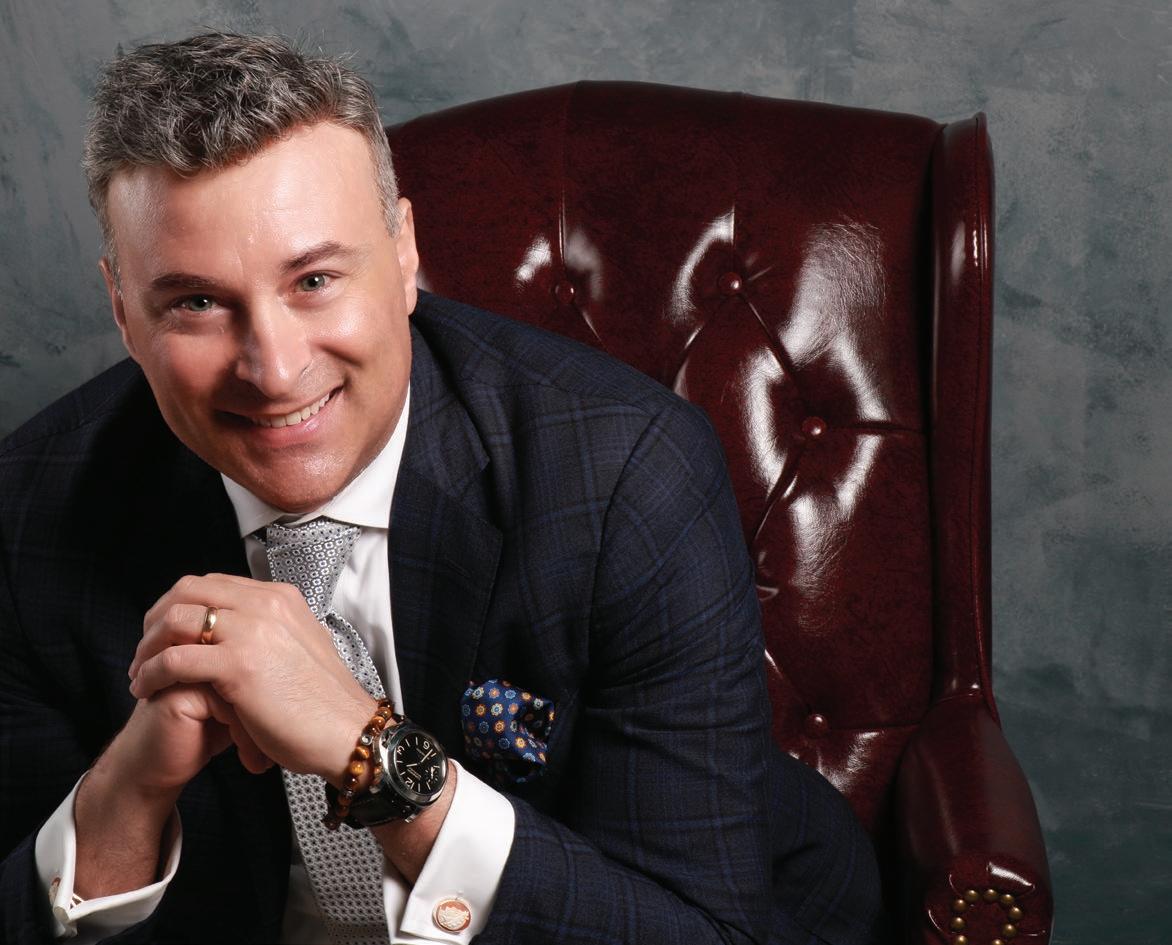
LEGAL TRENDS 32 ALUMNI NEWS 40 GIVING BACK 64 26 24 20 34 38 Spanish for Lawyers Legal Podcasts Reflections Lawyers in the Legislature A Social Media Law Sensation La Prensa LEGAL BRIEFS 4 LEGAL ACTION 9
Legal Briefs
NEWS IN & AROUND OCU LAW
OCU Law Alumni Luncheon
After a year hiatus, the OCU Law Alumni Luncheon resumed, corresponding with the Oklahoma Bar Associ ation's annual meeting. This year’s keynote speaker was Kay Van Wey ’83 (shown below).
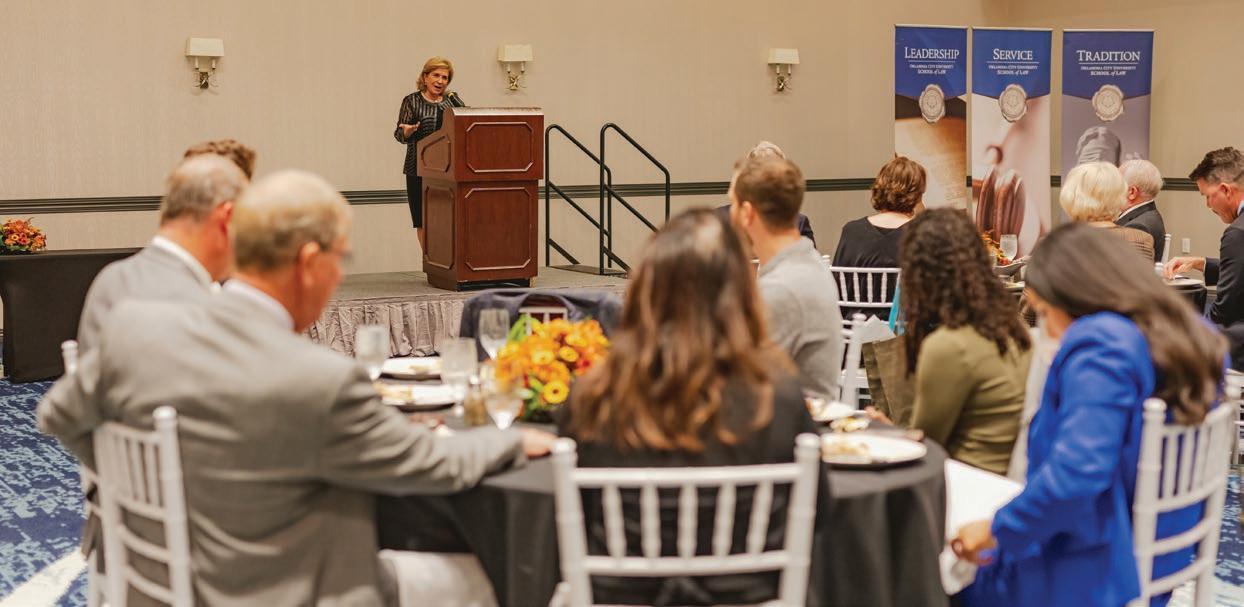
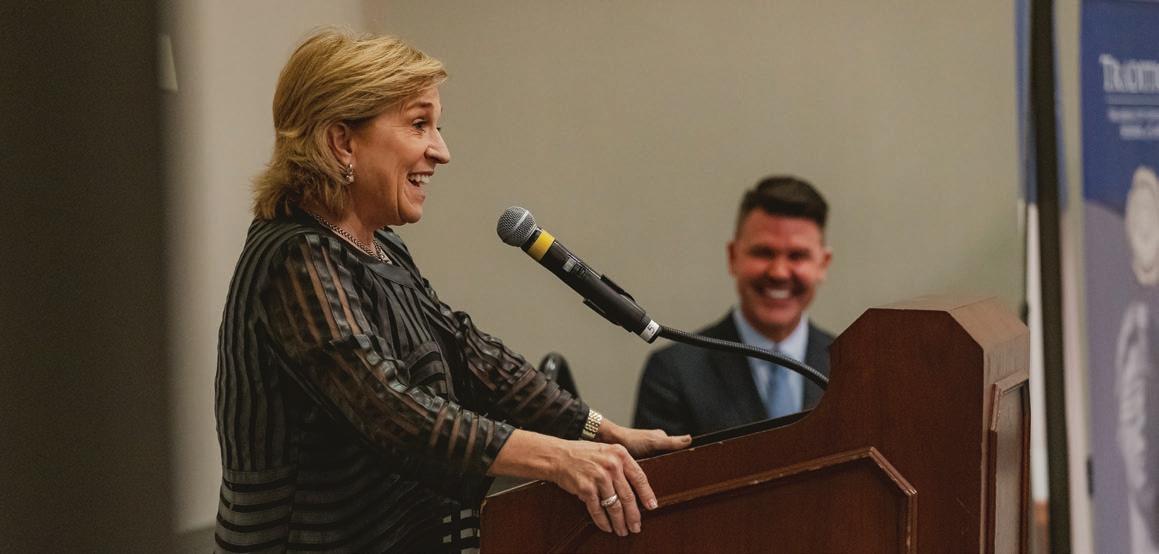
Alumni and friends enjoyed a meal and networking at the Sheraton in downtown Oklahoma City before being regaled by Van Wey with stories about growing up in Lawton, OK, attending OCU Law, and representing 14 plaintiffs who were critically injured by Christopher Duntsch, now known as Dr. Death.
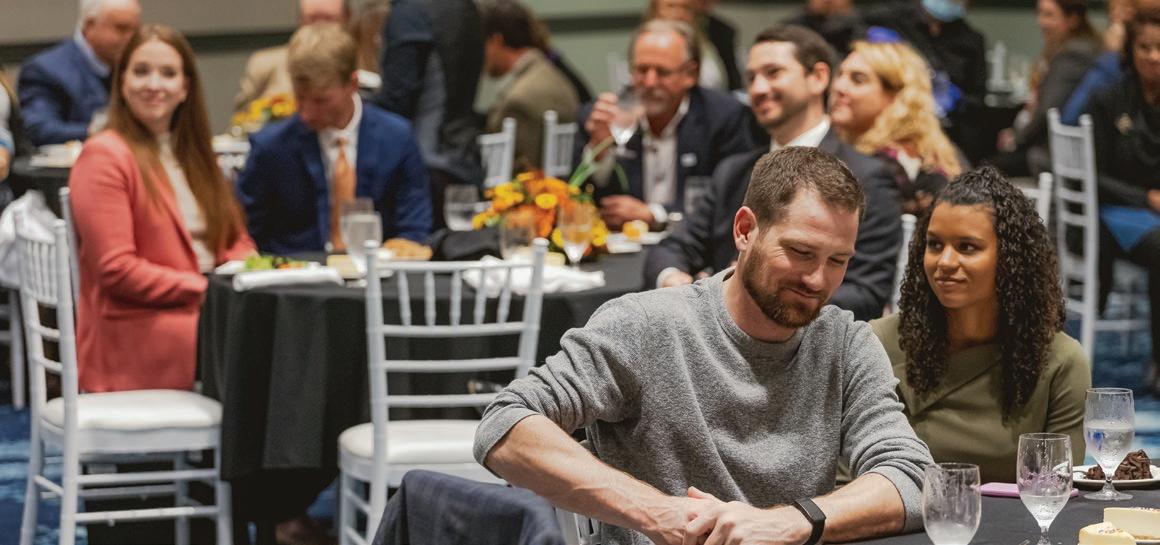
Also recognized at the luncheon were Stephen Hoch, recipient of the OBA Outstanding Senior Law School Student at OCU Law; Katherine M. Crowley, ChapmanRogers Scholarship recipient; and Haley Johnson, Partners for Justice Scholarship recipient.
OCU Law Alumni Association CLE Series
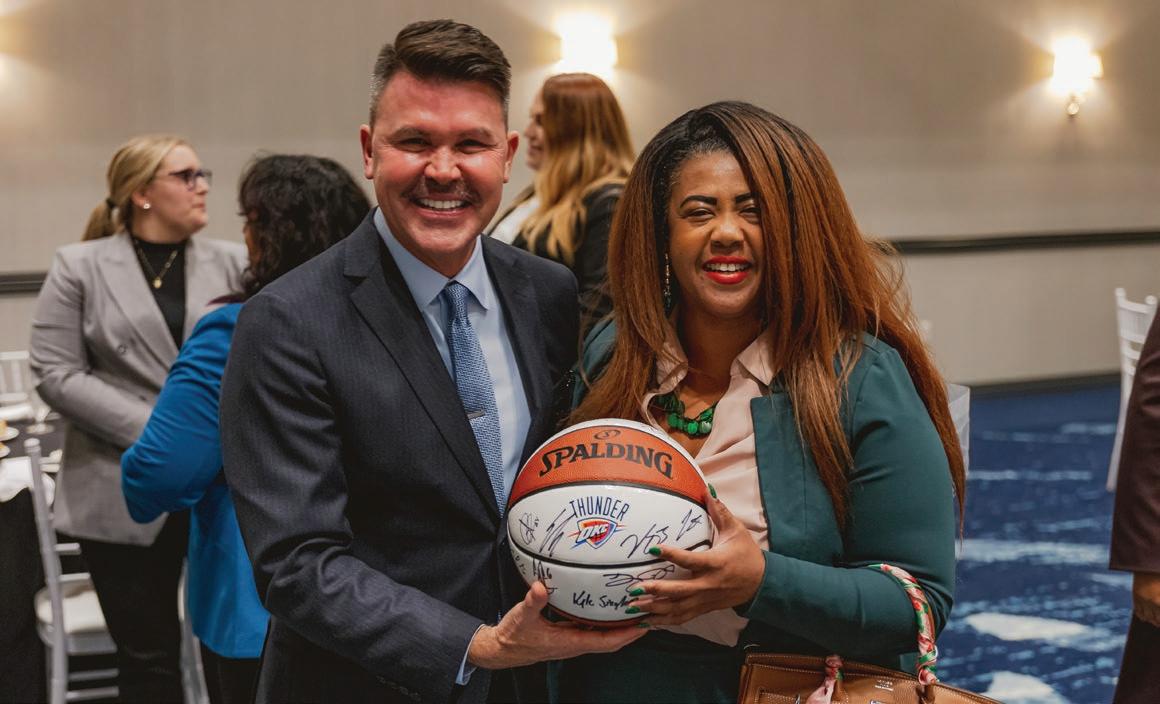
Over the last year, members of the OCU Law Alumni Association were treated to a free CLE online each month organized by Lauren Mass ’13.
In November, Breanna Cary ’17 presented on humanitarian immigration applications for Afghan evacuees, with 1,800 Afghan nationals expected to be resettled in Oklahoma.
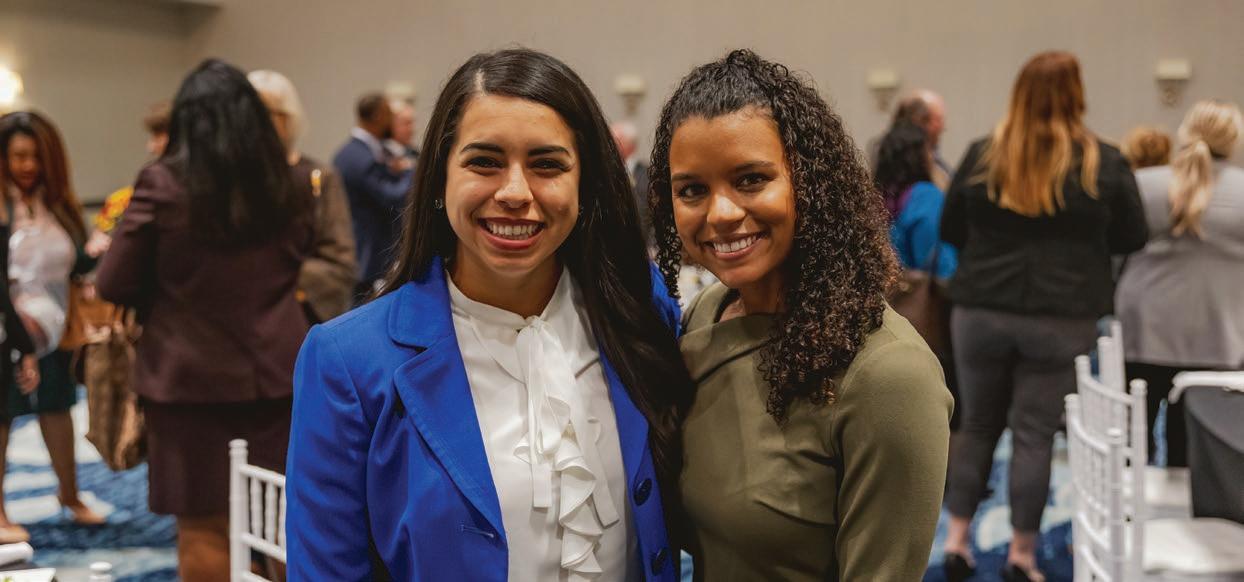
January brought “Decisions without Regret” for an ethics credit, presented by Angie Hooper. Attendees were given access to Hooper’s website to help control stress and avoid issues that could lead to disbarment.
Felina Rivera presented on the changing world of cannabis law in February, and in March, Ande Burchfield ’13 presented on the hot topic of Blockchain Technology, Cryptocurrency, and the Law.
The April presentation on “The Good, The Bad and The Ugly of Depositions” was presented by Justin Meek ’06 and Ben Grubb ’13, and Kelly Hunt presented “The Common Law Spouse Conundrum” in May. Free continuing legal credits are offered for the members of the OCU Law Alumni Association.
Speaker Kay Van Wey ’83
Photography by OCU Photography, Ian Weston
LEGAL BRIEFS
Brennan Lecture: Montesquieu on Criminal Judgments
Presented by Vickie Sullivan, Cornelia M. Jackson Professor of Political Science at Tufts University
Montesquieu (1689-1755) was a dominating figure of the French Enlightenment. Although his theory of the separation of powers had a profound influence on the Framers of the American Constitution, contemporary scholars largely find his relevance as a thinker who refuses to cast judgment on the vast array of societies he examines, ancient and modern, Eastern and Western. Such scholars regard the philosopher as an objective social scientist, a relativist, and a particularist. This lecture focused on his views of criminal judgments. In Spirit of the Laws, he proclaims: “The knowledge already acquired in some countries and yet to be acquired in others, concerning the surest rules one can observe in criminal judgments, is of more concern to humankind than to anything else in the world.” Thus, on the matter of criminal judgments, this philosopher—who wrote indirectly and generally eschewed offering his own opinions in favor of making seemingly neutral observations—issues an opinion in the superlative that has wide-ranging implications.
Professor Sullivan explored how Montesquieu treated criminal judgments in his majestical work The Spirit of the Laws and why he might deem knowledge of the correct way to proceed in rendering such judgments the most important knowledge simply. It also examined the influence Montesquieu’s view of criminal laws and punishments had on subsequent thinkers.
Quinlan Lecture:
The New Gatekeepers?: Social Media and the "Search for Truth"
Presented by Ashutosh Bhagwat, Boochever and Bird Endowed Chair for the Study and Teaching of Freedom and Equality and Martin Luther King Jr. Professor of Law at UC Davis School of Law
Through most of the 20th century, trusted communicators were also the gatekeepers of knowledge and news. These gatekeepers overwhelmingly tended to reflect the views of the political center. Eventually, this system of institutional concentration and consensus collapsed. The primary response to the resultant angst has been to place enormous amounts of pressure on social media to serve as new gatekeepers who replicate the role of the 20th century institutional media. However, we should not ask social media to be gatekeepers who determine who is, and is not, a trusted communicator. Social media have neither economic incentives to act as responsible gatekeepers nor expertise or training that would enable them to be effective in that role. Perhaps the collapse of gatekeepers and trusted communicators is not such a terrible thing after all. Instead of trying to recreate a bygone era, we should be thinking about how to reinvigorate a truly democratic marketplace of ideas and create public discourse that surmounts polarization.
Alumni Receptions
Alumni gathered with OCU's newest president, Dr. Kenneth R. Evans and OCU Law Dean Jim Roth to plant a flag and establish an OCU:Tulsa Alumni Chapter and an OCU:DFW Alumni Chapter in fall of 2021.
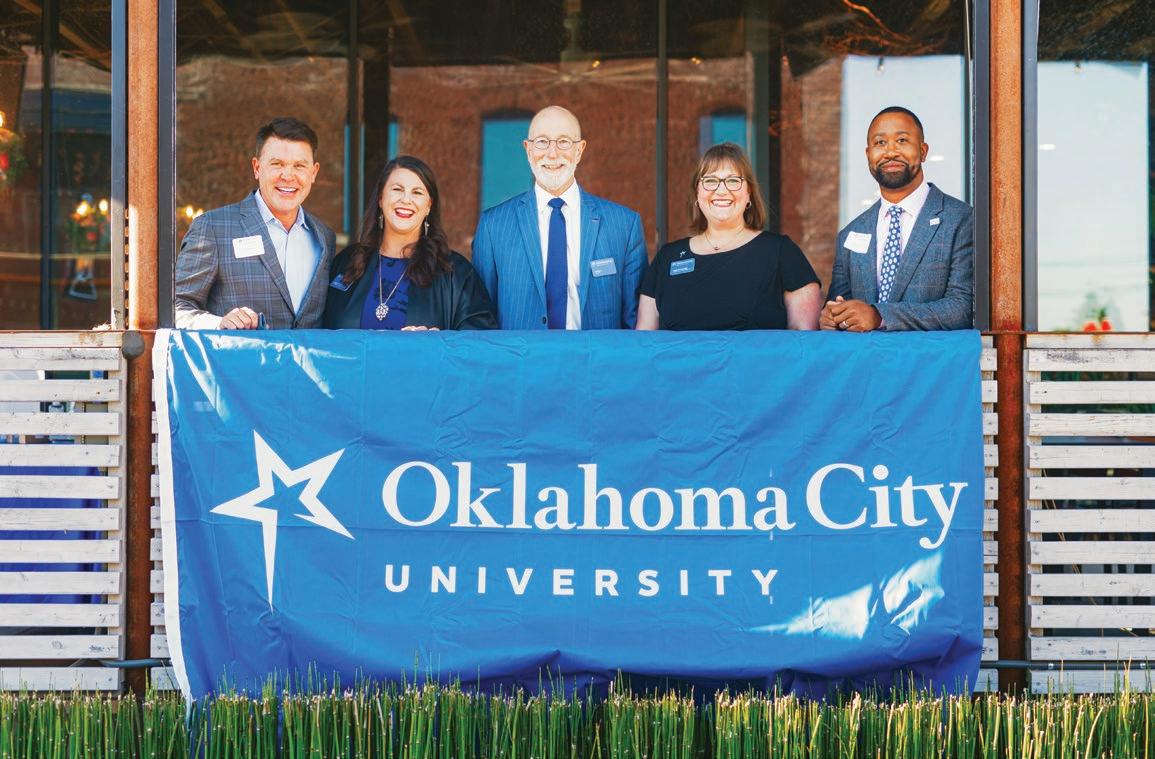
The OCU:Tulsa 2021 Alumni Reception was co-hosted by Richard Wansley B.A. ’71 & Meredith Davison B.A. ’69, Eva Marie Campbell B.M. ’88, Hope Wiggs B.A. ’17 and cosponsored by OCU's Office of Alumni Engagement and the School of Law. The event was held at Tulsa’s The GOAT Bar & Kitchen.
The OCU: DFW 2021 Alumni Reception was co-hosted by Emily Lloyd Herman, BA ’09 and Nathan Jacob, JD ’20, and co-sponsored by OCU's Office of Alumni Engagement and the School of Law. The event was held at the Garden Room at Chelsea Corner in the DFW area. Food and drink for this event was generously sponsored by the Zinda Law Group.
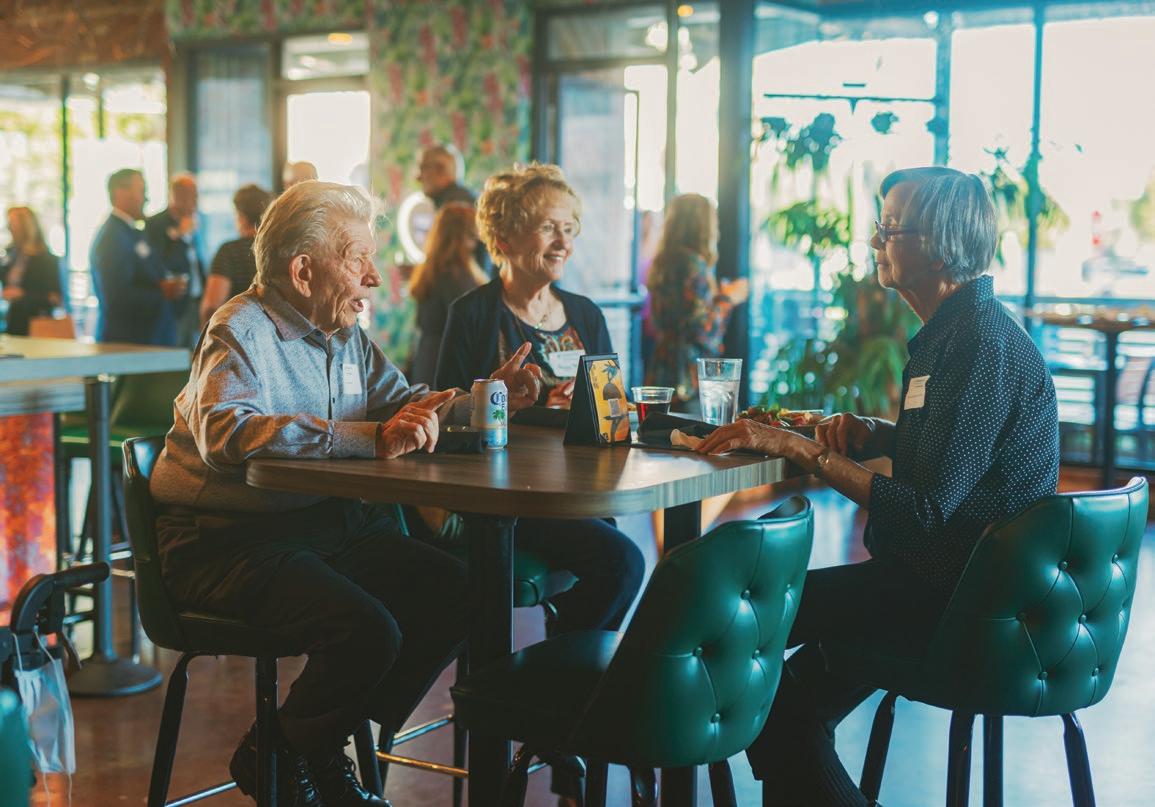
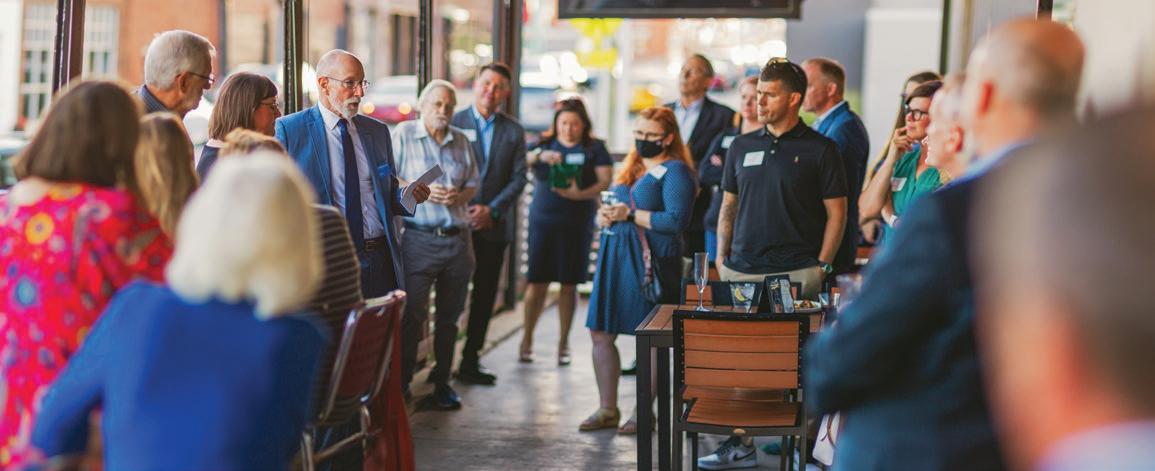 Photography by OCU Photography, Ian Weston
Photography by OCU Photography, Ian Weston
OKLAHOMA CITY UNIVERSITY SCHOOL OF LAW
ANNOUNCED TWO NEW FACULTY MEMBERS
Timothy Hsieh
joins OCU Law as an Assistant Professor of Law with his focus in the areas of Intellectual Property (IP), Law & Technology, particularly in Patent Law, Antitrust Law, Trademark Law, Copyright Law, Trade Secret Law, hybrids between all of those IP forms, Computer, Internet & Social Media Law, Information Technology & Privacy Law, Blockchain & Artificial Intelli gence (AI) Law, Law & Literature/Film, Entertainment & Sports Law, and Asian American Legal Studies.
In 2015, 2016 and 2018 he was named a Super Lawyers “Rising Star.” Hsieh served as a judicial law clerk to the Honorable Roy S. Payne of the U.S. District Court for the Eastern District of Texas, the Honorable Kandis A. Westmore of the U.S. District Court for the Northern District of California, and a pro bono law clerk to the Honorable Michael A. Shipp of the U.S. District Court for the District of New Jersey.
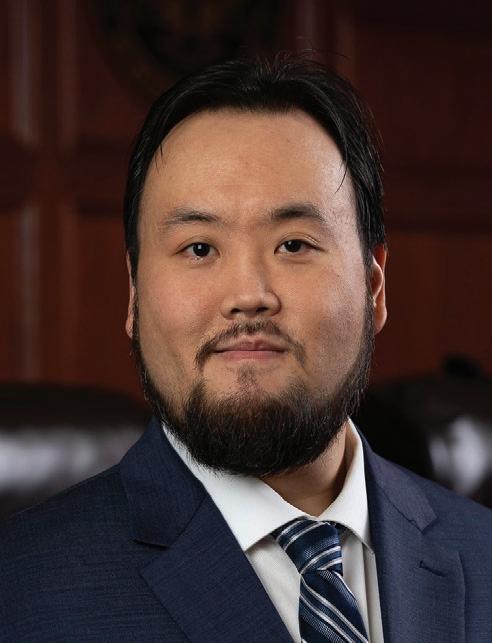
Hsieh served as Assistant Patent Examiner at the USPTO and was a judicial law clerk to the Honorable Jameson Lee, Administrative Patent Judge at the Patent and Trial Appeal Board. He was elected as the 21st Editor-in-Chief of the Journal of the Patent & Trademark Office Society – the first Asian American Editor-in-Chief – and acts as Chair of the Society’s Legislative Committee. Hsieh was an elected USPTO Counselor on the 2019-2020 Board of the Pauline Newman IP American Inn of Court, a nominated member of the Giles S. Rich American Inn of Court and is part of the American Inns of Court Pegasus Scholars Placement Committee and the Hastings Law Journal Alumni Board.
Professor Hsieh holds a B.S. in Electrical Engineering & Computer Science from UC-Berkeley, a Master of Science in Electrical Engineering from UCLA, and obtained his JD from the UC-Hastings College of Law, and a Master of Laws degree, with a Law & Technology (IP) certificate focus, from the UC- Berkeley School of Law. While there he was elected to the Dean’s Circle, received “High Honors” in Patent Law, Trademark Law, Copyright Law, Administrative Law & Antitrust Law, and worked as an Articles Editor on the Berkeley Technology Law Journal.
His award-winning writing has been published in IDEA: The IP Law Review; the Fordham IP, Media & Entertainment Law Journal; the Washington Journal of Law, Technology & Arts; the NYU Journal of IP & Entertainment Law; Aspen Book Publishers and IEEE Potentials.
Under his pen name of “Timothy Tau”, Hsieh has written, directed and produced award-winning short fiction films. He also taught “Introduction to Screenwriting” at The Writer’s Center in Washington D.C.
“Professor Hsieh, having served as a leader within the USPTO, brings great practical insights into the many intellectual property issues alive in today’s economy, and we are grateful for his energy and drive to inspire our students,” Dean Roth said.
Phyllis Taite joins OCU Law after spending 18 years on the faculty of Florida A&M University College of Law. Prior to FAMU, Professor Taite served eight years as a commissioned officer and attorney in the United States Army Judge Advocate General’s Corps (JAG). As a JAG officer, she provided estate planning needs and tax assistance to soldiers and officers serving the country at home and overseas.

She teaches a combination of Federal Income Tax, Wills, Trusts & Estates, and Property-based courses. Her teaching package may also include Estate & Gift Tax, seminar courses with an emphasis on income and wealth inequalities, and other social justice issues. With nearly two decades of teaching experience, Taite continues to teach with passion, which brings out enthusiasm and interest to otherwise difficult subjects.
Her articles are published in law reviews nationwide and most recently in the University of Florida Tax Review, University of South Carolina Law Review, and Pepperdine Law Review. Cited by leading tax scholars, Taite is a regular contributor to Jotwell and Tax Notes, a leading provider of tax news and analysis for the global community, and a new contributor to Tax Stringer.
Professor Taite has served as a speaker, panelist, and commentator at numerous national conferences including the Florida Tax Institute, University of Florida, Levin College of Law Colloquium Series, ACTEC Florida Fellows Conference, the University of South Carolina Virtual Symposium on Taxation, Finance, and Racial Justice, and the Vermont Bar Association CLE on Tax and Social Justice.
Taite serves on the Legal Education Committee for the American College of Trust and Estate Counsel (ACTEC), Florida Bar Probate Rules Committee, and Tax Section of the Florida Bar. She previously served on the Florida Continuing Legal Education Committee and as a director of the Florida A&M University Foundation. She is a member of Academic Fellow of ACTEC, Real Property and Probate Section of the Florida Bar, The Florida Bar, and the American Bar Association. She is admitted to practice in the U.S. Court of Appeals for the Armed Forces and the State Bar of Florida.
“Professor Taite is a nationally renowned scholar bringing great emphasis to issues of disparity, interest and consequence in the U.S. Tax Code and we are thrilled to have her great experience at OCU Law for our students’ sake,” said Jim Roth, Dean of OCU Law.
D.A. Jeremy Telman
LEGAL
Timothy T. Hsieh
Phyllis Taite
This page: portrait photography by Simon Hurst Photography. Opposite page: "Ride to OCU" by Nick Trougakos, Senior Director of Marketing and Communications for OCU. Photography by OCU Photography, Ian Weston
BRIEFS
6 OKLAHOMA CITY UNIVERSITY SCHOOL OF LAW IN BRIEF
Ride to OCU
Stanley Draper Drive wraps about 13 miles around its name sake lake in southeast Oklahoma City. Just to the south of Tinker Air Force Base, the road typically sees little traffic. It has uphill climbs and downhill glides. As you travel the pavement, you can find yourself fighting the Oklahoma wind or feeling the breeze coax you along from behind.
Cycling is a passion – perhaps one of the biggest passions after his sons and grandchildren and his art collection –for Dr. Kenneth R. Evans. OCU’s newest president – the school’s 19th – picked up the pastime when he himself was 19, and since has completed numerous 100-mile rides in places all over the country. This includes rides in Missouri, where he keeps a home in Columbia, and in Texas, where he served as president of Lamar University in Beaumont for eight years.
The majority of his early-morning rides around Lake Stan ley Draper came during Evans’ previous stop in the Okla homa City metro, when he was business dean at the Uni versity of Oklahoma for six years. That stint ended in 2013, when he assumed leadership at Lamar. Rewind to an August morning in 2021. Re cently installed as president at OCU, Ev ans returned to Lake Stanley Draper for a reunion ride on his favorite route. The president said he sees such rides as an opportunity to clear his head.
“It’s as much a therapeutic event as it is a physical event,” he said. The endurance bike ride also has parallels, Evans said, with running a university.
“There is an endurance associated with any role in a leadership capacity,” he said. “There is an element where, as you’re working on initiatives, you have to persist. At the same time, when the elements are working against you, you need to know to get off the bike and re-route and come back and try it again.”
There are times when there are significant differences, as well. “I’ve bailed on rides when heavy torrential rains have caught me when I didn’t think they were going to happen, or something else has occurred,” he said. “The difference is, in most cases when I ride, I ride alone. There’s no way in the world that you can do what we do here solo. It’s a team effort, it’s a commu nity engagement, or we’re not going to get where we need to go.”
Evans said he’s seen evidence of that community engagement during his time at Oklahoma City University.
Upon his arrival at OCU, he immediately noticed the faculty and staff commitment
to student success, he said. As students showed up on campus, “I was just really impressed with their energy and how engaging they were, and the kind of questions they were asking. I found them to be really talented and I was excited about the opportunity to work with them.”
Addressing a luncheon at the Oklahoma City Rotary Club, the president explained one of his goals for work ing with OCU’s student body.
“We must be involved in the creation of knowledge,” Evans said. “We’re not preparing students to just know how to function in the now. I want them to function in what can be. To be able to function in what can be means they have to have the ability to challenge what is.
“Ask intelligent questions, build frameworks to investi gate it, and then eventually make meaningful differenc es in transforming the industries they’re involved in.”
Evans’s decision to leave Lamar was influenced by the passing of his wife, Nancy, in 2018, after a battle with cancer. The president said it was difficult to be on the campus without his wife, and each day see all the things the couple had accomplished together.
“Serving in a university after your wife has passed away is hard,” Evans said during an on-campus candidate forum in March 2021, before he was selected as president. “It reached a point where I needed to be in a different space.”
Fortunately, Evans has a support sys tem in place in Oklahoma City, thanks to friendships formed during his time at the University of Oklahoma, which helped play a role in his decision to ac cept the president’s position at OCU.

“I have some very dear friends here, who I thoroughly enjoy, and it was just great to be able to be back among them and to spend time with them,” he said. “And then this is a heck of a lot closer to my two sons than I was in Beaumont.”
He now splits the geographical dis tance between his boys — it’s about seven hours by car to his younger son, Brian, in New Mexico, and about seven hours to his older son, Paul, and grand children in St. Louis. Evans has often quipped that thanks to the grandchil dren, that Paul is his favorite son.
“The city’s beautiful,” he told the Ro tary Club during his speech there. “It’s incredible what’s transformed here. I’m absolutely stunned.”
As Oklahoma City continues this stun ning rise, the president now aims to en sure Oklahoma City University can rise alongside it.
Dr. Kenneth R. Evans
Academic Excellence Awards
Judge Dwain Box Memorial Award for Outstanding Appellate Advocate
Drew Edward Davis and Stephen Clements Hoch
T. Hurley Jordan Award for Excellence in Criminal Procedure
Erin Elisabeth Smith
Charles Nesbitt Energy Law Award for Excellence in Energy Law
Staci Lane Masquelier-Sweeden
Oklahoma Bar Association Business/Corporate Law Section for Excellence in Corporation Law
Shade Kremer for Spring 2021
Miguel Angel Figueroa for Fall 2022
Oklahoma Bar Association Estate Planning, Probate, and Trust Section for Excellence in Estate Planning and Income Tax
Samantha Denece Morgan Jones
Oklahoma Bar Association Financial Institutions and Commercial Law Section for Excellence in Commercial Law
Caroline Joy Baird
Oklahoma Bar Association Litigation Section for Excellence in Litigation Skills
Drew Edward Davis and Stephen Clements Hoch
Oklahoma City Real Property Lawyers Association for Excellence in Property Law
Matthew Ryan Eads
Outstanding Service Awards
Oklahoma City University Law Alumni Association Award
Maria Guadalupe Escobar, Alyssa BreAnn Gordy and Yovana Lopez Medina
Dean's Service Award for Outstanding Service to the School of Law
Yovana Lopez Medina
Outstanding Graduate Awards
Judge Alfred P. Murrah Sr. Award for Outstanding Academic Performance
Peter K. Wright
Oklahoma City University School of Law Justice Yvonne Kauger Award
Tessa Jean Clinton
Outstanding Graduate Award
Katherine Marie Crowley Jimenez
J. William Conger Distinguished Student Award
Alex Michael Courtney and Erin Elisabeth Smith
Oklahoma Bar Association
Outstanding Law School Senior Student
Stephen Clements Hoch
Spanish for Lawyers Program
Several scholarly articles have been published about the unequal opportunity of minority students in law school. One of the top factors of not passing the bar exam on your first attempt is not feeling like you belong in the legal community. Seeing a real opportunity for OCU Law to help its students find a community, Assistant Director of Academic Achievement, Katie Metallo, began speaking to esteemed local abogados to find a way to bridge the gap. Aiming to build community and inhibit imposter syndrome, Metallo began to develop a program that would not only provide equal academic opportunity, but also give students a sense of belonging.
After years of preparation, the Spanish for Lawyers Program launched in Fall 2021. The academic goal was to further develop students’ bilingual capabilities in a professional legal setting. The program invites individuals who have displayed an ability to speak any level Spanish and who wish to further that ability in the legal realm.
Throughout the year, Spanish for Lawyers met nine times with each session focusing on a different skill. In the fall, students worked with a Spanish speaking “client” and performed legal tasks surrounding a battery case. This year’s tasks included a client email in Spanish, an interoffice memo in English, and several speaking activities to fill out real court forms. Students also worked with another pair of Spanish speaking “clients'' on a Fourth Amendment search and seizure issue. This culminated in the inaugural Spanish for Lawyers Program Moot Court Competition. A total of eight teams competed in four individual rounds. The Honorable Judge Suzanne Mitchell of the United States District Court for the Western District of Oklahoma sat as the presiding judge. Together with the other two judges, she announced 1L Claudia Sanchez-Zavaleta and 2L Julieta Mendoza as the overall competition winners.
In addition to participating in the semester's programming, students were encouraged to further develop their skills by writing an article for La Prensa. La Prensa is the first Spanish law publication in the state of Oklahoma. The articles focus on matters of interest to the Spanishspeaking community. Each article in La Prensa includes a synopsis written in Spanish, followed by a thoughtful opinion, report, or article relevant to legal topics.
LEGAL BRIEFS 8 OKLAHOMA CITY UNIVERSITY SCHOOL OF LAW IN BRIEF
Publications List
BY PROFESSOR
PUBLICATIONS
Does the Multistate Bar Exam Validly Measure Attorney Competence? 82 OHIO ST. L. J. ONLINE 21 (2021)
OTHER
Panelist for Closing the Law School Gap: A Collaborative Effort to Address Educational Inequities Through Free, Asynchronous Tools, June 2021 CALICon Conference, The Distance Genie is Out of the Bottle.
Panelist for Closing the Law School Gap: A Collaborative Effort to Address Educational Inequities Through Free, Asynchronous Tools, February 2021 Transnational Conference on the Future of Legal Education, the Practice of Law, and the Judiciary.
Steven Foster
Instructor of Law B.A., University of Oklahoma J.D., Oklahoma City University School of Law
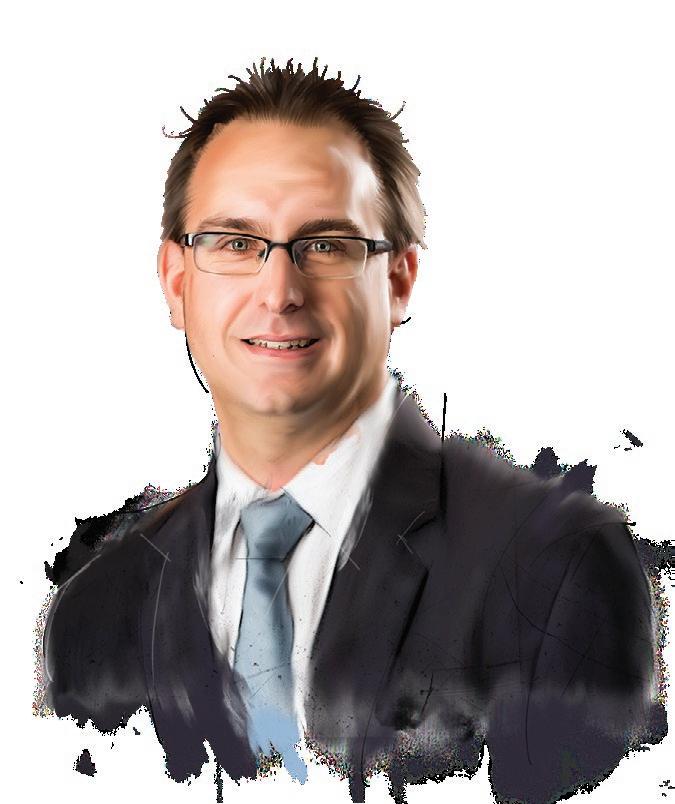
Timothy T. Hsieh
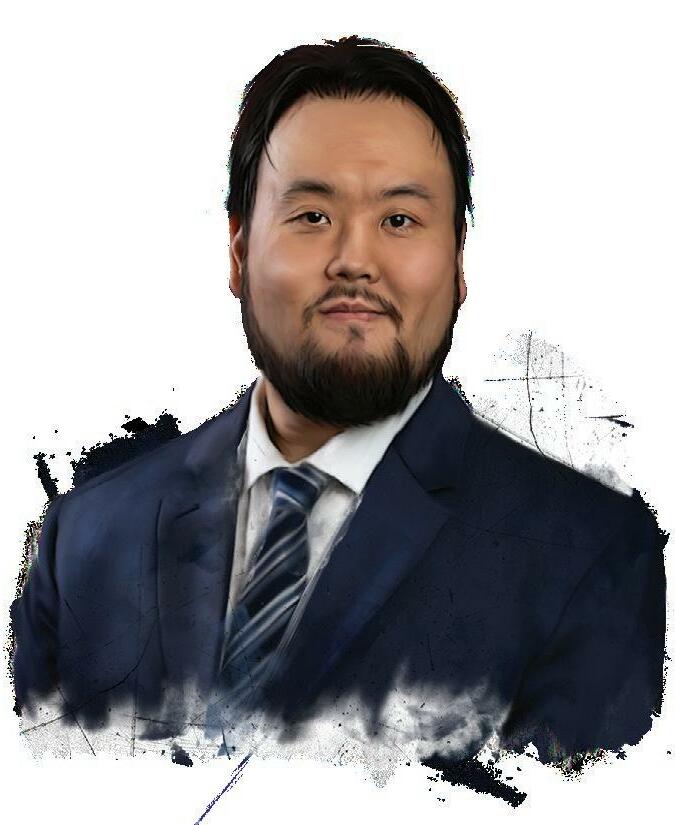
Assistant Professor of Law
B.S., University of California Berkeley M.S., University of California Los Angeles J.D., University of California Hastings LL.M., University of California Berkeley
PUBLICATIONS
A Comprehensive Comparative and Historical Analysis of 35 U.S.C. § 101 (forthcoming).
The Five Elements of Patent Law Practice (forthcoming).
Want My NFT: The Potential IP Protections Afforded by Non-Fungible Tokens (forthcoming)
An Abbreviated History of The Local Patent Rules (forthcoming).
Towards an Enhanced Framework for Markman Claim Construction” (2021).
A Tale of Seven Districts: Understanding the Past, Present, and Future of Patent Filings to Form Stronger Patent Venue Jurisprudence under 28 U.S.C. § 1404(a) (2021).
by Liam Proniewicz
Portrait Illustrations
Th
Sf
IN BRIEF OKLAHOMA CITY UNIVERSITY SCHOOL OF LAW 9
Michael P. O’Shea
Mo
Professor of Law
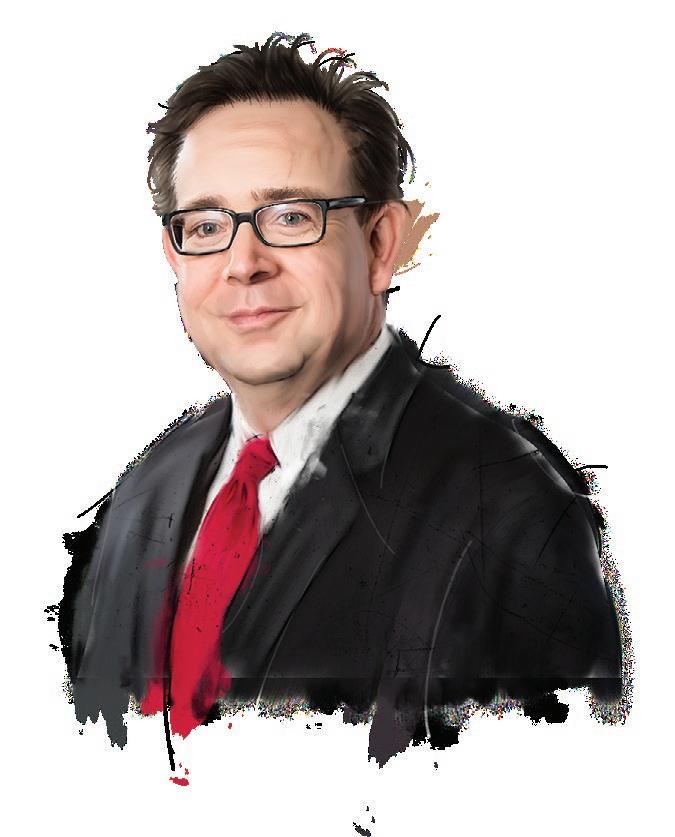
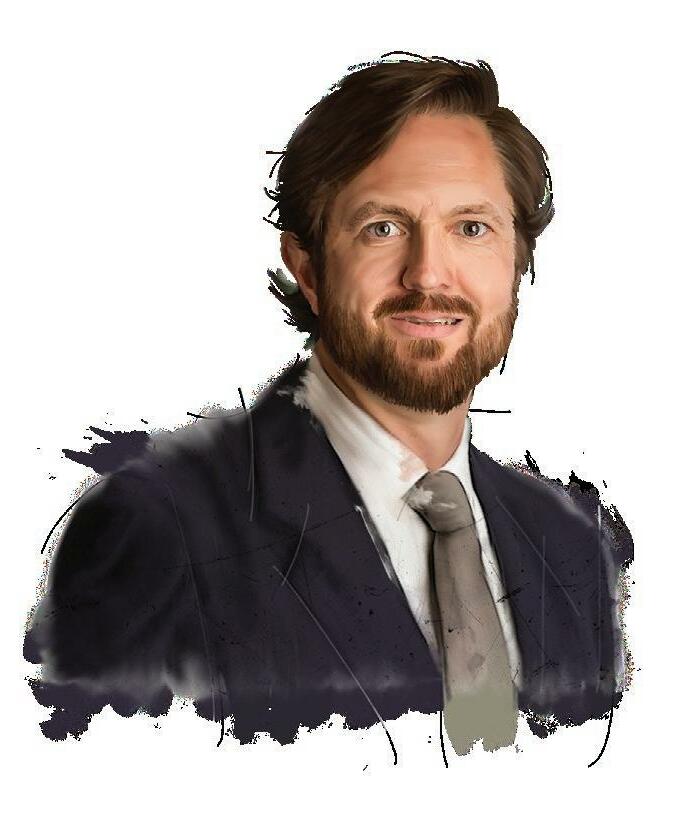
B.A., Harvard University M.A., University of Pittsburgh J.D., Harvard University
PUBLICATIONS
The Concrete Second Amendment: Traditionalist Interpretation and the Right to Keep and Bear Arms, 26 TEX. R. L. & POL. (2022).
Lee Peoples
Frederick Charles Hicks Professor of Law Associate Dean of Library and Technology
B.A., University of Oklahoma J.D., University of Oklahoma M.L.L.S., University of Oklahoma
PUBLICATIONS
Oklahoma Appellate Courts and Secondary Authority, 46 OKLAHOMA CITY UNIVERSITY LAW REVIEW 27-85 (2022).
Jennifer Prilliman
Law Library Professor Associate Dean of Administration and Distance Education
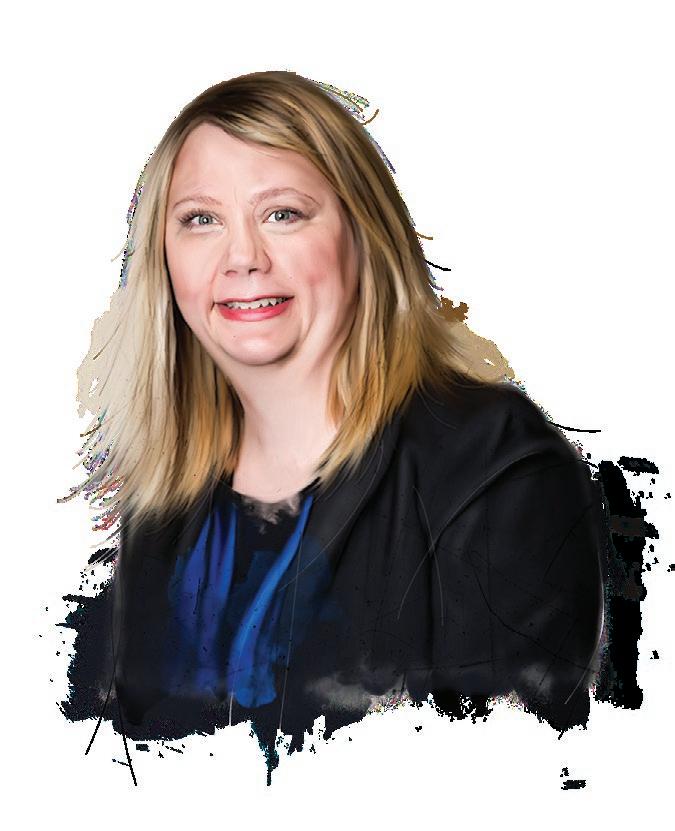
B.A., University of Central Oklahoma J.D., University of Oklahoma M.L.L.S., University of Oklahoma M.B.A., Oklahoma City University
OTHER
The Law School’s Dilemma: Preparing Students to Adapt to the Changes in the Practice of Law, Presented at MALLCO Paper Workshop, October 2017 (forthcoming).
LEGAL ACTION Lp
Jp
Carla Spivack
Oxford Research Professor of Law Director, Certificate Program in Estate Planning B.A., Princeton University J.D., New York University Ph.D., Boston College
PUBLICATIONS
The Happy Families of Tax Law, 100 N.C.L. REV. 601 (2022).
Are Women Human? Tampon Taxes and the Semiotics of Exclusion, 41 COLUM. J. GENDER & L. 190 (2021).
Phyllis Taite
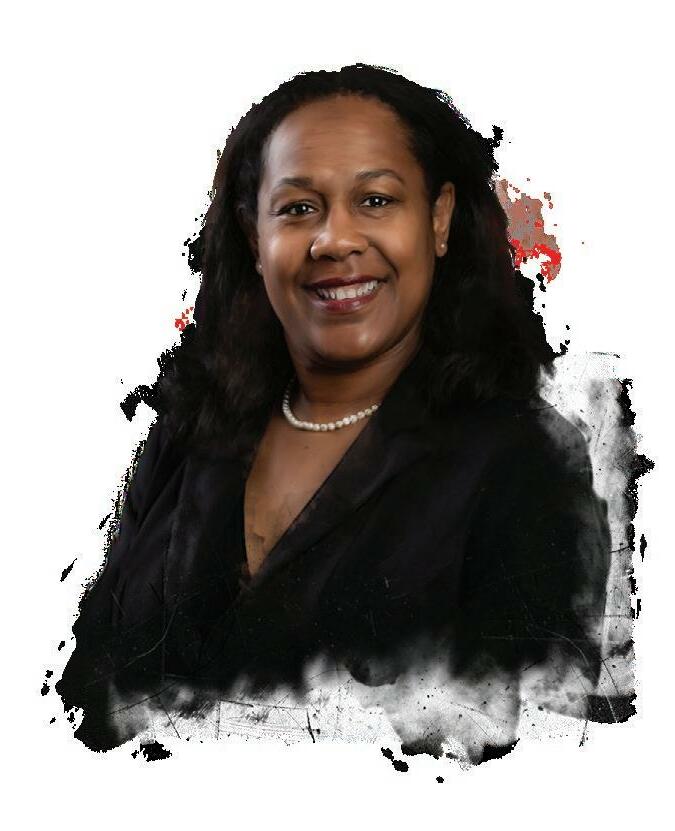
Professor of Law
B.S., Florida A&M University J.D., Florida State University LL.M., University of Florida
PUBLICATIONS
May the Odds Be Ever in Your Favor: How the Tax Cuts and Jobs Act Fortified the Great Wealth Divide 48 PEPP. L. REV. 1023 (2021).
Tax Code Bias and Its Starring Role in Perpetuating Inequalities, 72 S. C. L. REV. 735 (2021).
D.A. Jeremy Telman
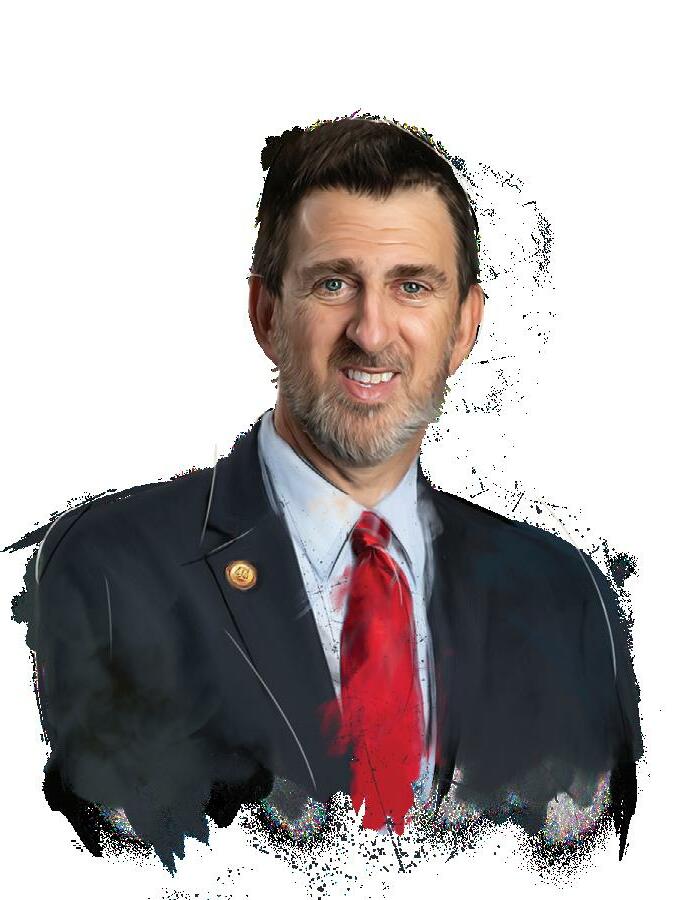
Associate Professor of Law
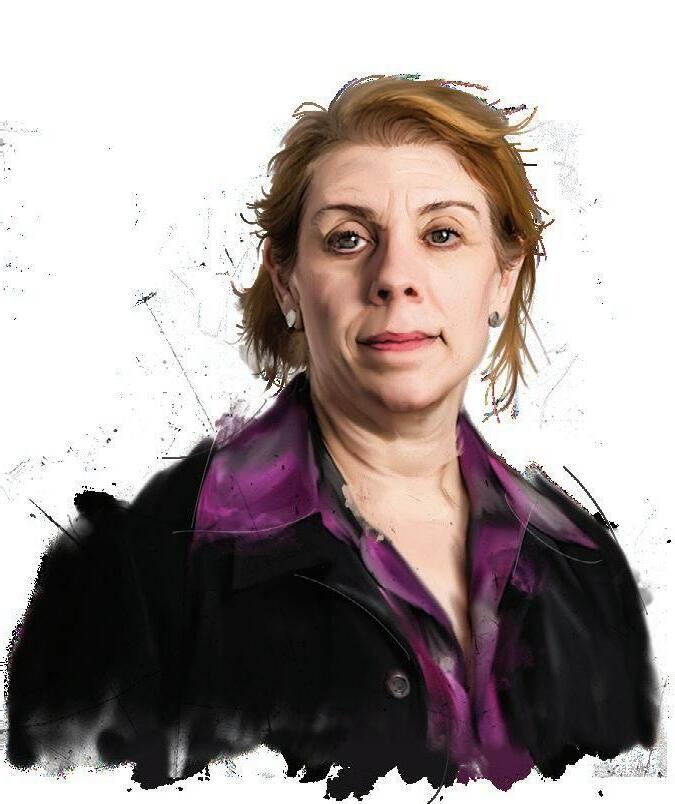
B.A., Columbia University M.A., Cornell University Ph.D., Cornell University J.D., New York University
PUBLICATIONS
Escape from the Führerprinzip: Restoring the Balance of Powers, forthcoming in 53 TOLEDO L. REV. (2022).
Cs
Jt
Pt
IN BRIEF OKLAHOMA CITY UNIVERSITY SCHOOL OF LAW 11
BY DAWN HARTH FREELANCE WRITER
PERSONAL BEST
DOING HIS FOR THE GREATER GOOD
“Discourage litigation. Persuade your neighbors to compromise whenever you can. As a peacemaker the lawyer has superior opportunity of being a good man. There will still be business enough.” – Abraham Lincoln
For Martin Valko, there is business enough. Perhaps what there is not enough of is time in the day. Valko, like so many immigration lawyers still working to set tle the dust kicked up by the Trump administration’s sharp and sudden shift in immigration policies, has no
shortage of people who need his help. But even after those four tumultuous and emotionally exhausting years, Valko has no less love for the branch of law he chose largely for its opportunity to be of service to others. It’s a 24-hour-a-day job, surrounded by con troversy and mired in political debate. It’s one for which “unsung hero” might be a more appropriate ti tle. But it’s also one driven by a cause that Valko knew even as a child he would make his own.
Valko grew up in Slovakia, the son of a diplomat. Be
 Profile on Martin Valko, Managing Director of the Dallas office of Chavez & Valko
Profile on Martin Valko, Managing Director of the Dallas office of Chavez & Valko
LEGAL ACTION 12 OKLAHOMA CITY UNIVERSITY SCHOOL OF LAW IN BRIEF
cause of their father’s job, Valko and his siblings spent their childhood living in many different coun tries, witnessing the vast disparity in the ways of life and opportunities available to people in different re gions of the world. Likewise, they witnessed their fa ther’s commitment to working tirelessly to negotiate peaceful relations, advocate for human rights, and in the words of Abraham Lincoln himself, find the opportunities to simply be a good man.
“It was really something I loved as a child. I saw my dad in this role … and that connec tion to being a public servant. I knew I wanted to follow in his footsteps,” Valko says. And while his path didn’t neces sarily lead him to the same job title as his father, it did lead him to a similar calling. Today Valko is both managing part ner at his immigration law firm in Dallas, and Honorary Con sul of Slovakia for the state of Texas, a position to which he was appointed by the gov ernment of Slovakia in May of 2010. Consular appointments must be confirmed by the re ceiving country, and specifi cally by the U.S. Department of State. According to Valko, “Honorary Consuls are an ex tension of the sending country’s Embassy by facili tating the protection of the rights and interests of its citizens. They engage in the strengthening of bilateral relations and cooperation in trade, economy, cultur al, and educational exchange. The rights, obligations, and immunities of Consuls (diplomats) and Honorary Consuls (non-diplomats) are governed by the Vienna Convention of Consular Relations.”
this drive that still burns bright in his and his father’s hearts. “My great grandfather came to the United States in 1906, when he was about 18, just seeking work, and spent close to 30 years working in the coal mines in Pennsylvania,” Valko says. “And when it was finally time to go back home and bring his family to the U.S., the war started, and he was never able to re turn to America. So he bought some cattle and a piece of land with the money he had saved, but it was eventually confis cated by the communist and socialist governments, and he lost everything. He told my grandfather on his deathbed to always put education first, because it could never be tak en away the way they took the things that he worked so hard for.” The lesson instilled: edu cation and immigration rights can change lives.
ABRAHAM LINCOLN
At the age of 17, Valko had the opportunity to apply for an international exchange pro gram between the U.S. and Slovakia. “It was pretty expen sive at the time, but I asked my parents if I could sign up and go through the process,” says Valko. “They said ‘okay, if you make it, we’ll see what we can do.’ So I flew to Prague for the interview and got selected as one of about 100 stu dents. It was a huge deal.”
He serves each position with pride, both for his home country and the generations-deep legacy handed to him by his father. “We always saw the determination and hard work he put forth,” Valko says. “Being a dip lomat, an ambassador, it was his life’s mission.”
Valko’s father retired several years ago after more than 30 years of service, but as with any career so deeply enmeshed in the business of caring for fellow human beings, the passion for it does not end when the daily duties of the position do. “He grew up in a small village on the border of Ukraine and Slovakia. He was born a few hundred yards from the border,” Valko explains. “And today, he still has a house in that same village and is currently offering it for refugees that are coming to Slovakia from Ukraine.”
It was Valko’s great grandfather who set into motion
This would make him the second person in his family to dare to venture into the unknown for the promise of better opportunity, his great grandfather’s words still resonating two generations later. “My parents never drove expensive cars, and we grew up with four kids in one bedroom with two bunk beds – because those things weren’t important to them,” Valko remembers. “What was important was an education. So when I had the chance to go to America and go to school, they said they would gladly make the sacrifice.” They paid for the exchange program and bought him a plane ticket. “As I was standing at the airport in Prague with my father,” Martin remembers, “he just said ‘promise me you won’t disappoint. That you’re going to do your very best.’”
Valko did, and he does, do his very best. He arrived in Austin, Texas, where he finished his last year of high school while living with his host family. He earned a scholarship to play tennis in college, and remained in Texas, eventually moving to Dallas upon graduation. It was there he met his now wife Martina, an accom plished professional swimmer. When they got mar
“Discourage litigation. Persuade your neighbors to compromise whenever you can.
As a peacemaker the lawyer has superior opportunity of being a good man. There will still be business enough.”
IN BRIEF OKLAHOMA CITY UNIVERSITY SCHOOL OF LAW 13
ried and began their life in Dallas, Valko was already attending law school – in Oklahoma City. “I would have my car packed on Thursday, finish my last class at about 9:30 that night and drive home to Dallas,” says Valko. “Then I would get up at 4:00 a.m. the next Tuesday morning and drive back to Oklahoma for my morning class.”
Why all the driving when there is no shortage of law schools in Texas? “When I was looking at law schools, I took a trip up to OCU and met the associate direc tor of admissions and just had a great visit,” Valko ex plains. “I loved the campus, and there was just some thing about Oklahoma City itself. It was a smaller school with a good professor-to-student ratio, and everything just felt right. It was a good fit,” says Valko, “Every professor had a genuine willingness to help, and they wanted you to succeed. OCU definitely pre pared me for my legal career, and I’m thankful for it.”
Today, Valko’s law firm has nearly 20 years of success behind it and employs nearly 50 people dedicated to fighting for immigration rights. He is also part of the development team behind the proprietary case management software platform Lawpilot, and ac companying app, Lawpilot Guardian. The system is changing the way immigrants and their families are able to communicate with their attorneys if they have been detained – using GPS to identify their location and enabling them to push a button that will record and upload a conversation to the cloud so the attor ney can listen immediately and evaluate the situation.

“It’s just a fantastic tool and makes a difference in the outcome of these cases,” explains Valko. “Even if your
phone gets confiscated, I know right where you were, who you were with, and what was said, so now I’m in a position to help you.”
Helping people. That’s where this all began for Valko and what will continue to be what gets him up in the morning – or the middle of the night if that’s what needs to happen. “You have to have your heart in it or you’re not going to make it as an immigration attor ney,” Valko says. “You have to be willing to be humble, to work hard, and have that fighter attitude. You’re holding someone’s life in your hands. There’s so much at stake. But when someone needs you, you drop ev erything and go. This job is about helping another hu man being.”
“Even if your phone gets confiscated, I know right where you were, who you were with, and what was said, so now I’m in a position to help you.”
MARTIN VALKO (about lawpilot app)
LEGAL ACTION
14 OKLAHOMA CITY UNIVERSITY SCHOOL OF LAW IN BRIEF
The BFF Friendship Bracelet NFT was "airdropped" for free to attendees of "BFF Minted", an educational launch event, which can be viewed at mybff.com/learn. BFF was started by 100+ leaders across industries and is an openaccess community with a mission to help women and non-binary people get educated, connected, and empowered in web3. Three smaller NFTs below, left to right: Club CPG x Prism, "Closer" by Rik Lee (one of the MADWORLD Collection), "Severance" by Zachary Winterton (one of The WInterton Collection). NFTs shown on this and the following two pages were collected by kickassidy.eth and are used with their permission. So, what exactly is an NFT? You may have been hear ing that term bandied about recently, as the populari ty of NFTs have undergone an explosion in contempo rary news and media coverage. In short, this trendy, tech-savvy TLA (or three letter acronym) stands for “non-fungible token”. Specifically, a non-divisible segment of a blockchain – essentially software code – that cannot be exchanged or traded (think driver’s license or an “authenticity certification” of some sort stating that you own a particular blockchain-piece). Each non-fungible token also corresponds to its own unique blockchain address as well, meaning that the ownership of a purchased NFT can be readily and eas ily ascertained. As a result, an NFT can be a digital file that takes the form of anything from an animated im age to a legal document like a patent or contract to a song, a movie, an event ticket or even a domain name.1

NFTS MORE THAN JUST A FAD

Although the concept of NFTs have been around since 2012 (when a paper authored by Meni Rosenfield in troduced the concept of “Colored Coins” for Bitcoin) or 2014 (when a digital artist named Kevin McCoy minted the first official NFT known as “Quantum” on the Namecoin blockchain)2 or even 2015 (when “Ter ra Nullius”, the first NFT on the Ethereum blockchain was minted in August and also when Etheria, the first NFT project was launched and shown in DEVCON 1 in London in October)3 or 2017 (when American studio Larva Labs first developed its “CryptoPunks” series)4 – all depending on who you ask – the real “watershed moment” that brought NFTs into the mainstream was the $69 Million sale of Digital Artist Beeple’s “Every days – The First 5,000 Days” at a Christie’s auction.5
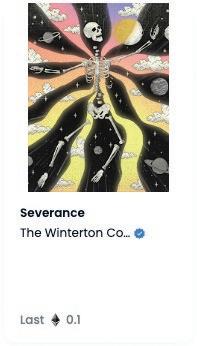
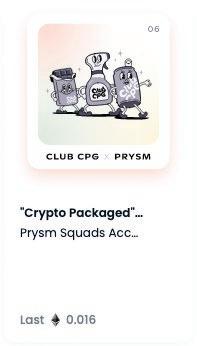
Ever since that milestone, NFTs have rocketed into the modern pop-culture consciousness at a break neck pace, manifesting themselves in everything from Saturday Night Live music videos,6 to news regard ing celebrities purchasing ludicrously priced “Bored Apes,” 7 to a 420x surge at the U.S. Patent & Trade mark Office in trademark filings related to NFTs,8 to various popular NFT games such as “CryptoKitties” and “Axie Infinity” allowing users to profit with “play to earn” business models,9 to movie merchandising and NFT “tie-ins.”10 Eventually, platforms like Open Sea and Coinbase thrived by allowing users to auction and purchase NFTs via cryptocurrency wallet trans
BY TIMOTHY T. HSIEH ASSISTANT PROFESSOR of LAW
actions – essentially only allowing this “collector cul ture” to form around an artifact that intersects with industries as diverse as sports and entertainment with technology and art.
In an interview with Keanu Reeves during the release of The Matrix Resurrections, he is asked by a reporter from The Verge to opine on the recent NFT phenome non. He doesn’t seem to understand what the commo tion is all about, ending his comments with the remark that “they are completely reproducible” before erupt ing into a gleeful cackle.11 Reeves’ observation sums up the primary quandary involving intellectual prop erty (“IP”) and NFTs: the fact that you do not own any of the IP of the NFTs you purchase, although many (of the legally un-initiated) think that they do. Essential ly, as astutely pointed out by Scott Alan Burroughs,
IN BRIEF OKLAHOMA CITY UNIVERSITY SCHOOL OF LAW 15
you do not obtain the underlying IP of an NFT pur chase “due to two fundamental tenets of copyright law”: “first…the purchase or obtainment of an object –physical or digital – does not give the buyer any copy rights [or other IP] in that object” and “second…that ownership of a copyright [and some other forms of IP are] only transferred when an author signs a written contract that says so.”12 Burroughs goes on to provide an excellent analogy to understanding NFTs and the unique relationship they have to their underlying IP: “It helps to think of NFTs as digital baseball cards, those QFTs (quasi-fungible tokens) whose value for the most part peaked in the 1990s. While your 1989 Upper Deck Ken Griffey Jr. rookie card was not oneof-a-kind, it was (in theory) available only in limited quantities and thus valuable. And while owning the card had its benefits, the holder had no right to make copies of it or stop others from using the photograph on the card. The same is true with an NFT. If I sold you an NFT associated with a drawing I made of Griffey, you would certainly be in a position to mock my inabil ity to accurately render facial proportions, but you would not be in a position to do anything with that drawing other than hold it or trade it.”13



This fundamental lack of understanding that un derlying IP rights are not transferred during an NFT transaction has led to recent fiascos such as the (pre dominantly IP) lawsuit involving Quentin Tarantino’s attempted sale of NFTs involving his films Reservoir
Dogs and Pulp Fiction,14 and how “Crypto Bro” pur chasers of a Dune book NFT thought that they were able to produce a Dune animated series as a result of the NFT acquisition.15 As Harvard Law Professor Rebecca Tushnet points out, “the [NFT] purchas er acquires whatever the art world thinks they have acquired [because] [t]hey definitely do not own the copyright to the underlying work unless it is explicitly transferred [and] [a]ny licensing would have to hap pen separately.”16

To illustrate this conflict between IP laws and the lack of laws involving NFTs, take for example an NFT ini tiative currently known as “Meta Ghouls” from Jose Scott and Tony Romero, certainly a cause for cele bration in being Oklahoma’s first and so far only NFT collective.17 However, upon a simple Google search of that term, one is immediately brought to a competing NFT collection with the same name that also looks dif ferent and has no official affiliation with the Oklaho man version – and the issue is that neither party can bring any action against the other due to the belief that usage of a brand in the NFT space can replace ac tual trademark registration.











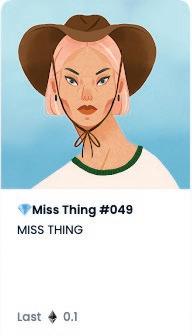


One potential solution that I propose in a pa per-in-progress is to integrate other self-executing blockchain technology such as smart contracts when ever an NFT transaction occurs where IP is relevant. For example, there is an initiative to treat a form of IP



LEGAL ACTION
NFTs shown on this spread were collected by kickassidy.eth and are used with their permission.
– specifically patents – as NFTs by encoding data such as licensing and litigation history, assignment histo ry, patent prosecution history and other information that updates in real-time whenever infringement or negotiation occurs via a smart contract.18 Thus, for transactions where IP rights are important, similar smart contract technology can be employed in order to automatically encode IP rights, to satisfy at least the second fundamental tenet of copyright law de scribed above.
The law of NFTs is currently in a state of constant flux

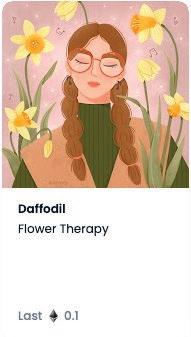



as well as evolution, with the first official criminal mat ter involving NFTs (as well as money laundering and wire fraud) reported by the Department of Justice in March.19 With The Wall Street Journal recently re porting in May of 2022 that “the NFT market is col lapsing,”20 it may be the right time to slow down and properly analyze this burgeoning market for what it is, in order to fashion laws and policy to properly reg ulate this constantly and rapidly changing space –something proven now to be certainly more than just a fad.
1 Investopedia, NFT, investopedia.com/non-fungible-tokens-nft-5115211 2 Altpress.com, Nov. 30, 2021, Where do NFTs actually come from? A short history of non-fungible tokens, altpress.com/meta/history-of-nfts-non-funfible-tokens 3 One37pm.com, The Definitive Timeline of Early NFTs on Ethereum, one37pm.com/nft/the-definitivetimeline-of-early-nfts-on-ethereum; Wikipedia.com, Non-fungible_token, Early history (2014-2017), en.wikipedia.org/wiki/Non-fungible_token. 4 Alex Nelson, National World, Feb. 25, 2022, NFT meaning: crypto art tech explained, what is a non-fungible token, where to buy them – and best marketplace, nationalworld.com/lifestyle/ money/nft-meaning-crypto-art-tech-explained-what-is-a-non-fungible-token-where-to-buy-them-and-best-marketplace-3163733 (“Their history dates back to 2017, when American studio Larva Labs developed CryptoPunks, a series of collectable digital characters traded through NFTs, which serve as a good starting point in getting your head around the technology. There are 10,000 unique CryptoPunks to collect. But being digital commodities, the ability to make copies which could be traded freely – thus reducing their value – is easy.”).

5 Jacob Kastrenakes, Beeple sold an NFT for $69 million, theverge.com/2021/3/11/22325054/beeple-christies-nft-sale-costeverydays-69-million 6 Jazmin Goodwin, Still not sure what NFTs are? 'SNL' explains with Eminem parody, cnn.com/2021/03/28/media/nfts-snl-saturday-night-live/index.



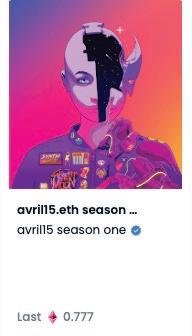
html 7 Kate Knibbs, Wired, Feb. 8, 2022, How Did the Bored Ape Yacht Club Get So Popular?, wired.com/story/celebrity-nfts
8 Lachlan Keller, US NFT trademarks increase by 420-fold in 2021: report, yahoo.com/video/us-nft-trademarks-increase-420-013254677.html (part of a mad rush to trademark anything related to the Metaverse, Web 3.0 or NFTs – especially during the pandemic). 9 Msz991, Axie Infinity and Crypto Kitties: What is the Future for NFT Games, techdee.com/axie-infinity-and-crypto-kitties 10 Chris Lindahl, If Snoop Dogg, Reese Witherspoon, and McDonald’s Can Do NFTs, So Will You, indiewire.com/2022/02/nfts-in-film-tv-what-they-are-1234696393 11 Dani Di Placido, Keanu Reeves Thinks NFTs Are A Joke, https://www.forbes.com/sites/danidiplacido/2021/12/11/keanu-reeves-thinks-nfts-are-a-joke 12 Scott Alan Burroughs, abovethelaw-com.cdn.ampproject.org/c/s/abovethelaw.com/2022/02/nfts-and-copyright-what-you-see-is-not-what-you-get/?amp=1 13 Id. 14 Kal Raustiala & Chris Sprigman, Guest Column: Tarantino vs. Miramax — Behind the NFT ‘Pulp Fiction’ Case, and Who Holds the Advantage, hollywoodreporter.com/business/digital/tarantinomiramax-pulp-fiction-nft-1235052378 15 Adrienne Westenfeld, Wired, The Crypto Bros Who Thought They Bought the Dune Rights Feel Misunderstood, esquire.com/ entertainment/books/a38815538/dune-crypto-nft-sale-mistake-explained 16 Courtney Majocha, Memes for Sale? Making sense of NFTs, today.law.harvard.edu/memesfor-sale-making-sense-of-nfts 17 Meta Ghouls, metaghouls.io 18 nature.com/articles/s41598-022-05920-6; IBM, IPwe and IBM Seek to Transform Corporate Patents With Next Generation NFTs Using IBM Blockchain, newsroom.ibm.com/2021-04-20-IPwe-and-IBM-Seek-to-Transform-Corporate-Patents-With-Next-Generation-NFTs-UsingIBM-Blockchain 19 U.S. Department of Justice, Two Defendants Charged In Non-Fungible Token (“NFT”) Fraud And Money Laundering Scheme, justice.gov/usao-sdny/ pr/two-defendants-charged-non-fungible-token-nft-fraud-and-money-laundering-scheme-0 20 Wall Street Journal, NFT Sales are Flatlining, wsj.com/articles/nft-salesare-flatlining-11651552616











BUILDING BACK BETTER TAX REFORM
BY PHYLLIS C. TAITE PROFESSOR of LAW
President Joe Biden promises to rebuild the middle class through the Build Back Better (“BBB”) frame work. The BBB plan takes a comprehensive approach to rebuilding the middle class which includes new tax policy. As a tax scholar, I have written numerous ar ticles and scholarly publications about inequalities in tax policy. For this piece, I focus on tax reform that President Biden should prioritize in the administra tion’s plans.
For too long the wealthiest households have benefited from tax preferences justified by trickle-down theory. History has demonstrated the trickle-down theory has not worked, and this is further evidenced by sig nificant wealth disparities that have worsened over time. According to the National Bureau of Economic Research, the net worth of the top 5% increased and the bottom 90% decreased during the past three de cades. Further, the richest 1% own more than half the
LEGAL ACTION
AN OPINION PIECE 18 OKLAHOMA CITY UNIVERSITY SCHOOL OF LAW IN BRIEF
... the richest 1% own more than half the stock owned in America, a significant source of wealth and beneficiary of tax preferences.
herent income tax gain is eliminated when a new ba sis is assigned under stepped-up provisions. This is yet another tax preference which eliminates the tax altogether. Because the richest 1% owns more than half the capital gains property and are most likely to transfer such properties through estates, the gov ernment should not subsidize these taxpayers. Con sequently, in addition to taxing capital gains property at ordinary rates, the stepped-up provision should be eliminated to disincentivize holding the property un til death.
Further, I propose a 0% tax rate on household incomes of $25,000 (or $50,000 when married filing jointly) and taxing capital gains at ordinary rates. Instead of sub sidizing the wealthy, tax policy should shift to a more progressive model both marginally and effectively.
By shifting tax preferences to earned income, it will relieve the tax burden for the most vulnerable house holds and reinstate the burden on the wealthiest.
stock owned in Ameri ca, a significant source of wealth and beneficiary of tax preferences. I propose three changes that facilitate building wealth for middle- and lower-income households and help reduce wealth disparities.
First, I propose shifting the burden to higher income taxpayers to provide tax relief to low- and middle-in come families by eliminating certain capital gains preferences and increasing the 0% tax rate. Specif ically, capital gains property should be taxed at or dinary rates. The tax rate is only one preference af forded capital gains property. One of the primary justifications for preferential rates was to mitigate the effect of the inherent gain built into capital gains property held for long periods of time. Ironically, the tax system incentivizes the taxpayer to hold capital gains property for long periods of time and rewards them for doing so.
For example, capital gains taxes are deferred until a realization event. Generally, a realization event oc curs when the taxpayer sells or disposes of the prop erty. This gives the taxpayer the power to decide when a taxable event occurs. As such, a deferral is a tax preference. If the property appreciates and the taxpayer sells it, the taxpayer is rewarded with pref erential rates, an additional tax preference. Finally, if the taxpayer retains the property until death, the in
Second, I propose a phaseout for the mortgage inter est deduction. I prioritize this deduction because the primary beneficiaries are higher income taxpayers. The student loan phase out starts at $70,000 modi fied adjusted gross income (“AGI”) and the phase-out ends at $85,000 for single taxpayers and starts at $145,000 and completely phases out at $175,000 for married taxpayers. The mortgage interest deduction should have the same phase outs as student loans. The justifications for treating these deductions so dif ferently are irrational. Education and homeownership incentives are both part of the wealth building pro cess, yet homeownership is treated more favorably in tax policy.
Finally, I propose the personal exemptions be rein stated to add progressivity to tax policy. The stan dard deduction has the unique position of providing tax relief to lower income taxpayers. Personal exemp tions provided additional tax relief because taxpayers were allowed an exemption for each member of the household. Therefore, the standard deduction and personal exemptions worked together to provide tax relief to lower income taxpayers. After the Tax Cuts and Jobs Act (“TCJA”), implemented in the Trump administration, the standard deduction amount in creased and personal exemptions were eliminated. Taxpayers with more than two children suffered a tax increase with the loss of personal exemptions. Conse quently, the people most impacted by the personal ex emption elimination have been people who are most vulnerable.
The American tax system is deceptively regressive. I hope the Biden administration is serious about mak ing tax policy changes to shift the burden back to the taxpayers who have benefited the most from tax poli cy. While there are a number of ways to address wealth disparities, I believe the proposals in this article will provide immediate relief for most taxpayers.
GET POLITICAL WHY LAWYERS SHOULD
 BY REPRESENTATIVE COLLIN WALKE '08 OKLAHOMA HOUSE of REPRESENTATIVES
BY REPRESENTATIVE COLLIN WALKE '08 OKLAHOMA HOUSE of REPRESENTATIVES
“Get off my porch! We don’t need any more lawyers out there,” bellowed a rather agitated constituent when I asked for his vote during my first campaign for the Oklahoma House of Representatives in 2014. I was disheartened to hear this kind of rhetoric be cause out of the 149 members of the House and Sen ate, there were less than a dozen lawyers; and that number has only continued to decline. I don’t quite know how the anti-lawyer/politician movement be gan, but I’m guessing that it partly has to do with the fact that we make our living by writing and talking; two things that most Americans can do. And so, the reasoning goes: Anyone who can read is able to inter pret, and anyone who can interpret is fit to do so. Af ter all, we live in a democracy where the people gov ern. (If you doubt this logic, simply look at all of the social media “experts.”)
Recently, I had the opportunity to engage in a thought ful dialogue with a member across the aisle about this exact issue. In spite of not having a legal background, he had been writing missives against judges and their rulings because they conflicted with what he believed was the correct decision. He even criticized a wellknown conservative judge.
I felt this legislator didn’t fully appreciate the jurists’ positions and was overly harsh in his treatment of them. I also knew that he was a sincere and intelligent person who simply had not been exposed to the same type of education – a legal education – that I had; and, therefore, not surprisingly, had a different perspec tive. So, I bought him two books: one on originalism and the other being John Rawls’ “A Theory of Justice.” This little exchange allowed us to develop a rapport
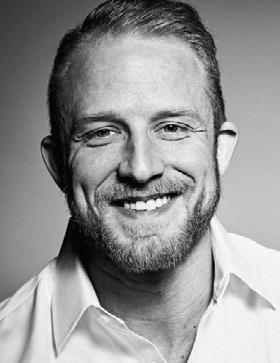
LEGAL ACTION
20 OKLAHOMA CITY UNIVERSITY SCHOOL OF LAW IN BRIEF
and also helped him to see the value in having an inter pretive framework other than simply words on a page. This perspective – that there’s more to the law than mere words – is something that many people who are not attorneys do not appreciate. They believe that the law is like a traditional math equation where there is one correct answer; but legal training teaches us that this is rarely the case and that interpretation is more like the uncertainty principle in quantum mechanics: We can approximate an answer, but may never get it exactly right. It takes logic, discernment, and skepti cism to think critically about legal issues because of the nuances and consequences involved. That is why it is important to have more attorneys in public office. The rise of the web in the 21st century has created new and increasingly complex problems within the law. From attempted reconciliations with antiquated legal concepts about commerce to addressing liabil ity for malware like Pegasus 2, there is an enormous amount of work to do. The people best trained to do that work are lawyers, because we have an under standing and perspective that utilizes concepts like jurisdiction, due process, and authority in evaluating whatever substantive legislation is being enacted. In other words, attorneys have a broader view that takes into account an entire system (i.e., the legal system) when discussing legislation.
Understandably, attorneys are reluctant to throw their hats into the political arena because of the cost. For example, in Oklahoma our legislative session runs

from February through May. That is four months out of the year where your billable hours will drop signifi cantly. Moreover, having a title by your name will not necessarily get you more clients (contrary to popular belief). And so, many lawyers are unwilling or unable to trade their income for public service. This is not an unreasonable position to take.
Indeed, I do not want to sound as though we all have the ability or even desire to run for office. But, what we do have is the ability to do more than bill hours. We all have the ability to find our corner of the world and make it a little better. This might come in the form of talking up a candidate to friends or sending in even a $10.00 donation. You might knock doors for a candi date – it’s exercise and statistically the most effective method of campaigning. Or maybe you could write hand-addressed envelopes for a candidate.
My point is that just like there is a role for each of us in the legal system, there is a role for each of us in the political system. We should not be reluctant to find that role and use our voice and training in service of improving our community, because if we don’t, some one else will. No doubt, other perspectives and profes sions are important to have at the table, but, as one of my Republican friends says, “Lawyers have a Ph.D. in the Constitution.” It would be a shame to have that level of credentialing and only put it to use for our selves. We’re needed in more places than simply the courtroom or boardroom. I suppose the only question is: Will we answer the call?
We all have the ability to find our corner of the world and make it a little better.
Photo by Marc Tran
SOCIAL MEDIA,
QUINLAN & FIRST AMENDMENT
Modern American political discourse is filled with po larization, distrust, and hatred. And for many, the pri mary culprit for this state of affairs is modern social media. Critics stress that social media companies allow false statements — and sometimes fake photos or vid eos — to go “viral.” They host hate speech and conspir acy theories, and drive users toward “echo chambers” where people encounter only views similar to their own. They censor views out of step with certain political or thodoxies. Instead of thoughtful argument, social me dia can encourage insult trading.
Not surprisingly, if social media companies are under stood to be the source of such ills, their transforma tion is often presented as a cure: If the current state of social media poisons American discourse, perhaps a re-envisioned and re-engineered form of social media can energize and restore it. But according to this year’s Quinlan Lecture by Professor Ashutosh Bhagwat, some of the most familiar calls for transforming social media face a significant barrier: They are at odds with both the doctrine and spirit of modern First Amendment free speech law. They also unrealistically demand that social media companies be something they likely can not be. His full arguments to this effect can be found in a July 2021 article in The Journal of Free Speech Law, “Do Platforms Have Editorial Rights?” and in another forthcoming work that will set forth the arguments he made in the Quinlan Lecture itself. (Another 2021 arti cle of his, “The Law of Facebook,” in UC Davis Law Re view is also relevant to these discussions).
It is helpful to briefly summarize the calls for change to which Professor Bhagwat is responding.
In a sense, both the right and left are trying to save the modern “marketplace of ideas” from aspects of social media they believe are tainting it. On the right, many critics of social media claim the key problem is polit ical bias and enforced orthodoxy of opinion: Social media companies, such as Facebook, they say, censor and suppress conservative views (and sometimes de platform conservative speakers). Critics suggest the solution is to insist social media companies provide
BY MARC J. BLITZ ALAN JOSEPH BENNET T PROFESSOR of LAW

the same viewpoint- and content-neutrality that the First Amendment often demands from the govern ment. Government cannot silence speakers because it doesn’t like their politics. Nor can it exclude certain views from public streets or parks. The same, some ar gue, should be true of the social media sites that con stitute the modern sites for political and cultural dis course. Justice Thomas suggested one means of such a legal transformation in an opinion in Biden v. Knight First Amendment Institute at Columbia University: “There is a fair argument,” he wrote, “that some digital platforms are sufficiently akin to common carriers or places of accommodation to be regulated in this man ner.” Biden v. Knight First Amend. Inst. At Columbia Univ., 141 S. Ct. 1220, 1224, 209 L. Ed. 2d 519 (2021).
For the left, the key problem is disinformation and con spiracy theories: Social media companies, these critics say, provide a platform for patently false claims to gain a following, and sometimes cause severe harm in the world outside of the internet. Justice Oliver Wendell Holmes, Jr. wrote in a famous 1919 dissent, in Abrams v. United States, that “the best test of truth is the power of the thought to get itself accepted in the competition of the market.” 250 U.S. 616, 630 (1919) (Holmes, J., dis senting). But critics of social media say something has gone wrong in the marketplace of ideas when disinfor mation campaigns and social media algorithms leave many internet users unable to trust anything they read online.
In some ways this summary is a simplification – there are more than two critiques and different writers on the right, left, or center have different views on these issues. But the account just given highlights two mod els that critics are presenting for what social media companies should be (and perhaps, should be forced to be): (1) a neutral unbiased platform that must remain open to speakers of all views or (2) a monitor that vets expression and filters out, or places a warning on, dis information.
Professor Bhagwat argues that both these models are a poor fit for what social media companies are, and in
LEGAL ACTION
Social media artwork by The Laundry Room
tension with (if not outright at odds with) the law and logic of the First Amendment. First, he argues, social media companies like Twitter, Instagram, Facebook, or YouTube (as well as smaller alternatives) cannot be compelled to let any and all speech content on their platform. Like newspapers, magazines, and TV net works (such as MSNBC or Fox), social media compa nies are editors: They do not merely provide a conduit over which speech flows without their interference (as do phone companies, such as AT&T or Verizon). Rath er, they make decisions about what speech to host, and how to present it to their audiences. And even when newspaper editors, for example, provide a place (in the newspaper’s opinion section) for others’ speech the newspaper chooses to feature – rather than for the editors’ own speech – the First Amendment pro tects those editorial rights to run speech they prefer to feature, and to exclude speech they don’t. The Su preme Court made this clear in Miami Herald Pub. Co. v. Tornillo, a 1974 case where it found that a Florida law requiring newspapers to print replies from political candidates criticized in an editorial violated the news paper’s right to determine for itself what voices to fea ture in its pages. 418 U.S. 241, 258 (1974)
Facebook, Instagram, YouTube, and Twitter are in cer tain ways quite different from a TV network or news paper in that the expression one finds on these sites typically comes not from a journalist or talk show host employed by the media entity itself (like Fox News’s Sean Hannity or MSNBC’s Rachel Maddow), but rath er from users of these social media sites. But this does not mean that social media companies refrain from all exercise of editorial rights. On the contrary, most social media sites are “intentionally designed to pro vide a specific experience to users,” and to this end, they make “constant, value-based choices about what third-party content to permit on their platforms.” Do Platforms Have Editorial Rights?, 1 J. Free Speech L. 97, 111 (2021). Some of these may be ideological. Oth ers concern content selection of a different kind. Face book, as he notes, has “deliberately adjusted its algo rithms to deemphasize political content in favor of content linked to personalized groups.” Id. at 112. Some of this content selection is done with comput er algorithms rather than by human review. But that doesn’t disqualify it from the protection the First Amendment offers to editors. First Amendment law assumes that “[p]ublic discourse is enhanced when publishers are able to present coherent, consistent products with consistent messages,” id. at 113 – for ex ample, when certain readers can read a conservative publication, like The National Review, or a progressive publication, like The Nation, instead of being forced into an informational universe where all magazines are
required to be a purely non-ideological collection of reports and arguments from all sides. Similarly, First Amendment law allows different social media sites to present their users with an experience distinctive to that social media site.

It might seem as though this argument for social media companies’ editorial rights leaves space for the other proposed transformation considered above: If social media companies have a First Amendment right to be editors, perhaps they can be pressured or even re quired to edit out misinformation? But one could argue that this proposal too is problematic, for a number of reasons. First, some of its adherents seem to want so cial media to be for the twenty-first century what news journalists with a reputation for objectivity (such as CBS news anchor, Walter Cronkite) were for the twen tieth. But social media is ill-suited to play that “gate keeping” role: Their users don’t seek them out or use them for that purpose, so they have little economic in centive to play that role. The technology industry pro fessionals and software experts who run and operate social media companies are not trained in the norms and practices of journalism. Mandated gatekeeping of information is not only a task ill-suited for social media companies, but it is also at odds with First Amendment values. There are different accounts of what these val ues are – with Justice Holmes, for example, emphasiz ing the need for a marketplace of ideas in which indi viduals can discern what is true, and Justice Brandeis, by contrast, emphasizing the importance of vibrant democratic debate. But in neither of these accounts is it consistent with First Amendment ideals from gov ernment to wrest away from members of the public the responsibility for debating, and evaluating different views for themselves.
How then can we respond to the very real problems we see in modern discourse, many of which are exacerbat ed if not created by social media? How, for example, can we respond to extreme political polarization, con fusion about what sources of news to trust, or debates that degenerate into angry shouting matches? While there probably aren’t simple answers to these prob lems, one point made during the discussions surround ing the Quinlan Lecture is that we’d do well to look be yond social media companies – and think about what other features in American life, like the health of civic associations and of spaces for having dialogue across ideological differences, might be bolstered, reinvigo rated, or reimagined and another recent work by Pro fessor Bhagwat — his exploration of First Amendment law, theory, and history in his 2020 book, Our Demo cratic First Amendment — provides a rich resource for thinking about these issues.
Ketanji Brown Jackson: Associate Justice of the Supreme Court of the United States

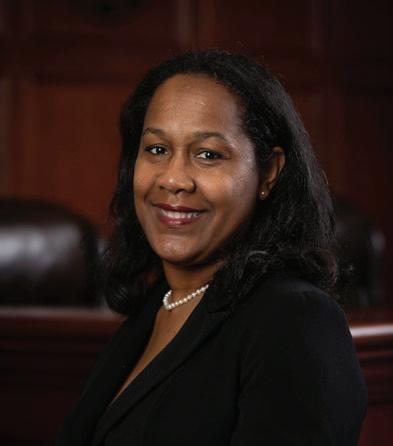
Lawyers at Oklahoma City University School of Law share their personal and professional reflections on the historic confirmation of Judge Ketanji Brown Jackson to the U.S. Supreme Court:
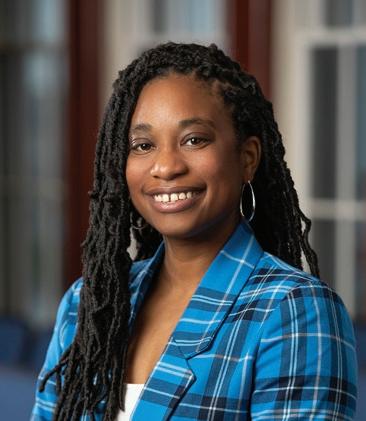
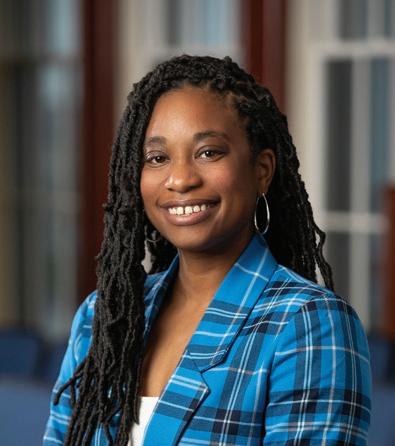
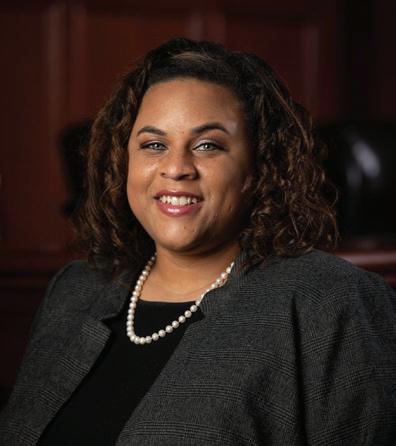
I look forward to seeing associate justice-designate Judge Ketanji Brown Jackson serve on the Supreme Court. She will bring a wealth of knowledge and professional diversity that is vital to institutional legitimacy as corporate lawyers and prosecutors are overrepresented on the court. Moreover, she is in a position to fill the unique voice we lost when Justice Thurgood Marshall retired. Justice Sandra Day O’Connor described Justice Marshall’s role as the ‘ear of a counselor’ and someone ‘who understood the vulnerabilities of the accused and established safeguards for their protection.’ She has demonstrated she is brave, knowledgeable, and willing to seek justice even when it is hard. I expect nothing but greatness from her.
I know that her appointment will inspire black women and girls for generations to come and I am grateful for the representation that Justice Brown Jackson’s nomination and confirmation brings. But I am also aware that many disparities and gaps remain for the overwhelming majority of black, female jurists, lawyers, and law students. In the midst of these realities, I am hopeful that this milestone will lead to more of us not only being seen in these spaces, but also being sought after, valued, and embraced in these spaces.
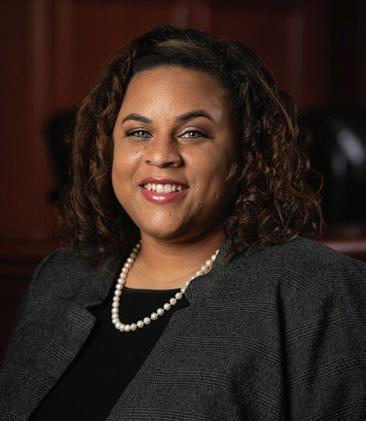
When our first African American Female Vice President announced to the world, ‘This nomination is confirmed’ speaking of our first African American Female Supreme Court Justice I sat in awe. To be able to point to a woman on the country’s highest court that looks like me means the world. Not only for me, but for all the lawyers to come. Justice Brown Jackson has become a mentor to us all. The way she handled her confirmation hearings, her analysis of the law and her accomplishments give us all something to aim towards. I look forward to seeing her impact on the court and in the legal community
Phyllis C. Taite Professor of Law
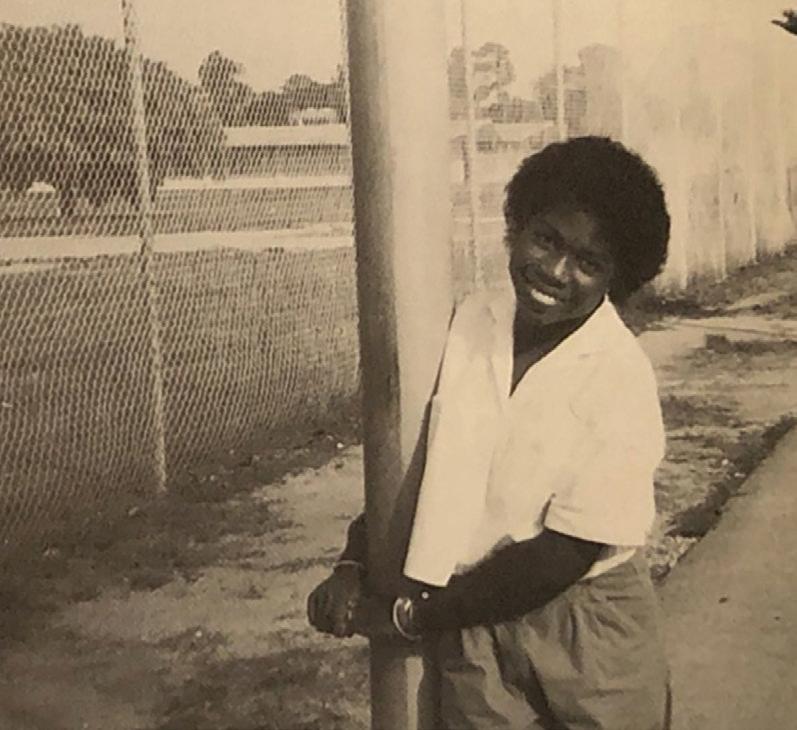

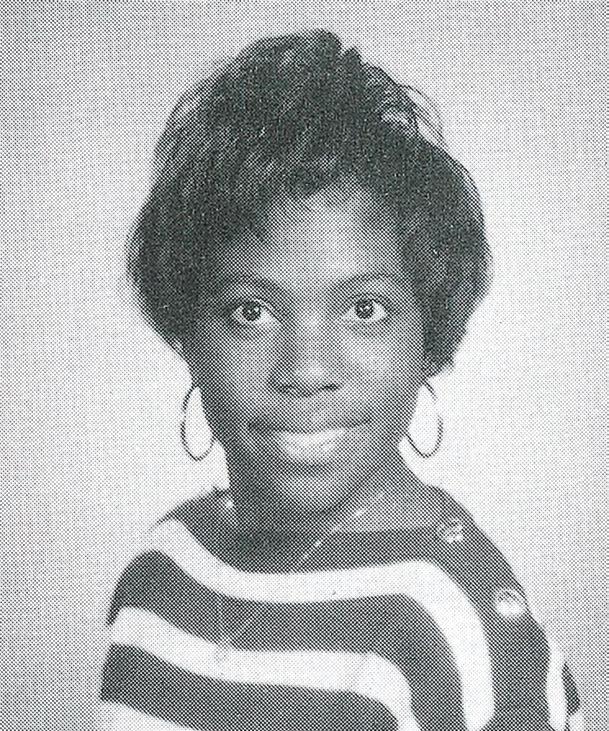
Bianca Bryant
Director of Career Development and Student Programming
Michelle D. Gunter
 Assistant Dean for Admissions
Assistant Dean for Admissions
LEGAL ACTION
Alana Haynes House
I felt equal parts of joy, amazement, thankfulness, excitement, smugness, anger, sadness, confusion, resentment, and most of all HOPE. I am truly amazed that in 2022, people of my race and/or my gender are still experiencing ‘firsts’. As a Black woman I am a minority, in not only the legal field but the librarianship field, with very limited examples of breaking through the glass ceiling. It is just as important to show our little girls that these heights are possible, as it is to show grown women that these heights are indeed possible.
Ketanji Brown Jackson’s confirmation felt very similar to the way many brown and black people experience the world — profound joy juxtaposed by mildly concealed hatefulness. While so many people around the world rejoiced at Brown Jackson’s confirmation and all that she represented, we were reminded (especially during the confirmation hearings) of the minority of people who did not share in that joy. But we were also reminded of the importance of focusing on joy. We were reminded by the smile on the daughter of Brown Jackson’s face as she watched her mother proudly. We were reminded by Senator Cory Booker’s excitement as a witness to history. I hope we are always reminded, no matter how much hatefulness surrounds us, to focus on joy. To relish in it. We deserve joy – and I hope we never forget that.
The intersection of the law and Black and Brown bodies is often the basis of historic legal decisions. The confirmation of Ketanji Brown Jackson changes the way that we can imagine this landscape. My hope is that her presence, legal experience, brilliance, and perspective will impact the ways that our sitting Justices and Americans discuss difference, equity, and justice. The confirmation hearing was a reminder that progress is hard won and easily lost. The struggle continues but for today and each day leading to Judge Brown Jackson’s swearing in I will claim victory and joy
In the 233 years of Court history, Justice Ketanji Brown Jackson is the 116th Justice to be appointed to the Court and the first African American woman. Her work as a Public Defender brings a unique element to the bench. As a former Public Defender, I am encouraged that she brings the experience necessary to navigate the criminal justice system on behalf of indigent defendants. All we ask of our Justices is for them to do the work necessary to protect the rule of law and promote justice. No one, when pressed really hard, can honestly say that the judicial history of Justice Ketanji Brown Jackson does not reflect that intention.
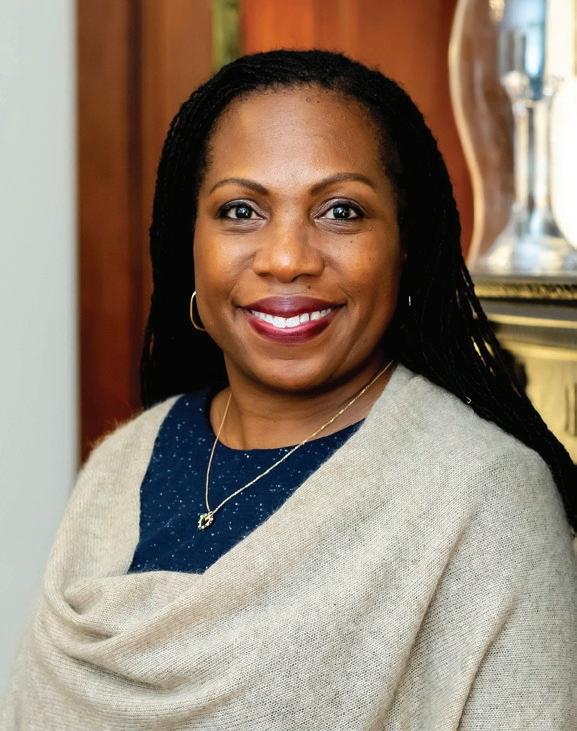
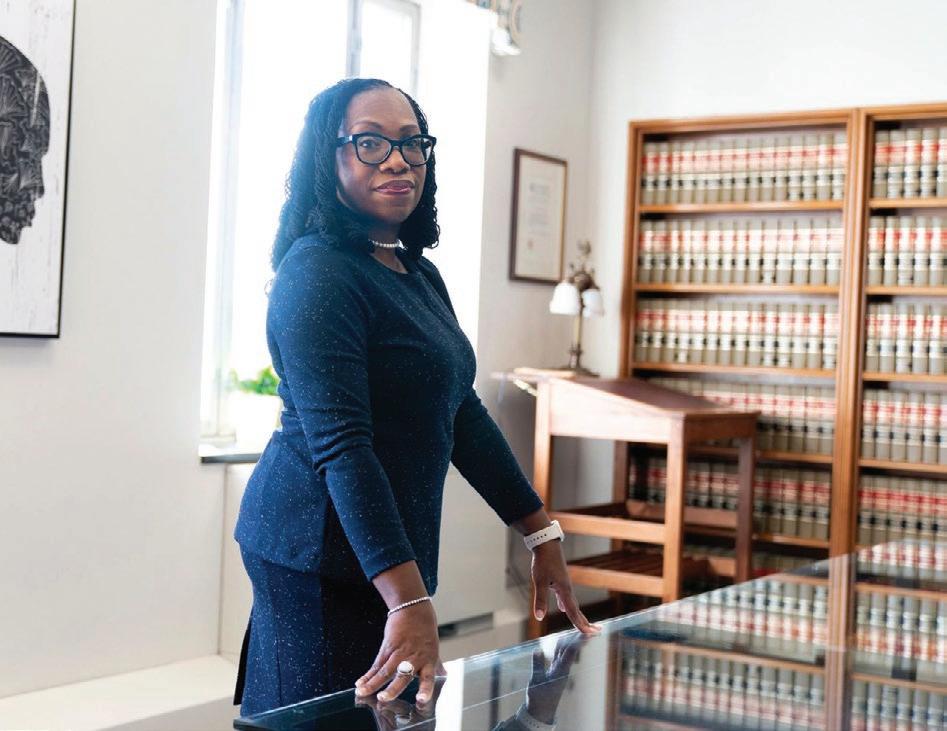
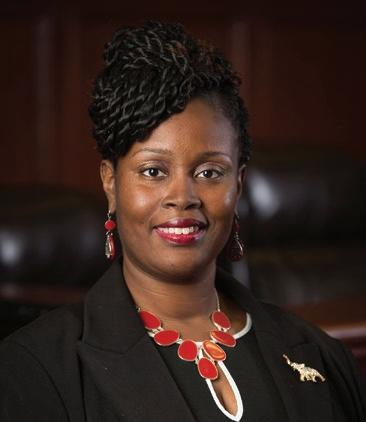
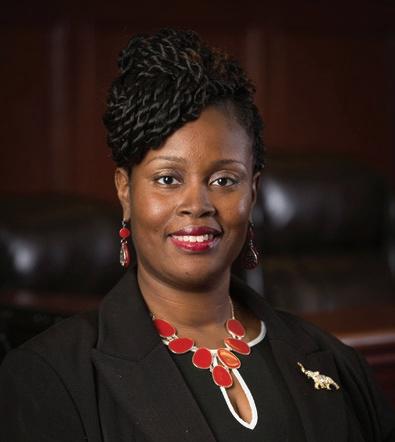
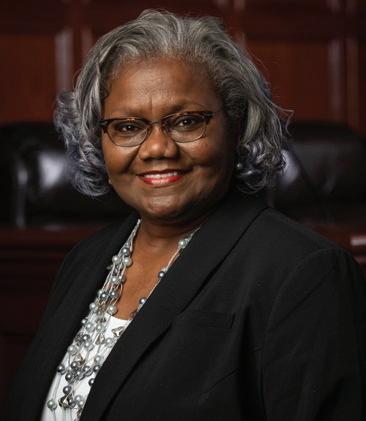
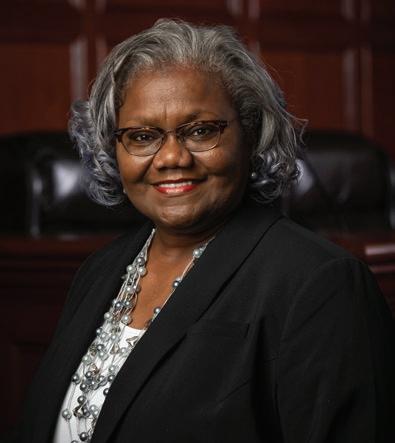
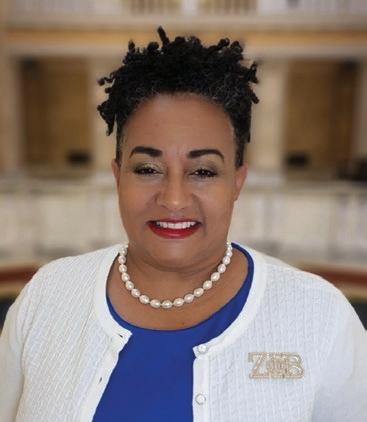
Le’Shawn R. Turner Reference Librarian
Danné L. Johnson
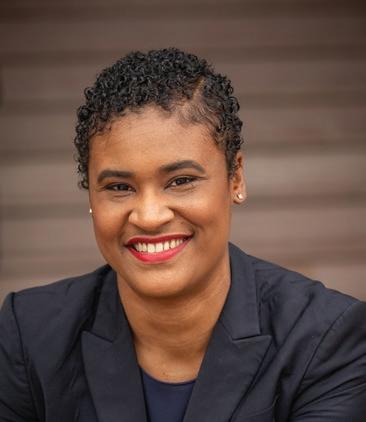
 Constance Baker Motley Professor of Law
Constance Baker Motley Professor of Law
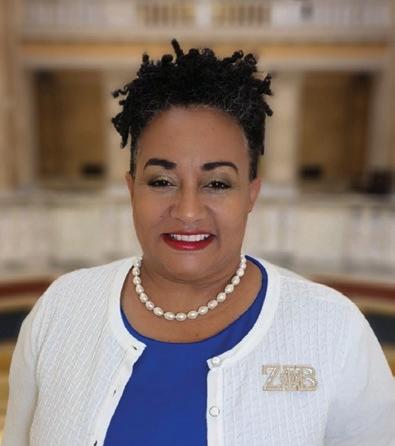
Loretta Radford
Legal Director for Criminal Justice Center
Through the years of Judge BrownKetanjiJackson
Assistant Dean for Student Services
Ketanji Brown Jackson photos courtesy of Miami Palmetto Senior High School; law library photo by Jacquelyn Martin/AP; headshot by Rose Lincoln, Harvard University

LEGAL ACTION LEGAL PODCASTS Interested in legal industry podcasts? Here are a few to try.
The Lawyerist Podcast
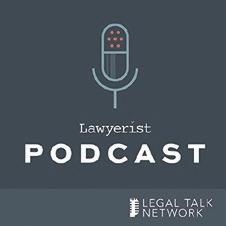
The Lawyerist Podcast is a weekly pod cast about lawyering and law practice. Successful lawyers, industry experts, and prominent business book authors cover innovative business models, legal technology, marketing, ethics, starting a law firm, and whenever possible, robots. This podcast focuses on topics to help solo and small firm attorneys and is a great op tion for forward-thinking lawyers.
LawNext

LawNext is hosted weekly by Bob Ambrogi, publisher of LawSites and expert in all things legal tech. Each episode features an interview with en trepreneurs and innovators that are transforming the legal landscape and improving access to justice. The conversations provide insights, thoughts, and pre dictions on topics ranging from blockchain, new legal tech projects and services, and the future of law and legal practice.

Legal Toolkit
Hosted by Heidi Alexander and Jar ed Correia, Legal Toolkit is a monthly podcast with an eye towards law prac tice management and how to get bet ter at it. Each episode features an interview with top lawyers and professionals to discuss services, ideas, and programs that have improved their practices and the management of their practices.
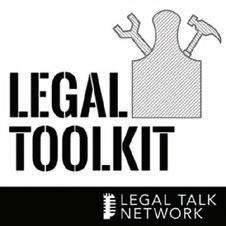
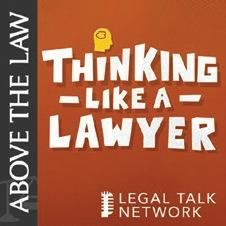
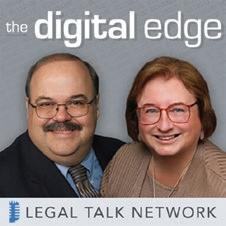
LAWsome Podcast
The LAWsome Podcast is hosted by legal marketing professionals Jake Sanders and Paul Julius. This podcast provides legal industry insights as well as access to the best experts in law firm development. Each week, LAWsome features guests that provide their thoughts on the latest legal news, running a law firm, and digital marketing. Episode topics range from branding your law firm to building a data-driven law practice.
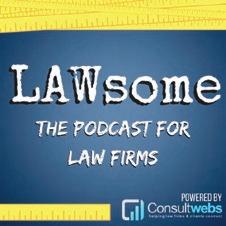
The Digital Edge Technology is no longer an option for forward-thinking attorneys. The Digital Edge covers tech-based topics for attor neys, including tech tools, software, the Cloud, and more. Plus, attorneys walk away with some advice on how to grow their firms using the technology available on the market today. The Digital Edge is hosted by Sharon D. Nelson and Jim Calloway.
The Law Entrepreneur
Hosted by Neil Tyra, The Law Entrepre neur podcast is about the business side of running a law practice. Neil shares the perspective that many attorneys have, which is that law school doesn’t prepare attorneys to run a law practice. He interviews practicing lawyers and industry experts who provide great advice on running a successful law firm on topics ranging from niche practice areas, student loans, leveraging LinkedIn, how to grow your practice, and everything in between.
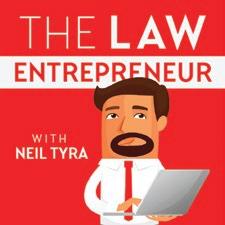
Lawyers Gone Ethical
Lawyers Gone Ethical is a weekly podcast hosted by Megan Zavieh. She covers to day’s most pressing topics and provides tools and resources to be successful in today’s law landscape. The business of law is constantly evolving. Staying out of trouble requires that lawyers un derstand the latest interpretations and applications of the ethics rules. It also requires us to figure out what to do when the rules and modern business and technology are not in sync.
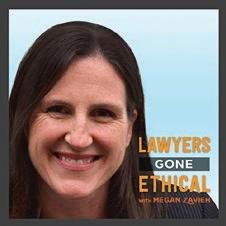
Maximum Lawyer
Maximum Lawyer is hosted by Jim Hack ing & Tyson Mutrux. This weekly podcast covers a wide range of topics from mar keting, hiring, and everything else you need to run or start a law firm. Not only will they cover the basics, but they will also dive into growing pains and address mental health issues that are associated with solo law firms.
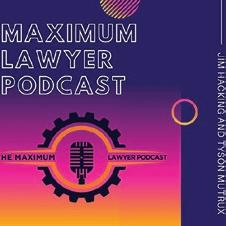
Thinking Like a Lawyer
New Solo
Hosts Kathryn Rubino, Joe Patrice, and Elie Mystal combine their experiences as journalists and litigators on the Thinking Like a Lawyer podcast that takes a unique approach to legal discussions. Together, the three hosts talk through a topic experienced by everyday people and reexamine it through the eyes of a lawyer. If you’ve ever wondered about the legal side of an impeachment pro ceeding or the accuracy of how lawyers are portrayed on TV, Thinking Like a Lawyer is a great listen.List collected from the Lawyerist and Simple Legal.
Hosted by Adriana Linares, New Solo is a monthly podcast that provides in sights and tips on transitioning from a law firm to a solo practice. It answers questions that many attorneys have regarding all phases of a solo career. Each episode provides action able information and tips for attorneys to make the most out of their new solo practice.
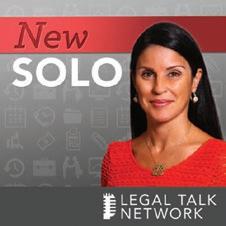
IN BRIEF OKLAHOMA CITY UNIVERSITY SCHOOL OF LAW 27
AND THE LAW OF
BY D.A. JEREMY TELMAN PROFESSOR of LAW
Russia’s invasion might make it seem like these are bad times for the rule of law. One sovereign invades another sovereign without provocation. Such actions constitute a crime of aggression, prosecuted as a “crime against peace” in the Nuremberg Tribunals. In addition, Article 2(4) of the U.N. Charter prohib its “the threat or use of force against the territorial integrity or political independence of any State . . . .” Russia’s invasion of Ukraine was the clearest viola tion of Article 2(4) since Iraq seized Kuwait in 1990. The international community responded decisively to that breach of international peace and security. And yet, the U.N. Security Council, charged with policing international peace and security, cannot coordinate a response to Russian aggression. Russia, along with China, the U.S., the U.K., and France, holds veto power on that body and thus the Security Council is unable to respond when any of its five permanent members violates international law.


The U.N. Security Council does not operate accord ing to its design, but international law has developed other legal instruments for punishing violations of the law of armed conflict. Thus far, the international re sponse to Russia’s invasion of Ukraine demonstrates the ways in which international law matters and how it operates in a world with nuclear powers, rogue states, and rogue nuclear powers.
Violations of international law are newsworthy events, not just because they are catastrophic, but because they are rare. Almost all states abide by almost all of their international obligations almost all of the time. The same cannot be said about legal persons with le gal obligations under domestic law. Every day on my way to work, I see other motorists violating the law. And to those who don’t, I say, “Get out of my lane, slow poke!”
When a state violates international law, we almost al ways know that there was a violation and who was re sponsible for it. Even during this era of cybercrime,
we can almost always track down the offender and link their conduct to the crime beyond a reasonable doubt. Stop for a moment and contemplate your own experiences with domestic law. Have you ever been a victim of a crime? Did you call the police? Did they find the perpetrator? Was justice done? When I ask my students these questions, most of them answer the first question in the affirmative and the last question in the negative.
The data I have gathered from my students sets up my bold claim. International law is more efficacious than domestic law, and yet many Americans, includ ing many political scientists and some politicians, as
LEGAL ACTION
28 OKLAHOMA CITY UNIVERSITY SCHOOL OF LAW IN BRIEF
sume the opposite. In fact, some such people contend that international law is not law at all. They think that our palpably under-enforced domestic law somehow is real, while something other than law’s independent valence must explain the fact that almost all states abide by almost all of their international obligations almost all of the time. Unlike domestic law, interna tional law works. It just works differently. To appreci ate the efficacy of international law, we must change our perspective on what it means to have a binding legal regime.
Here is where it gets tricky – international law has dif ferent enforcement mechanisms than domestic law.
International law does not work exclusively through policing and courts; nevertheless, it identifies viola tors and metes out punishments. Those punishments are to diffuse and tend not to be as attention-grab
sion would be justified under the Genocide Conven tion as a response to a campaign of genocide. Russia refused to participate in oral arguments on Ukraine’s request for provisional measures and maintained in its written submission, that the Court had no jurisdic tion over Ukraine’s claims. While the Russian and Chi nese judges agreed with Russia that the court should not exercise jurisdiction, the Court unanimously ad opted, as a provisional measure, the declaration that “Both Parties shall refrain from any action which might aggravate or extend the dispute before the Court or make it more difficult to resolve.”
Nobody expected that Russia would pay attention to the Court. Nevertheless, the proceeding provided strong evidence of Russia’s isolation and of interna tional resolve to stand with Ukraine in the conflict. Putin made claims sounding in international law,
Photos left to right by Ahmed Zalabany, Ehimetalor Akher e Unuabona, and Ivan Bandura. Background photos by Artur Voznenko and Tanya Pro (all Uns plash)
bing or headline-grabbing as the violations to which they respond.
The build-up to the Russian invasion of Ukraine illus trates how international law matters. Russia attempt ed to justify its resort to force by alleging that Ukraine was threatening to commit genocide against Russian nationals in Ukraine.


Capitalizing on Russia’s baseless claim, Ukraine brought an action against Russia in the Internation al Court of Justice in the Hague. Ukraine has asked the Court to address two issues: whether Ukraine had committed genocide and whether the Russian inva
thinking that they could not be challenged. But they are being challenged, and the International Court of Justice’s ruling mirrors the international consensus. That consensus, which is a legal consensus, fuels the main international response to Russia’s internation al crimes, a global sanctions regime that has isolated Russia, politically, diplomatically, militarily, and eco nomically. Political scientists point to such sanctions as evidence that politics trumps law, but they ignore the legal regimes that create the context in which swift, coordinated global sanctions are possible. In ternational legal norms provide the chief mechanism for arriving at agreement on a coordinated response

IN BRIEF OKLAHOMA CITY UNIVERSITY SCHOOL OF LAW 29
among states with different interests.
International legal norms do not make headlines. All the world’s a stage, and we focus only on the players. We do not see the playwright who has created the script, the stage manager who has brought the play ers together, the stagehands who provide the tools of stagecraft, and the other technicians who provide light and sound without which there would be only fury, signifying nothing. International law is all of those unseen movers. It coordinates international actions. It does not stand apart from politics, but it provides the parameters within which the art of the possible can take shape. The coordinated response to Russia’s invasion was made possible because
states have uniformly internalized international legal norms. All over the world, despite differences about so many things, people are persuaded of the illegality of Russia’s actions and the justice of the international response.
International law cannot simply command a state like Russia to cease its military campaigns. It can only pro vide diverse legal mechanisms to cut off the econom ic and political sources of Russian power and stabili ty. It is not yet clear that the power of law will suffice to temper Russian military aggression. What is clear is that legal norms are the best hope we have for ce menting the resolve of states to stand up for the sov ereign rights of the people of Ukraine.
ADDITIONAL THOUGHTS
BY HOMER S. POINTER ADJUNCT PROFESSOR of LAW
The Law of Armed Conflict (LOAC) is divided into two regimes, the law that applies to the resort to war (jus ad bellum) and the law that applies to the conduct of warfare (jus en bello).
The classic rule of jus ad bellum derives from the 1837 incident of The Caroline, in which British forc es in Canada crossed the border with New York and destroyed a private ship used in supplying Canadian rebels. When the United States protested, the British asserted “self-defense” as justification for the raid. In ensuing discussions, Secretary of State Daniel Web ster argued that a State asserting self-defense must show “a necessity of self-defense, instant, overwhelm ing, leaving no choice of means, and no moment for deliberation.” Article 51 of the United Nations Char ter – in effect memorializing Webster’s position – pro vides, “Nothing in the present Charter shall impair the inherent right of individual or collective self-de
fense if an armed attack occurs ...” Such language sug gests that as a matter of customary international law self-defense inheres in sovereignty, the contours of which are controversial and subject to much debate.
Professor Telman rightly describes Russia’s invasion of Ukraine as the clearest violation of the Charter in more than three decades. In contrast, the Russians have even denied they are “at war,” let alone the ap plication of generally accepted norms of LOAC. Com mentators have speculated that President Vladimir Putin has concluded Ukrainian membership in NATO would threaten Russian security, yet to my knowledge neither NATO nor Ukraine has taken any formal step toward such membership. Ironically, it would appear that if Putin were to seize more Ukrainian territory as he did Crimea in 2014, Putin himself would be drawing NATO closer to Russian borders.
 Photo by Max Kukurudziak on Unsplash
Photo by Max Kukurudziak on Unsplash
LEGAL ACTION
30 OKLAHOMA CITY UNIVERSITY SCHOOL OF LAW IN BRIEF
Generally speaking, sovereign States have the right to assess threats to their security on their own and to respond accordingly. While Article 51 speaks in terms of “armed attack,” state practice – the source of cus tomary international law — suggests that States need not in all cases await armed attack before taking mea sures in self-defense but may resort to armed force in the face of “imminent threat,” which has become known as “anticipatory” self-defense. Obviously, Russia was not subjected to armed attack by Ukraine. More to the point, however, Russia has failed miser ably to make any case that Ukraine was an imminent threat to Russian national security.
Jus en bello, the branch of LOAC that deals with the conduct of warfare, includes the well-known Gene va Conventions and their protections for victims of war, such as sick and wounded combatants, prisoners of war, and noncombatant civilians. It also includes Hague Conventions on the means and methods of conducting warfare. Then there are a number of trea ties that deal individually with specific matters, such as chemical weapons, genocide, or torture.
Reports in the press about the armed conflict in Ukraine are replete with accounts of genocide, direct attacks on civilians, and kidnappings of uncooper ative civilian officials. If such allegations were true, they would be serious violations of the Law of Armed Conflict. Yet I urge caution and not jumping to con clusions. My experience has been that first reports are often — if not usually — wrong, as the “fog of war” can and does impair accurate fact-finding, especially in the early stages of conflict. First reports are typi cally by journalists — and their sources — who may or may not have access to the battlefield and, in addition, may use legal terms of art selectively or inaccurately. For example, Ukraine has petitioned the Internation al Court of Justice (the judicial branch of the United Nations) regarding allegations of genocide. The appli cable convention provides for prosecutions by State Parties of individuals responsible for genocide. That means that even if the Court enters judgment in favor of Ukraine, it is not the Russian State who would be held responsible.
Perceptions of the legitimacy of the use of force can be significantly affected by the issue of civilian casu alties. As the United States experienced in post-9/11 conflicts in Southwest Asia, there is a tendency to fo cus on the numbers of civilian casualties without more deliberate consideration of applicable law. Civilian ca sualties are tragic and must always be taken seriously, yet they are inherent in the nature of war, so it is im portant to understand that the Law of Armed Conflict seeks to regulate civilian casualties, but it does not prohibit them. The legal standard is that the loss of civilian lives must not be excessive relative to the mil itary advantage gained by destruction of the intend ed target. In common parlance, this is the notion of
“collateral damage.”
Ukraine has also sought relief in the International Criminal Court and the European Court of Human Rights, both of which, while influential in the court of public opinion, actually have specific and somewhat limited jurisdiction. In addition, actionable facts are hard to come by in the earlier stages of war and typ ically cannot be fully investigated until the shooting stops. As time goes by, lifting of the “fog of war” may shed new and different light on initial impressions.
Prosecutors who seek convictions for war crimes can not rely on popular usage of terms of art; rather, they may go only where the facts take them and to the ex tent that they address the burden of proof. Even at Nuremberg, there were acquittals. In sum, expecta tions for “justice” for violations of international law must be realistic.
A word about the perception that International Law is “not real law.” In the first paragraph of the Declaration of Independence thirteen united colonies claimed to “assume among the powers of the Earth the separate and equal station to which the Laws of Nature and of Nature’s God entitle them, …” Then in its last para graph, they claimed that “as Free and Independent States, they [the United States of America] have full Power to levy War, conclude Peace, contract Allianc es, establish Commerce, and to do all other Acts and Things which Independent States may of right do.”
Given that the Declaration of Independence preceded the Constitution by some eleven years, it seems clear at least some powers derive not from the Constitution but from the Laws of Nations. That is, in drafting the document that founded our Nation, Thomas Jeffer son apparently thought of International Law as “real law.” Further, the Supremacy Clause of the Constitu tion, included in Article VI, provides, “This Constitu tion, and the Laws of the United States which shall be made in Pursuance thereof; and all Treaties made, or which shall be made, under the Authority of the Unit ed States, shall be the supreme Law of the Land.” In the prize case of Paquete Habana the Supreme Court declared, “International law is part of our law.” Prop erly appreciated, International Law could be both sword and shield.
Disappointment that LOAC’s jus ad bellum did not prevent war in Ukraine is understandable. Allegations of violations of jus en bello are similarly concerning. Nevertheless, we should take heart that while Rus sia violated International Law, more than 160 other States did not. Measures short of armed force, like economic sanctions or exclusion from world affairs, will eventually take their toll. Global politics may treat Russia as something of an outlaw, reducing Russian influence. So, as a matter of brute force, it may appear that the Russians have gotten away with invading Ukraine – but we have not heard the rest of the story. International Law may yet prove its mettle.
IN BRIEF OKLAHOMA CITY UNIVERSITY SCHOOL OF LAW 31
CANNABIS LAW IN OKLAHOMA
BY DONALD E. GIES III '19 FOUNDI NG PARTNER &

OVERVIEW
Oklahoma’s medical marijuana program was born in 2018 when state residents voted overwhelmingly in favor of State Question 788, the country’s most pro gressive policy to date. Due to low tax rates and light regulations, Oklahoma’s medical marijuana market is presently the largest in the world on a per capita basis. With no qualifying conditions required for an Oklahoma resident to be authorized to use medical cannabis, anyone over the age of 18 can obtain a val id physician recommendation from an Oklahoma-li censed doctor. The Oklahoma Medical Marijuana Au thority (OMMA), the agency tasked with overseeing the program, reports more than 382,000 active pa tients presently — representing more than 10% of the state’s total population.
LICENSING
There are specific types of primary commercial busi ness licenses in Oklahoma. Dispensary licenses grant retail establishments the right to sell cannabis flow er, concentrated extracts, edible food products (often in the form of gummies) and topical products such as creams or balms. Processing licenses authorize a business owner to alter the native state of marijuana by turning it into the manufactured products listed above and distributing those products to dispensa ries. Growing licenses allow for the cultivation of the marijuana plant from seed to flower and laboratory li censes test the product for pesticides, heavy metals, and microbials prior to reaching the patient. Finally, in order to transport cannabis products from one en tity to another in the supply chain requires a commer cial transporter license. Each license carries a $2,500 business application fee, with no limit on the number of licenses that a single individual or entity can hold.
The path to licensing is simple if 75% of the business is owned by a two-year Oklahoma resident at least 25 years old. In order to obtain licensure, all cannabis
AMEEN Y. BEHBAHANI '20 P ARTNER at GIES LAW FIRM, PLLC
business applicants must first obtain a Certificate of Compliance from the political subdivision that has jurisdiction over the geographic location of the busi ness — usually a city or county. Additionally, each owner must provide a background check proving no felonies in the last two years, or violent felonies in the past five. Lastly, every business must register with the Oklahoma Bureau of Narcotics and Dangerous Drugs (OBNDD) prior to participating in the market.
TAXATION
Oklahoma medical marijuana patients pay both a reg ular sales tax — which varies according to location, and an additional 7% gross revenue tax on all canna bis purchases. Oklahoma’s tax burdens are signifi cantly less than other states where the gross revenue, also called excise tax, can be much higher. California, for example, charges patients a 15% excise tax on mar ijuana and collects higher sales taxes in general.
While the state taxes may be lower than other com parative states, cannabis business owners are subject to federal taxes that prohibit ordinary deductions for business expenses that other businesses would other wise have under the Federal Tax Code. Under Internal Revenue Code Section 280(e), a cannabis business may only deduct the cost of goods sold. Because marijuana remains a Schedule I drug under the Controlled Sub stances Act, the tax code disallows businesses to write off basic expenses such as rent, labor and insurance.
PROPOSED CANNABIS LEGISLATION
The “Wild West” days of Oklahoma cannabis could soon be legislated into the past as nearly 90 bills re lating to the marijuana industry were introduced at the beginning of the 2022 legislative session. As the session narrows to a close, many of those bills are al ready making their way back to their house of origin and could soon be making their way to the Governor’s
LEGAL TRENDS
32 OKLAHOMA CITY UNIVERSITY SCHOOL OF LAW IN BRIEF
desk. Governor Stitt has already signed two cannabis bills into law: SB 1511 prohibits any commercial grow er from operating within 1,000 feet of schools and HB 3019 requires product packaging be clear in order for consumers to view the contents.
The Oklahoma Pre-Packaged Cannabis Act, HB 2987 would require that all cannabis flower, presently avail able for deli style purchase, be packaged in contain ers no smaller than half a gram and no larger than three ounces. Proponents of the bill believe it would aid in implementing the state's seed to sale tracking system, Metrc, which went into effect in May 2022. However, opponents argue that this is detrimental to the patient experience and creates unnecessary, ad ditional packaging expenses for businesses.
Much of the proposed legislation affects the marijua na licensure requirements. SB 1697 proposes tiered licensing prices for commercial growing operations that would increase licensing fees based on square footage. The proposed bill bifurcates licenses ac cording to whether they are indoor or outdoor facil ities, and most small growing facilities would remain unaffected, paying the $2,500 licensing fee already in place due to the size of their business. Another im pact on licensure, HB 3208 would impose a two year moratorium on all licensing altogether. If signed into law, all license applications received after August 1 of this year, would sit in suspense until August of 2024 due to the proscription of OMMA processing any new licensing applications beyond the cut off date. The moratorium could end earlier based upon the discre tion of the Executive Director of OMMA if she deter mines that all pending licensing reviews, inspections, or investigations have been completed.
TRADEMARK CONCERNS
As the Oklahoma cannabis marketplace becomes continually more competitive, a company’s branding

can separate it from the pack. All medical marijuana businesses are essentially young and emerging onto a never-before-seen market, branding is incredibly imperative. Oklahoma registers trademarks for med ical marijuana companies — Title 78, Section 23 of the Oklahoma Statutes applies to all trademarks and la bels. To adopt and use a trademark in this state, ap plicants submit a prefabricated form on the secretary of state’s online filing system along with a $50 regis tration fee. Federal Protection for trademarks, how ever, is extremely limited as the United States Patent and Trademark Office often denies cannabis related marks due to the absence of federal legalization.
Infringement occurs when a party’s later use of a mark would likely cause confusion among reasonable per sons about the source of goods. Often, cannabis busi nesses have used famous brands as common starting points for branding by playing on well-established brand recognition. Large “Big Candy” corporations such as Wrigley, Hershey’s, and Girl Scout cookies have taken notice and federal infringement litigation is on the rise in the cannabis industry.
CONCLUSION
Many things remain to be determined in the canna bis industry and, because of this, confusion and mis information abounds. Oklahoma voters spoke this marketplace into existence four years ago with very little guidance or structural support in place. Great accomplishments have been made since then, along with great mismanagements — by regulatory/legis lative/enforcement efforts, and also those of hopeful entrepreneurs trailblazing this industry. “Settling into” a controversial new industry understandably takes time and comes with growing pains. However, it remains undeniably exciting for Oklahoma to see it self leading the nation and serving as a guidepost for other states watching in the eaves
Photo by Tytia Habing
IN BRIEF OKLAHOMA CITY UNIVERSITY SCHOOL OF LAW 33
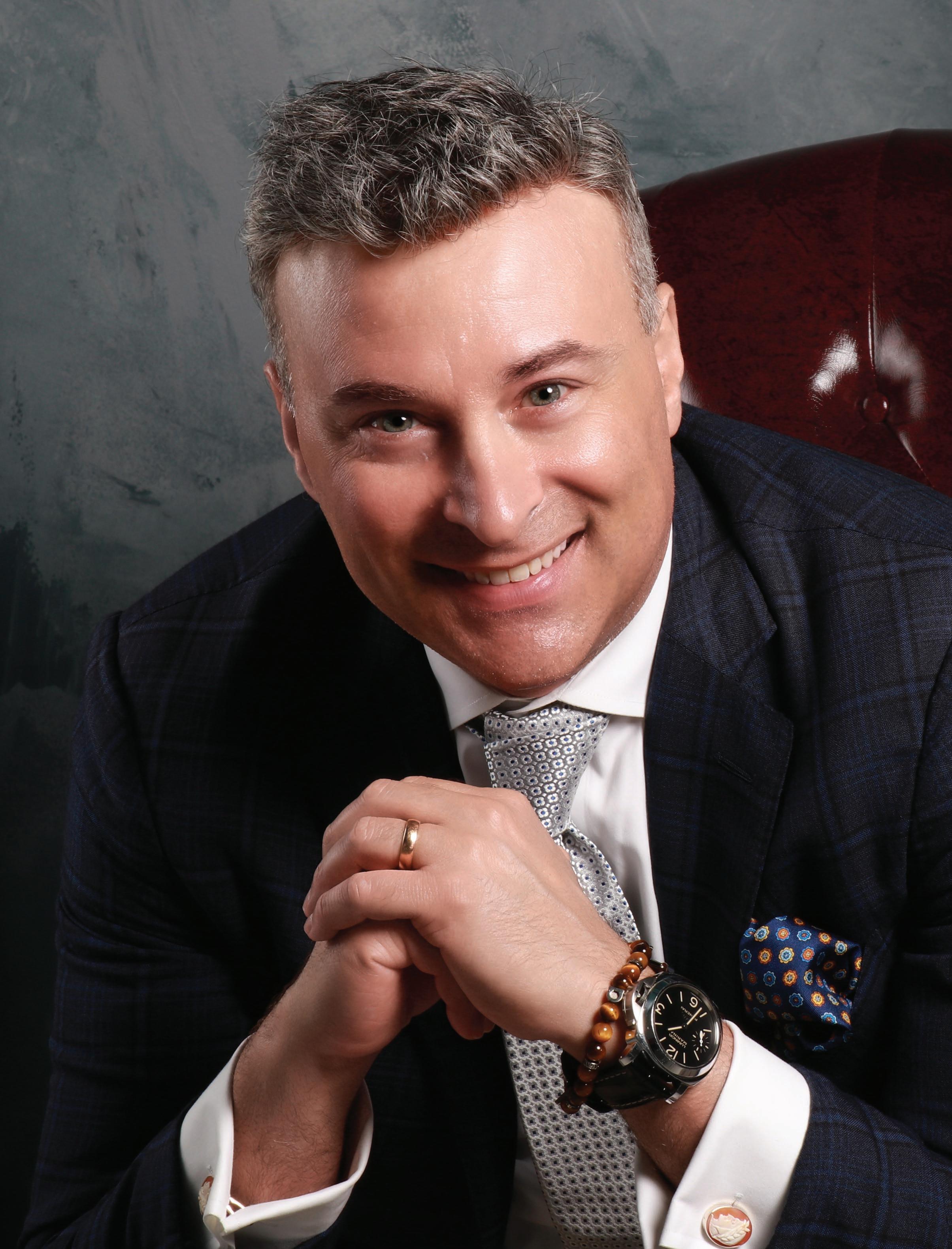
LEGAL TRENDS
TAKING THE LAW INTO HIS OWN HANDHELD
Anthony Barbuto ’04
Turns Being a Lawyer Into a Social Media Sensation
BY DAWN HARTH FREELANCE WRITER
OCU School of Law alumnus Anthony Barbuto has been holding court.
But not the kind of court you might be thinking of. No, this Florida-based attorney has been hold ing court in just about every kind of place except a courtroom; capturing and retaining the atten tion of millions of people across the country with his irreverent, funny, and – yes – law-focused Tik Tok videos.
We spoke with Barbuto about his endeavor into the social media platform, and how he’s man aged to turn the traditionally all-business sub ject of law into lighthearted videos complete with rap music, dancing, the occasional fart gag, and more. It seemed only fitting, then, that we turn the resulting article into a social-media-style list of don’ts, complete with nuggets of wisdom from the lawyer who has most definitely built a per sonal brand on not being afraid to do.

FIRST AND FOREMOST: DON’T THINK JUST BECAUSE YOU’RE A LAWYER YOU CAN’T DO SOCIAL MEDIA.
“I’ve never felt any negative impact at all about my social media presence. If any thing, it really humanizes me. It makes me more interesting as a person and as a lawyer.
Social media icon 3D renderings by Alexander Shatov on Unsplash
Young lawyers start off and they’re so serious all the time. They’re afraid to express their individuality and they try to act like they think they’re supposed to act. Honestly, I don’t particularly like hanging out with lawyers most of the time. But if you find one with a great sense of humor or who you share some common interests with, that’s a different story.
If young law students out there are interested in social media, they should hop on it now. Whatever platform you’re interested in, if you create a personality that’s appealing and interesting to people, you’re building your brand.”
DON’T JUST THINK OF IT AS A WAY TO PROMOTE YOUR LAW FIRM.
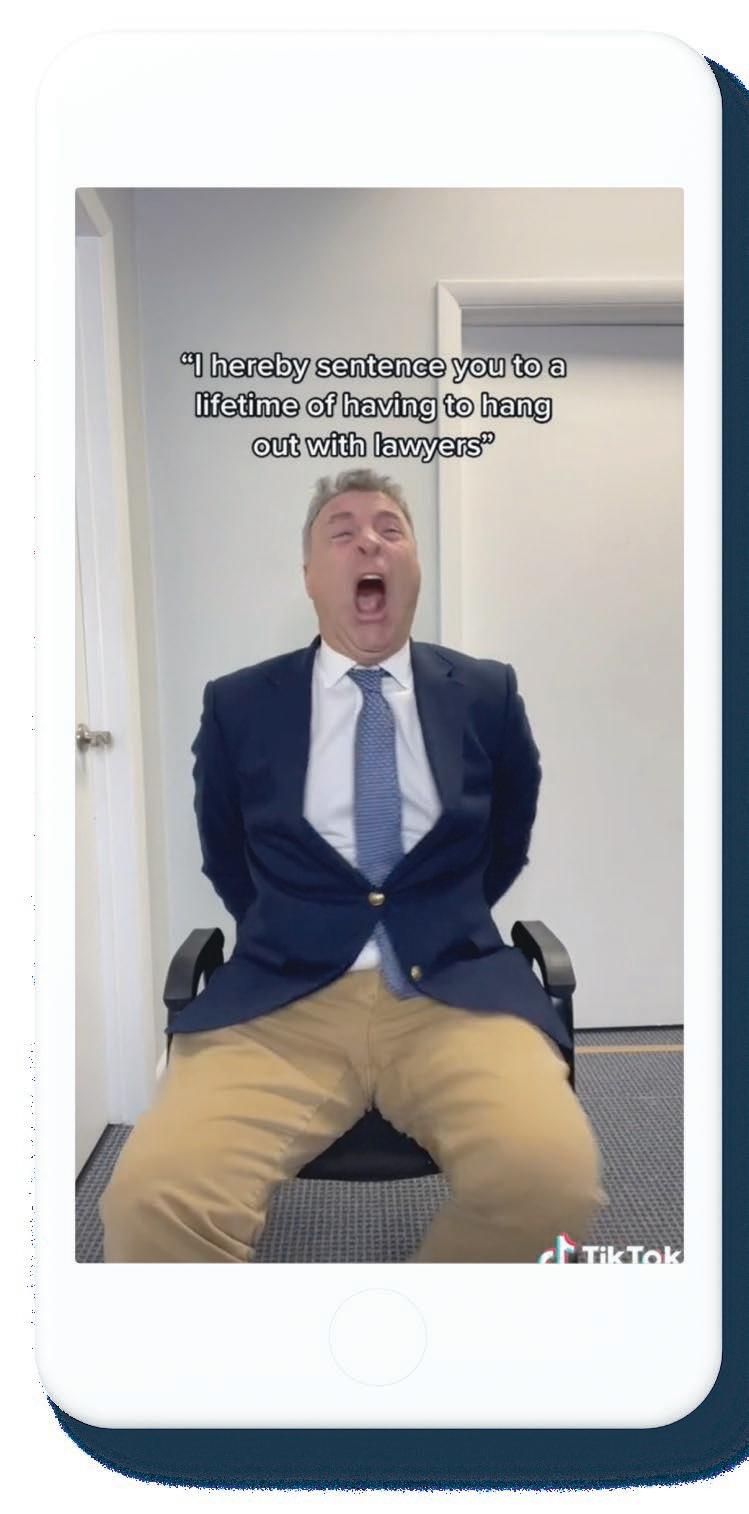
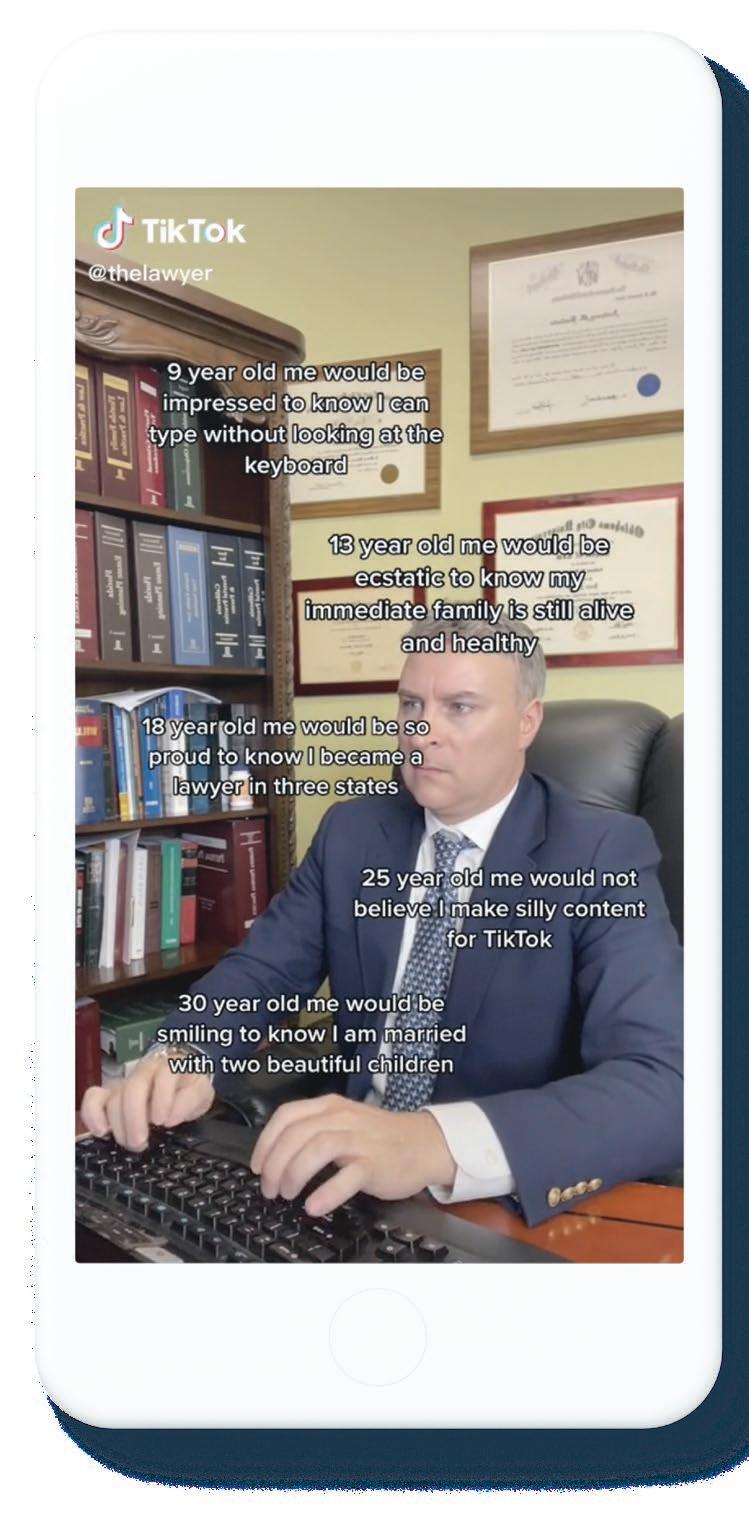
“At some point, maybe seven years ago, I started get ting involved with social media, but more so as just a fan of other channels and a reader of blogs and things like that.
And then I just remembered I was in court in Broward County, FL, and I had just started my TikTok account.
I was dressed in a suit in my car, and I created a video. I remember being stressed as I was leaving the court house, and then after I did that video, I swear I laughed the whole way home. And I remember thinking that for lawyers, when we’re doing things like litigation, it’s a really great stress reliever.
I never started for the purpose of generating legal
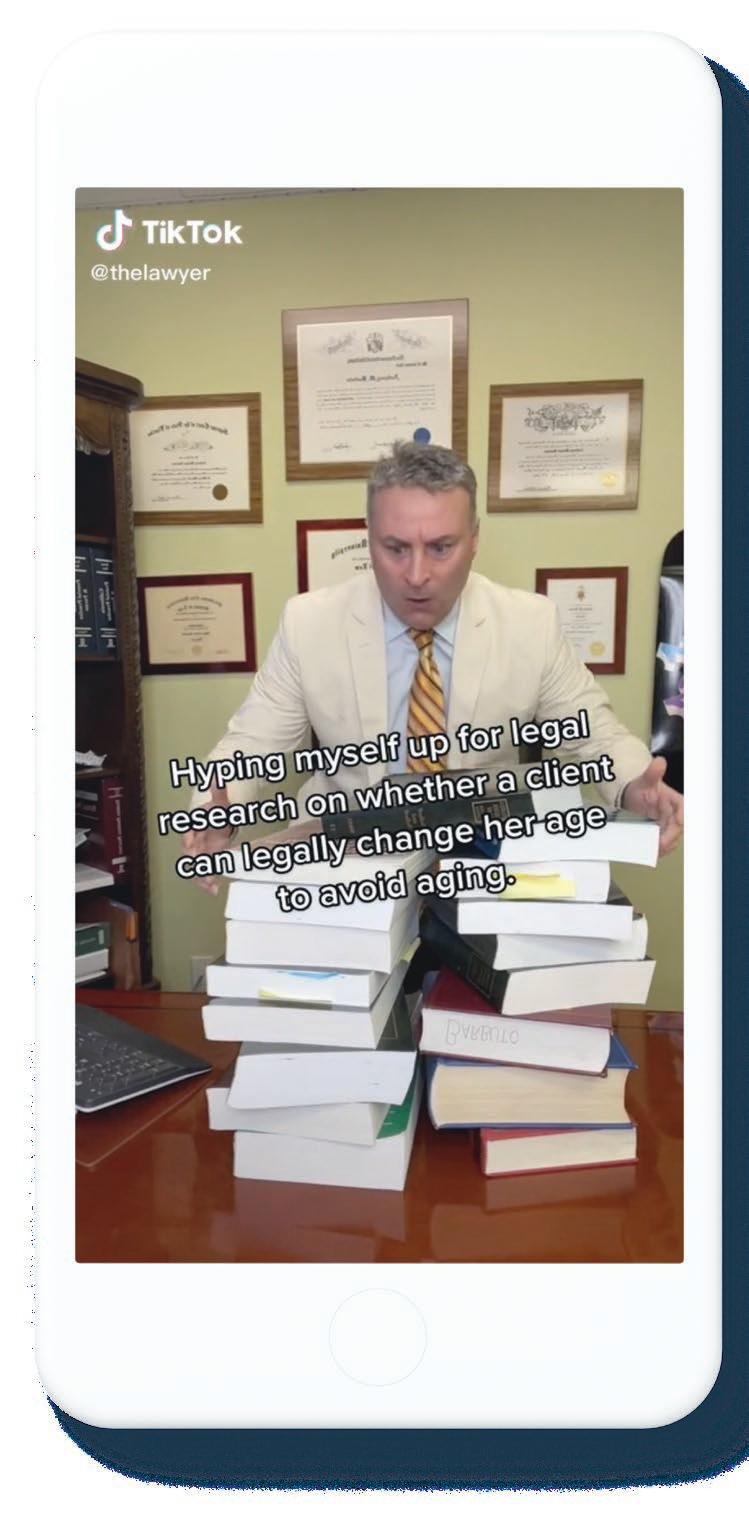
business. It was never my focus to do that. But then, people started responding very positively, and now I get messages from all over the world about legal is sues. I have received thousands of messages from prospective clients, many of which became clients. I’m only licensed in Florida, California, and New Jersey, so I can’t help them all, but for sure, (social media) has generated a great deal of business for me.”
DON’T BE AFRAID TO LET YOUR PERSONALITY SHOW.
“Whatever your interests are, don’t lose them and don’t feel like you have to try and hide them. You nev er want to lose your individuality. You want to be relat able; you want to keep it G-rated, but whatever your interests are, focus on those. And if you want to do stuff on the law, that’s fine too, but you must make it interesting.
People will tell you ‘Lawyers can’t be funny. Lawyers can’t have a sense of humor.’ Well, look at (former) President Barack Obama on Saturday Night Live making jokes and dancing. I love watching world lead ers and really powerful people express their individu ality and do funny things. I think that all people should be more comfortable doing it. It's more of my natural personality to be funny, but if something else feels natural and comfortable to you, just go for it. Do what comes naturally for you.”
LEGAL TRENDS
by Alexander Shatov on
DON’T OVERTHINK IT. JUST JUMP IN SOMEWHERE.
“Initially, it was slightly uncomfortable for me to post. But as I got more involved in following different types of social media, I eventually built up the courage to start my own blog because I enjoy traveling and Ital ian culture and teaching enthusiasts and other Amer icans about what authentic Italian culture is. That was a big leap to put myself out there that way.
I started very gradually, and I got a great response. When I first started on TikTok, I didn’t know what I wanted to do. I just found it very entertaining and, quite frankly, a stress reliever from the practice of law. And then I decided I wanted to make some videos as a lawyer. At first, they were all private. But as I got good feedback, I started making everything public. Then people started responding very positively, and next thing you know, I was receiving thousands of messag es from around the world.”


DON’T UNDERESTIMATE THE POTENTIAL.
Don’t hesitate to reach out to Anthony.
“I get a lot of messages from young people who want to be lawyers, asking for advice. ‘What do I take in high school?’ ‘What do I take in college?’ ‘How do I get through law school?’ ‘How can I be a cool lawyer?’ ‘Could you give me advice?’ I just say ‘Here’s my num ber. Call my office. Schedule an appointment.’ I’m al ways happy to help young people who are interested in the practice of law.”
Barbuto posts for his 2.2 million followers on TikTok as @thelawyer. You can see all of the content from An thony the Lawyer and Anthony the Italian Enthusiast at anthonybarbuto.com.


icon
Social
“I now have a channel for my two kids, who are five and three years old. And the reason why I do is because I am negotiating six-figure contracts for clients who are influencers and who are 17 years old. And it’s not even a full-time job. All they have to do is make some videos throughout the year. So, I really want to get my kids involved. I want to have those doors open for them, because honestly, I can’t think of a better job. It’s fun, you get to do stuff with your friends, you get to travel, and you get to make good money.”

media
3D renderings
Unsplash tiktok.com/ @thelawyer 2.2M instagram.com/ italianenthusiast 40K youtube.com/ thebarbutofamily 1.7K facebook.com/ italianenthusiast 106K
LA PRENSA
BY JULIETA MENDOZA SECOND YEAR LAW STUDENT
Es difícil formular las palabras para expresar lo or gullosa que estoy de ser parte del programa Span ish for Lawyers. Es un honor haber sido publicada y ser parte de La Prensa, el primer Diario Hispano en el estado de Oklahoma. La Prensa ha proporcionado la plataforma para estudiantes de todos los orígenes en OCU Law para compartir sus opiniones sobre te mas recientes que han afectado a sus comunidades. El tener diversas voces es lo que hace a La Prensa im pactante. A través de La Prensa, podemos ayudar a educar a nuestra audiencia y amplificar la voz de las comunidades marginadas. Tener La Prensa es aluzar sobre las injusticias que están pasando actualmente. Este espacio seguro para los estudiantes de Derecho de OCU, es un privilegio que aprovecharán las futuras generaciones. Al tender La Prensa significa fomentar y crear un ambiente acogedor en OCU Law.
La oportunidad de que los estudiantes tienen esta plataforma para hablar libremente sobre los temas que más les importan dejando un legado; OCU Law valora y valida las opiniones de los estudiantes. El lega do que espero que dejen estos dos programas en OCU Law es el de una contribución positiva al hacer cambi os en nuestra comunidad. Espero que tanto Spanish for Lawyers como La Prensa inspire y alienten a OCU Law a esforzarse para algún día ser considerada una institución al servicio de los hispanos. A medida que la comunidad hispana en la ciudad de Oklahoma con tinúa creciendo, la necesidad de Spanish For Lawyers y La Prensa en OCU Law también crecerá. Como fu turos abogados, nuestras voces tienen peso y sé que Spanish for Lawyers y La Prensa ayudarán a que las voces de los estudiantes lleguen a nuestras comuni dades para ayudar a hacer un cambio. El legado que Spanish for Lawyers y La Prensa dejarán en OCU Law es uno de inclusión y diversidad.
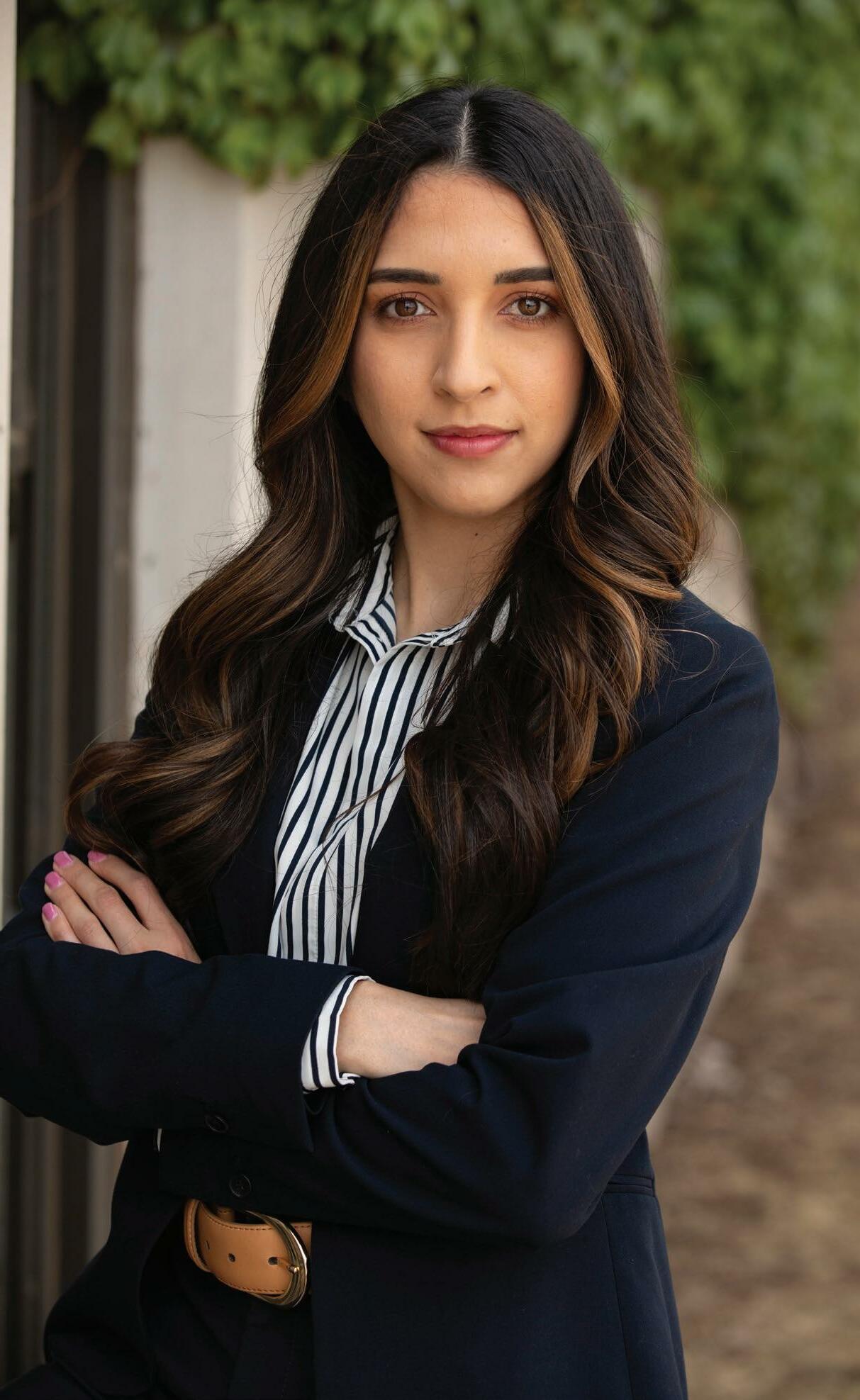 Julieta Mendoza
Julieta Mendoza
LEGAL TRENDS
38 OKLAHOMA CITY UNIVERSITY SCHOOL OF LAW IN BRIEF
It is difficult to formulate the words to express how proud I am to be part of the Spanish for Lawyers pro gram. My first year of law school was much more dif ferent and difficult than I could have ever imagined. I felt out of place and very homesick. Before coming to law school, I graduated from an institution where re sources for Spanish speakers were readily available. When Katie Metallo, Assistant Director of Academic Achievement, mentioned to me her idea for creating a program that would help Spanish speaking students further develop their bilingual capabilities in profes sional and legal settings, I was excited. This program, she explained, would help students like me succeed academically and professionally. She then asked me to be a part of the program by planning and organiz ing the Fiesta.
The Fiesta is an event that celebrates the hard work and dedication the members of the program made to receive their Spanish for Lawyers certification. We reached out to local attorneys to speak on a panel at the Fiesta, attorneys who shared the Spanish for Lawyers goal of making the legal community in Okla homa City more diverse. Our goal for the panel was to educate and introduce students to the unlimited op portunities, the advantages, and the needs that stem from having a diverse background and bilingual skills in the legal field.
To have been published and be part of La Prensa, the first Hispanic Journal in the state of Oklahoma, is an honor. This Journal has provided students of all back grounds with the platform to share their opinions on recent issues that have affected their communities. Having diverse voices is what makes this Journal so impactful. Through La Prensa, we can help educate our audience, amplify the voice of marginalized com munities, and shed light on injustices that are current ly happening. This safe space for students at OCU Law is a privilege that future generations will benefit from while also creating a more welcoming environment.
In writing my article for La Prensa, I hoped my words would reflect the goal for the program and Journal. The opportunity of providing students a platform to speak freely on issues that matter to them is to leave a legacy that OCU Law values and validates student opinions. I hope both Spanish for Lawyers and La Prensa inspire and encourage OCU Law to strive to one day be considered a Hispanic Serving Institution. As the Hispanic community in Oklahoma City contin ues to grow, the need for the Spanish for Lawyers pro gram and La Prensa will grow as well.
The continuing goal for both Spanish for Lawyers and La Prensa is to give a voice to those in the Hispanic community to discuss legal issues and help future cli ents. More importantly, this community will continue to have a stronghold within the law school itself, help ing OCU Law students become the best attorneys they can be.
Portrait photography by Simon Hurst
Through La Presna, we can help educate our audience, amplify the voice of marginalized communities and shed light on injustices that are currently happening.
A través de La Prensa podemos educar al público, amplificar la voz de las comunidades marginadas, y dar luz a las injusticias que actualmente están sucediendo.
ENGLISH
IN BRIEF OKLAHOMA CITY UNIVERSITY SCHOOL OF LAW 39
2021 - 2022
1960s
William L. (Bill) Brown ’65 was publicly honored by the State Bar of Texas at its annual convention with a plaque "in recognition of valuable and meritorious service rendered by William L. Brown to the Community, State and Nation, as a member of the Bar for more than Fifty Years."
Gerald L. Gamble ’68 received the Walter Powell Award from the Bachelors Club of Oklahoma City.
1970s
Weldon Stout ’74 joined the board of directors for Desert Mountain Energy Corp., a company based in Vancouver focused on exploration, development and production of helium, hydrogen and noble gasses.
Thomas Mirabile ’75 accepted an appointment to serve as an adjunct faculty member at Tulane University School of Public Health and Tropical Medicine.
Andrew Benton ’79, presi dent emeritus of Pepperdine University, was named to the Christian Chronicle’s Board of Trustees.
1980s
Oklahoma County District Judge Ray Elliott ’80 announced his intention to retire.
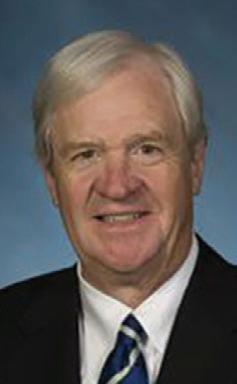
Norman D. Thygesen ’80 is retiring from the bench as the Associate District Judge of Muskogee County.
Paula Davidson Wood ’82 received recognition as a 2021 Pro Bono Leader by the American Bar Association Standing Committee on Pro Bono and Public Service for extraordinary pro bono services through ABA Free Legal Answers program.
Kay Van Wey ’83 was featured in Legal Reader for her work in the Dr. Death case.
Carolyn Thompson ’83 received the Journal Record’s Leadership in Law Award at the 2022 Oklahoma County Bar Association’s Law Day Luncheon.
Edward Testino ’84 was installed as the Middlesex County Bar Association’s 107th president.
Janie Simms Hipp ’84 was confirmed by the U.S. Senate to serve as general counsel of the U.S. Department of Agriculture.
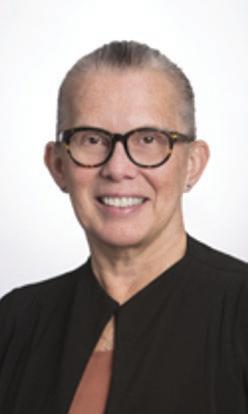
George “Buddy” Leach III ’84 was appointed by Oklahoma Gov. Stitt as the new District Attorney for District 1, which covers Beaver, Cimarron, Harper, and Texas Counties.
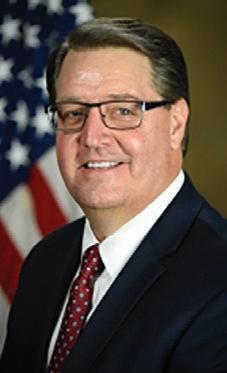
David Skilling ’84, a volunteer with the Kossuth Regional Health Center and Clinic in Iowa, was named one of the Senior Health Insurance Information Program’s Advance Award Volunteers of the Year.
John Dorman ’84 joined the Spencer Fane law firm.
Robert Troester ’87 received an addi tional 120-day appoint ment as interim U.S. attorney for the Western District Court of Oklahoma.
1990s
Scott Henley ’90 has retired and started as a mediator - certified by the Supreme Court of Oklahoma.
Tony Scott ’91 was recognized by the Oklahoma Society of CPAs as one of five 2021 "Pathfinder" recipients. Scott was also recognized as the OSCPA's 2021 "Outstanding Member in Financial Planning" for exceptional leadership and achievement as a CPA in financial planning.
Raymond “Rusty” Rust III ’91, president and CEO of Commercial Bank of Texas in Nacogdoches, was elected chairman of the Texas Bankers Association.
40 OKLAHOMA CITY UNIVERSITY SCHOOL OF LAW IN BRIEF
Rob Ramage ’92 is the new general manager of the Texas Motor Speedway in Fort Worth.
Opening Night Enterprises, a company founded by Charles Jones II ’93, is producing a competitive TV series called “Opening Night America,” which will feature teams staging original musicals with mentorship by Kristin Chenoweth.
Patent attorney Michael J. LaBrie ’94, was honored as a top-ranked lawyer in the field of intellectual property law along with Patricia A. Rogers ’99 who was recognized for her work in the field of healthcare law, and ERISA attorney in the 2021 edition of the prestigious Chambers USA Guide to America’s Leading Lawyers for Business.
Cynthia L. Andrews ’94, a lawyer in the Crowe & Dunlevy firm, was recognized by the Best Lawyers publication in the Employee Benefits Law category.
Mike Schag ’94 was elected to the Board of Directors at the law firm of Heyl Royster Voelker & Allen.
Christina M. Mayer ’95 won the election for a Dunn County Circuit Court judge seat in Wisconsin.
Tim Moore ’95, member of the North Carolina House of Representatives, received the Davie Award from the University of North Carolina at Chapel Hill, which recognizes individuals who exemplify dedication, commitment and service to the university.
Dan Palazzo ’96 was promoted to Deputy Public Defender of the New Jersey Office of the Public Defender, where he oversees the Sussex, NJ region.
Loren M. Lampert ’96 was named Executive Director of the Louisiana District Attorneys Associa tion.
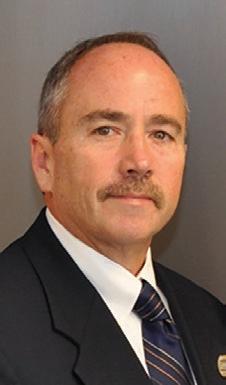
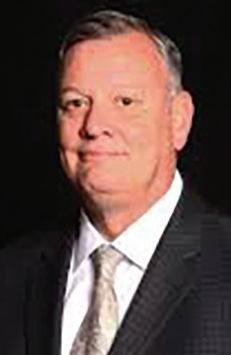
Michael McGurk ’96 obtained the No. 1 Business Law Verdict in Texas and the No. 2 in the US in 2019 as ranked by the National Law Journal. He was also designated a 2021 Super Lawyer in Texas Monthly Magazine.
Ed McQueen ’96, corporate lawyer for the Bell Nunnally firm, was named to the Best Lawyers in America list and was also named to D Magazine’s “Best Lawyers in Dallas 2021.”
Julie (Vogt) Miller ’97 was elected to a two-year term on the board of directors for the Council of School Attorneys.
Jennifer M. King ’97 took the oath of office as Yukon, OK’s new municipal judge.
Jason A. Robertson ’97 was sworn in as a U.S. magistrate judge for the U.S. District Court of the Eastern District of Oklahoma. He is a citizen of the Cherokee Nation and has the honor to become the first Cherokee Citizen to be selected as a U.S. magistrate judge.
Angie Konczak ’98 announced her candidacy for judge in Gregg County, Texas.
Courtney Warmington ’99 was appointed to a nine-year term on the State Regents for Higher Education.
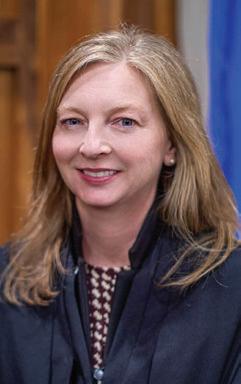
Richard Jones ’99 was named a Juvenile Court Judge in Cherokee County, Georgia.

Amy J. Pierce ’99 was appoint ed as the first full time district court judge for the Choctaw Nation of Oklahoma’s Judicial Branch.
2000s
Suzie Shiff Paulson ’01 was named CEO of OMAG. Paulson will be the first female to serve as the OMAG CEO since OMAG’s creation in 1977.
Twana W. Allen ’01 joined West and Associates L.L.C. Dallas office as a partner.
Kara Smith ’02 was named general counsel of the Oklahoma Health Care Authority.
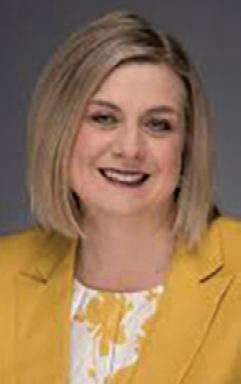
Marlo Lyons ’02 published the book Wanted - A New Career which is a definitive playbook to help you leverage your skills from your current/previous job and transition them to the new career of your dreams.
Shanda McKenney ’02 assumed the presidency of the Oklahoma County Bar Association.
Carrie Burnsed ’02 joined the firm of Rogin Nassau in downtown Hartford, CT, as counsel.
Hiram Sasser ’02, Executive General Counsel for First Liberty Institute, gave a guest presentation titled “FedSoc Presents: Qualified Immunity: Judicial Activism or Originalism” at the University of Chicago Law School.
Danny Britt ’03 is serving in his third term in the North Carolina Senate.
Amy Hayes ’03 joined Echols and Associates.
Jonathan Grammer ’03 was named a finalist in Excellence in Innovation and Sustainability for D CEO 2021 Energy Awards.
Melissa (Thomas) Handke ’03 was named First Assistant District Attorney by Craig Ladd, District Attorney for the 20th Judicial District.
Gisela Rodriguez ’04, an attorney in Florida, won a major citizenship case for a man who fled from Cuba as a child in 1980.
Brandon P. Long ’04 was honored in the field of employment law in the 2021 edition of the prestigious Chambers USA Guide to America’s Leading Lawyers for Business. Long, who serves as chair of the law school’s Executive Board, was also elected as a new member of McAfee & Taft’s seven-member board of directors for the 2022 term by the firm’s shareholders.
IN BRIEF OKLAHOMA CITY UNIVERSITY SCHOOL OF LAW 41
Melissa Jackson’s ’05 experience from investigating a child-protective unit was recounted in a New York Times in-depth story headlined “How ‘Shadow’ Foster Care Is Tearing Families Apart.”
The Cherokee County Women with Purpose Committee spotlighted Julie Boren-Huesser ’05, a lawyer based in Texas, in its “Women Who Made History” series.
Jacqueline Kniska ’05 joined Cerebral Inc., an online mental health care service platform, as Head of Compliance.
Lori Rook ’06 was named a 2021 Most Influential Woman by the Springfield Business Journal.
Seth Killman ’06 joined the Hall Booth Smith firm’s Oklahoma City office.
Robert Gray ’07 is running for district attorney of Oklahoma County.
Hollye Hunt ’07 was appointed as enterprisewide Executive Director of Governmental Affairs for the University of Oklahoma.
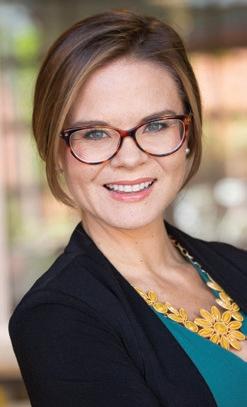
The Phillips Murrah law firm promoted Robert K. Campbell ’07 to Director.
Heather Devan ’08 was appointed as Circuit Court Commissioner for Kenosha County, WI.
Trevor Pemberton ’08 was appointed by Oklahoma Gov. Kevin Stitt as his new General Counsel.
The Practice Panther website named Jane Gekhman’s ’09 JMG Legal PLLC as the Law Firm of the Week.
Stuart R. Hene ’09 was elected to serve on the city council of the City of Tyler, TX.
2010s
Amy Montgomery ’10 joined Dentons Davis Brown as a real estate and business transactions lawyer.
Joshua M. Snavely ’10 joined the Data Privacy and Cybersecurity Group at McAfee & Taft law firm.
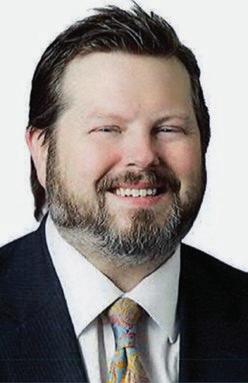
Marichelle Samples ’10 was hired by the city of Lewisville, TX as its new Director of Economic Development.
Kaitlyn Allen ’11 was appointed district judge for Oklahoma County.
Dustin E. Conner ’11 was named to serve a three-year term on the Oklahoma Bar Associ ation’s Board of Governors.
Jana Knott ’11 was named city attorney for the City of El Reno, OK.
Lawrence Pecan ’11 was appointed deputy general counsel for Two Roads Development, a South Florida-based development firm.
Barbara Klepper ’12 was named partner in the Tax Practice Group within the Corporate and Capital Markets Department at Brown Rudnick LLP.
Glenn Brown ’12 was named partner at Ball Morse Lowe, PLLC.
Kyle Cabelka ’13, district attorney for Comanche and Cotton counties, was a session presenter for Cameron University’s continuing education
event titled “Domestic Violence: Creating an Ethical Therapeutic Environment.”
Elizabeth Isaacs ’14 was named a share holder and director at Dunlap Codding. Isaacs is a member of the Alumni Association Board.
Cana Mize ’14 was named city attorney for Dewey, OK.
Jeff Sabin ’14 was appointed to serve as city attorney for the City of The Village, OK.
Allison C. McGrew ’14 was elected as a shareholder at the law firm McAfee & Taft.
Tami Hines ’14 was elected as a shareholder of the law firm Hall Estill. Hines also serves as adjunct professor at OCU Law.
Travis Weedn ’14 accepted a position as Policy Advisor and Legislative Liaison for the Oklahoma Corporation Commission. He was also named to the Journal Record’s 19th class of Achievers Under 40. Weedn is a member of the Alumni Association Board and is chair of the Mentoring Committee.
Joseph Pierce ’14 accepted a position as legislative attorney for the Oklahoma State Senate.
Chance Deaton ’14 joined Bass Law Firm in El Reno. Deaton is a member of the Alumni Association Board and is chair of the Student Engagement Committee.
Attorney David Hammer ’14 announced his candidacy for district attorney, District 23, which covers Lincoln and Pottawatomie counties.
Alyssa Novak Grooms ’15 accepted a position as IP Counsel at Pratt & Whitney, a subsidiary of Raytheon Technologies.
Taylor Reed ’16 was named to the National Black Lawyers Top 40 Under 40 for Texas.
Dr. Jacintha Webster ’16 was named the new pre-law advisor for East Central University in Ada, OK.
Aaron Chaloner ’16 joined Nashville-based Bradley Arant Boult Cummings LLP as a senior attorney in the Intellectual Property Practice Group.
Chad Brueckner ’17 was named to serve as trust officer in the Joplin, Missouri, region for Arvest Wealth Management.
Tasha Fridia ’17 was named to the American Express NGen Fellows program, part of the American Express Leadership Academy. Heritage Trust Company appointed Brooke Henderson ’17 as Vice President, and Relationship Manager in Oklahoma City.
Michael A. Dial ’17 joined the Hall Booth Smith law firm in Oklahoma City.
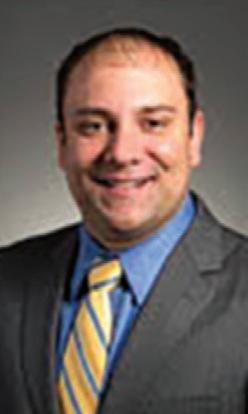
Victoria Tran ’17 joined the Office of Energy & Environment as senior counsel and policy advisor. She previously worked for the U.S. Environmental Protection Agency in Washington D.C. In April 2022, she was promoted to Deputy Secretary.
Emily E. Allan ’18 joined the Oklahoma City office of Doerner, Saunders, Daniel & Anderson, LLP.
ALUMNI NEWS 42 OKLAHOMA CITY UNIVERSITY SCHOOL OF LAW IN BRIEF
Aimee Majoue ’18 received the Journal Record’s Leadership in Law Award at the 2022 Oklahoma County Bar Association’s Law Day Luncheon.
Khaki A. Scrivner ’19 joined the Bell Nunnally firm in Dallas as an associate and member of its Corporate and Securities, Mergers and Acquisitions and Real Estate practices.
Brian Candelaria ’19 was selected to serve as Chairperson of the Access to Justice Committee of the Oklahoma Bar Association.
2020s
Madeline Sawyer ’20 was named assistant city attorney with the city of Edmond, OK.
Felix Neboh ’20 was honored as part of the Hometown Heroes Living the Dream panel during Odessa’s Black Cultural Council Juneteenth celebration.
Carolina Attaway ’20 received the Service of Excellence Award and The President's Volunteer Service Award for dedicating over 500 hours to community service in the past year.
JT Stevenson ’20 and Felix Neboh ’20 became Certified Contract Advisors for NFL players.
Thomas Grossnicklaus ’20 was elected as District 3 Representative to serve on the Board of Directors for the Oklahoma Bar Association, Young Lawyers Division (YLD), and was named to the Journal Record’s 19th class of Achievers Under 40.

Ben Frizzle ’20, 1st Lt., USMC, complet ed Naval Justice School in Newport, RI, in Novem ber 2021 and reported to Marine Corps Air Station Miramar in San Diego, CA, where he will begin his tour as a Legal Assistance Attorney.
Charlie DeWitt ’20 was named to the Journal Record’s 19th class of Achievers Under 40.
Joshua D. Hillard ’21 received the Melvin Combs Jr. Memorial Scholarship from the Oklahoma City Association of Black Lawyers in May 2021.
Littleton “Taz” Ellett ’21 joined the Oklahoma City office of Hall Estill.
Emma Kincade ’21 joined the Tulsa office of GableGotwals.
Please email your news to lawnews@okcu.edu with “Class Note” in the subject line. Be sure to include your graduation year. We welcome photos (high resolution) but due to space cannot guarantee publication.
David Spence Eldridge ’67 of Forest Park, Oklahoma
Nancy C. Gaines ’69 of Edmond, Oklahoma
Anthony (Tony) Wayne Speck ’72 of Newcastle, Oklahoma
Joe Edwards ’74 of Oklahoma City, Oklahoma
Robert Noel Sheets ’79 of Oklahoma City, Oklahoma
Deborah Jeane (McWhirter) Bruce ’87 of Del City, Oklahoma
James Marsh Reid ’88 of Edmond, Oklahoma
Joe Brian Hobbs ’94 of McKinney, Texas
LaDonna Fay Douglas ’96 of Oklahoma City, Oklahoma
Dr. Andrew Cooper John ’97 of Edmond, Oklahoma
Davina D. Burd ’99 of Scottsdale, Pennsylvania
Shelley L. Ewer ’06 of Sayre, Oklahoma
Melvin Combs, Jr.
Once in a great while, someone comes along whose innate altruism and goodness are so profound and consistent that even casual acquaintances are made better for having known him even briefly. The community-lifting spirit and enduring legacy of Melvin Combs Jr. (’72) is the story of one such person, whose multi-generational impact demands to be celebrated. He changed lives. Thousands of them.
Mention his name to people who knew him and the first thing they do is pause, smile and draw a deep breath, maybe chuckle a little, and launch into a lively story about him. Combs was a giant among men, a vision ary, a mentor, a giver and someone who was driven to raise the tide for the Black community, specifical ly by helping young lawyers. He did it all with grace, humility and a forthright style that was unmistakably his own. Almost to a letter, this is how people recollect Combs, how they frame their primary understanding of the man.
There is, of course, one exception. Melvin's daughter, Lori. She wholeheartedly agrees that Combs was all of those things and more. But she will tell you as tears pool gently in her eyes, that he was her dad. Her every thing. Her grief, still raw, causes her to pause and to
BY CHRISTINE EDDINGTON FREELANCE WRITER

ALUMNI NEWS
44 OKLAHOMA CITY UNIVERSITY SCHOOL OF LAW IN BRIEF
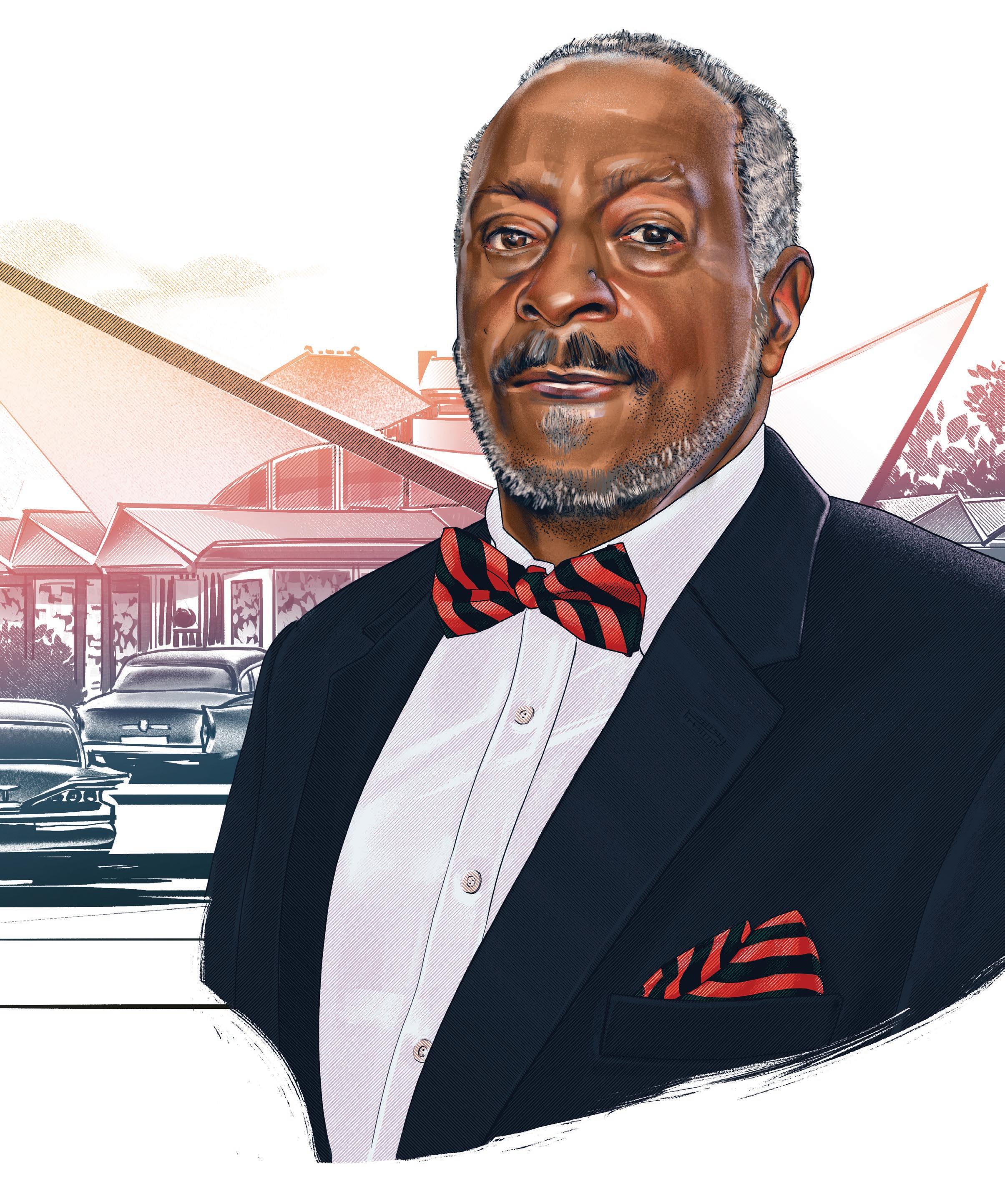 Portrait Illustration by WFlemming Illustration wflemmingillustration.myportfolio.com
Portrait Illustration by WFlemming Illustration wflemmingillustration.myportfolio.com
IN BRIEF OKLAHOMA CITY UNIVERSITY SCHOOL OF LAW 45
collect herself periodically as her memories become words. “He was the most wonderful person God ever created,” Lori Combs says. “Very loving. The one word I always think of when I think of him is disciplined.”
Her dad had a natural elegance about him, and was always put together, Lori recalls. His mother hailed from the Carolinas and carried herself with a kind of welcoming majesty. It was Mama Combs who almost certainly helped solidify Combs’ dedication to serving others any way he could.
“He was an only child. He was a mama's boy,” Lori Combs explains. “She was a very strong woman, well respected in the community.” She was the kind of per son who always had a pitcher of iced tea at the ready, would always offer you something to eat, and wel comed everyone into her home. “Everybody loved her, his friends, my friends, the community.”
Before Combs was a lawyer, he was a pharmacist, working in the 1960s and 1970s at the former Hump ty Dumpty at NE 20th and Martin Luther King Blvd. in Oklahoma City. Even then, he was a natural leader, someone who never forgot a name or a face. “Anyone he ever met, he stayed connected to,” Lori says.
Combs attended OCU Law, graduating in 1972. He did not pass the bar on his first attempt, and that experience spurred action in him. This led him to become a man who offered no-cost bar prep tutoring to more than a hundred young, Black law students in the law library of his firm, Combs Hogue & Combs, which was also the first in tegrated law firm in Oklahoma City.
Stanley Evans, now retired as dean of students at the University of Oklahoma College of Law, was the first Black dean at any law school in Oklahoma, a position he began immediately upon his graduation in 2003. Evans underscores the significance of Combs’ work within the Black community.
“He's a person that's made Oklahoma better, just by the way that he's made us rise up. What Melvin was about, what I'm about, is the fact that one attorney is fine. Ten attorneys with the same focus and the same spirit is better. A hundred is even better. So his focus really was on working with young ones to get them to move forward,” Evans says.
Evans’ own work in recruiting young Black people to go to law school was directly influenced by a trio of men, including Combs. “He was one of several Black lawyers who became known as ‘The Godfathers.’” Evans ex plains. “When I think about Melvin Combs, Dan Davis, and John Green, the model that I am right now, is the same model that they gave me when I first got here.”
It was especially important that Combs himself had struggled with the bar. “We always want a superstar to help you do something. But I believe that sometimes it's not the superstar that you want to go to if you're
the one who's struggling. You want to go through somebody that's also struggled and successfully over come the struggle. That's what Melvin brought to the table. Because he had done it. And he had failed, then he continued, and he finally succeeded. He was best equipped to talk to people about how to prepare for the bar exam.”
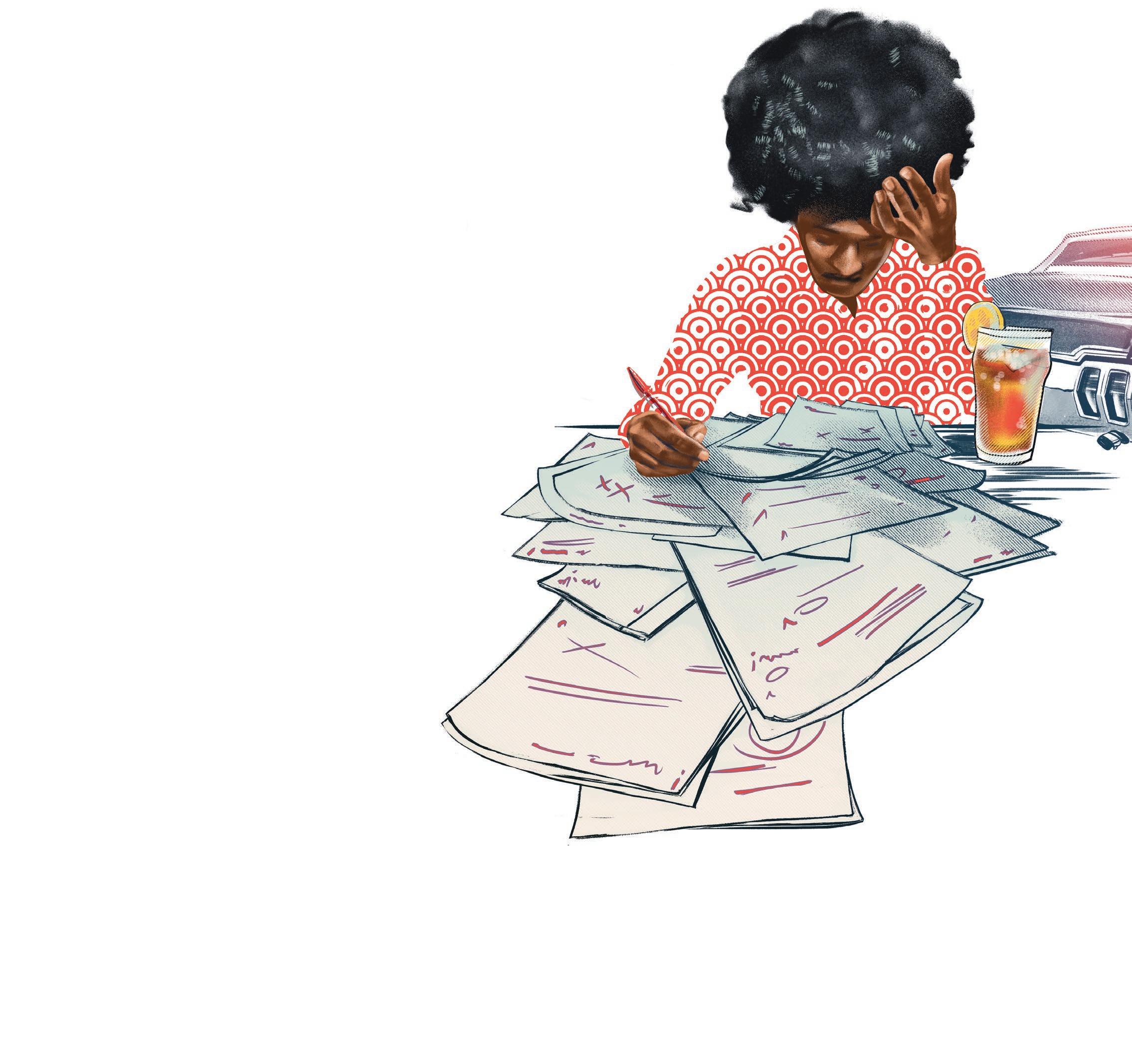
Evans’ overarching impression of Combs mirrors most people's. “The first thing that comes to me is this guy that's always growling at people, but at the same time, he's growling because he wants you to raise yourself up. He's not ever truly satisfied. Because he wants you to be your best self. And if he sees you tak ing a shortcut and not being your best self, he's going to growl at you and say something about it.”
Judge Lydia Green (’03) met Combs through the Black Law Student Association (BLSA) at OCU Law. Prior to being appointed to the bench, Judge Green was in private practice with a focus primarily in the ar eas of family law, juvenile law, and criminal defense. Si multaneously, she served as the staff attorney for the Metropolitan Fair Housing Council of Oklahoma Inc., with an emphasis on civil rights discrimination.
ALUMNI NEWS 46 OKLAHOMA CITY UNIVERSITY SCHOOL OF LAW IN BRIEF
by WFlemming
“Mr. Combs actually helped me with the bar,” she says. Without his help, she says, frankly, “I would not have made it.” Combs helped by breaking her test-taking approach into a series of tactical maneuvers, a very different approach than BARBRI and other prep courses. “He told us ‘This is what they're looking for. Been there, done that.’ He just told you that you have to remember you have one person reading all of these essays. How many essays are they reading? They're tired. They don't need all this fluffy writing. Get to the facts.”

His markups of practice answers and verbal feedback have become the stuff of legend. To say that his vernacular was colorful is a vast un derstatement. His elegant bearing, tough love ap proach, and affinity to deploy ribald blue language, scrawled in swaths of red pen across students’ prac tice essays as a method of critique, made him a be loved, although intimidating, teacher.
Oklahoma District Court Judge Aletia Timmons re members his tutelage this way. “He used to prep law yers who couldn’t afford bar prep. He did this, on his own and with no expectation of recognition, for 30 years. His cursing was inspired. He would straight curse you out. But you’d take it because it came with so much wisdom.”
Beyond the nuts and bolts of passing the bar, Combs also understood that Black law students’ person al experiences could be hard. “He always wanted to make sure that all the young people, more specifically, those of color, got through this process. Sometimes we needed a little bit more care and direction. And he was adamant in making sure we got what we need ed. He was always available for us to ask questions,” Judge Green says.
Getting young Black lawyers through the bar was one passion for Combs; another was helping to teach members of the community how to pass wealth down to the next generation. His practice centered around probate, wills, and trusts.
Combs got Evans involved in this work too. “The oth er thing that he brought to me later on as I was start ing to work within the community in Oklahoma City, was getting involved with Reverend Lee Cooper and creating a project that we call ‘Make a Will.’ Within the African American community, there are very, very few people that know how to pass wealth from one gener ation to the next. Melvin became one of the leaders in this project, as well. He worked within his church to make sure that the people in his church took advan tage of the resources we had, and he would always come to our ‘Make a Will’ sessions, to work with the clients to make sure that they walked away with the product they needed to move forward.”
Evans continues. “Then, he brought law students into these things. Something Melvin felt very strongly about, and I feel very strongly about too, is that these lawyers that we're producing, they have to under stand their role as community leaders, and we want to build that spirit with them too. And Melvin was very, very strong about that. In fact, sometimes he would come to me and say, ‘Brother stand up. We need to do such and such. We need to get these lawyers to be thinking this way.’”
Lori Combs’ drive to serve her community is as strong as her father’s. Maybe stronger. Her law practice is winding down, and she’s turned her focus to direct service. She founded and runs the Northeast Oklaho ma City Community and Cultural Center in Oklahoma City where she feeds, clothes and offers fellowship to anyone with a need, generally 500-700 each week. “We serve free meals seven days a week. We have free clothing…It's just a happy place.”
Sitting at a table, surrounded by heaps of donated clothing in a room with children’s artwork festooning the walls, Lori tells about her father’s last days. He’d overheard the hospice nurses. “I know he heard them. And they said he wasn't going to make it through the holidays. So a few days before Christmas he decided to throw a party. He was bedridden, but he threw a party,” she says.
It was Christmastime. People came over, food was served, the season was celebrated and around 9:30 or 10 o'clock he said it was time for his guests to head for home. Christmas Day came and went. That evening, Lori was sleeping by her father’s bedside and, “When I woke up it was about ten till midnight on Christmas Day. He would not pass away on Christmas Day. He refused,” she says. Melvin Combs Jr. passed away shortly after midnight, on the morning of December 26th, 2020.
The impact of Melvin Combs, Jr. continues to be seen and felt. In 2014, Combs was the recipient of the Okla homa Bar Association (OBA) Trailblazer Award for making a profound impact on the legal profession by paving the way for more Black law students to pass the bar exam.
The Oklahoma City Association of Black Lawyers (ABL) awarded the Melvin Combs Jr. Memorial Schol arship on May 4, 2021, to three third-year law stu dents. Each recipient received scholarship funds to assist with expenses related to taking the bar exam in Oklahoma.
While Combs is no longer able to provide hands-on tu telage in passing the bar exam, the award in his name ensures that his legacy, s well as his passion to assist bar studiers, continues to live on.
Illustrations
Illustration wflemmingillustration.myportfolio.com IN BRIEF OKLAHOMA CITY UNIVERSITY SCHOOL OF LAW 47
BY CHRISTINE EDDINGTON
FREELANCE WRITER
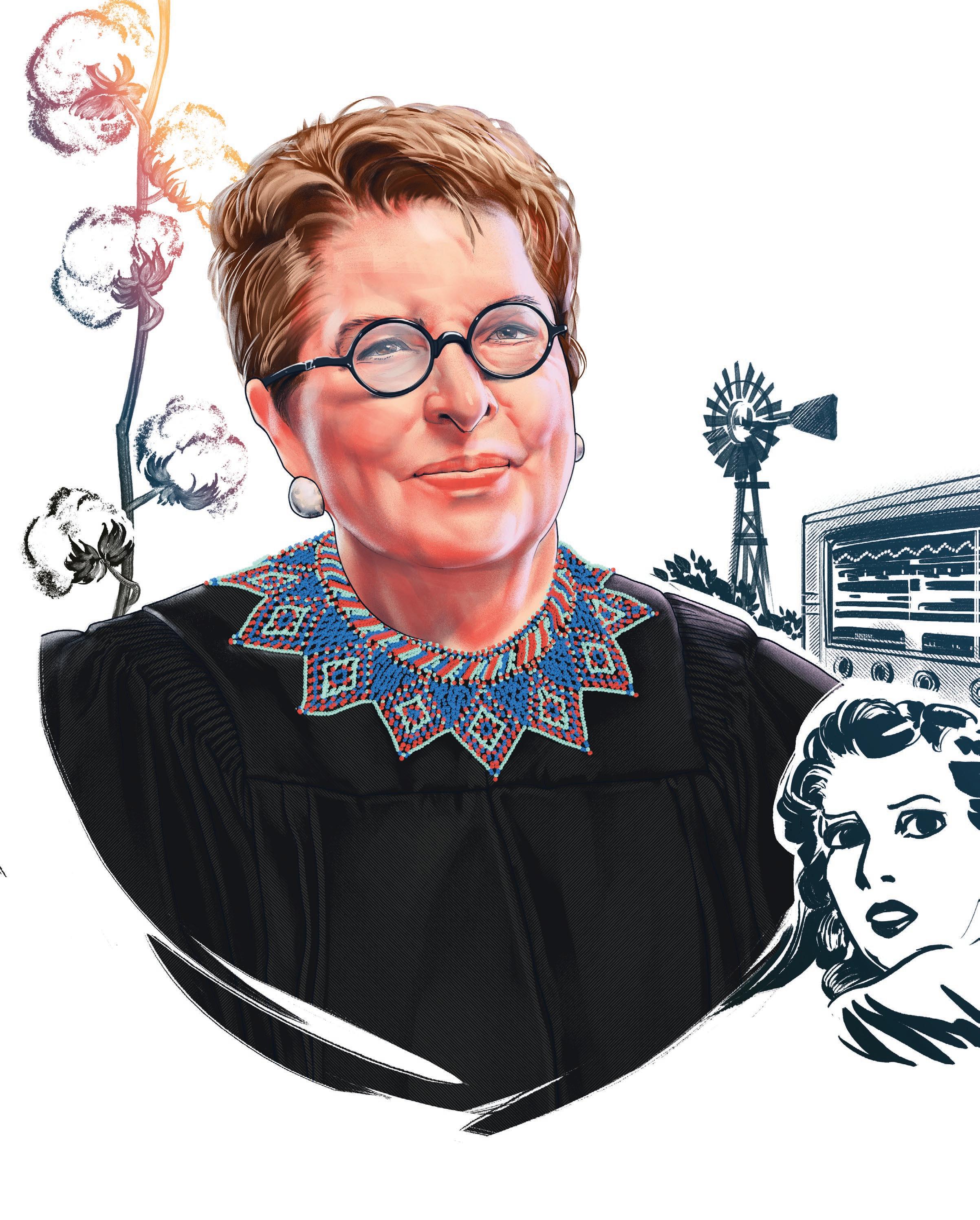 Portrait Illustration by WFlemming Illustrationwflemmingillustration.myportfolio.com
Portrait Illustration by WFlemming Illustrationwflemmingillustration.myportfolio.com
48 OKLAHOMA CITY UNIVERSITY SCHOOL OF LAW IN BRIEF
Yvonne Kauger
Oklahoma Supreme Court Justice Yvonne Kauger ’69, is a fourth-generation Oklahoman from Colony, Oklahoma, who counts Portia Blake and Nancy Drew among those who inspired her to become a lawyer. As a girl growing up in Washita County, when she wasn’t in school or in the cotton patch, she was playing basketball, reading Nancy Drew mysteries and listening to Portia Faces Life, a radio show whose namesake protagonist was a plucky widowed attorney raising her son while fighting crime and corruption in her small hometown.
The grueling reality of the cotton patch inspired her, too. She explains: “It’s like my then-representative when I was appointed to the court said, ‘There’s noth ing like the cotton patch to give you ambition.’ And that was right.” Her love for her hometown has never waned, though. More about that later.

As Kauger explained in an interview conducted as part of Oklahoma State University’s Oral History Project, “I was a daddy’s girl, he took me with him ev erywhere he went, including (which OSHA would die about now) he built a little box to take me on his trac tor when I was 18 months old.” The family moved to El Reno for a stint, while Kauger’s beloved father fought in World War II, and she was thrilled when they re turned to Colony.
Part of her excitement was due to the fact that El Reno schools didn’t offer girls’ sports at that time and Kauger, a warrior on the court, lived and breathed
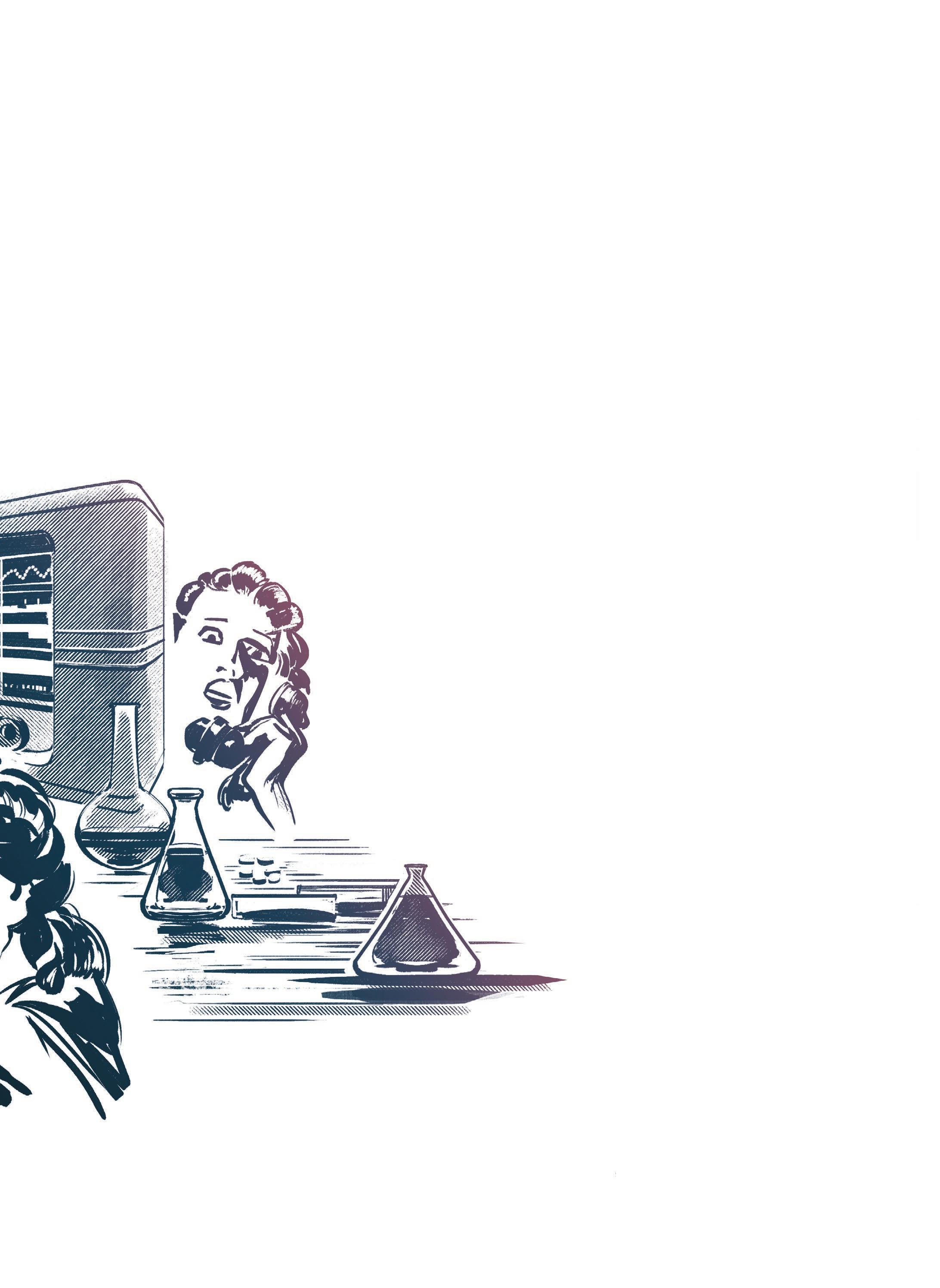
JUSTICE
basketball along with everyone else in Colony. Her dad helped her with her shooting game, taking her to the gym to hone her craft. “I was not good at shooting one handed but I was very good with two and I was a long shot artist before three points were awarded for it. And we played half court.”
Kauger graduated at the top of Colony High School’s class of 1955, serving as co-valedictorian. “I love be ing introduced as the valedictorian of my high school class and then I tell them there were seven of us, and actually I was co-valedictorian.” At this, Kauger’s eyes twinkle behind her stylish glasses.
The minute Kauger got her driver's license she be gan working for a lawyer in Cordell, Oklahoma, during summer break, before cotton picking season began. He had been a classmate of Kauger’s mother. There, she met the lawyer working down the hall, J.T. Bailey, who became Kauger’s career advisor. “He told me I certainly should go to law school.” Kauger says. Soon, the universe again nudged Kauger in the direction of the practice of law. She had taken shorthand in high school, and one summer, while working for her family, Kauger was asked to fill in as a transcription reporter in the courthouse. “They didn't have a shorthand re porter for a case, and they agreed that I could take the transcript for the case. I can still write shorthand as fast as I ever could. I can't read it anymore.”
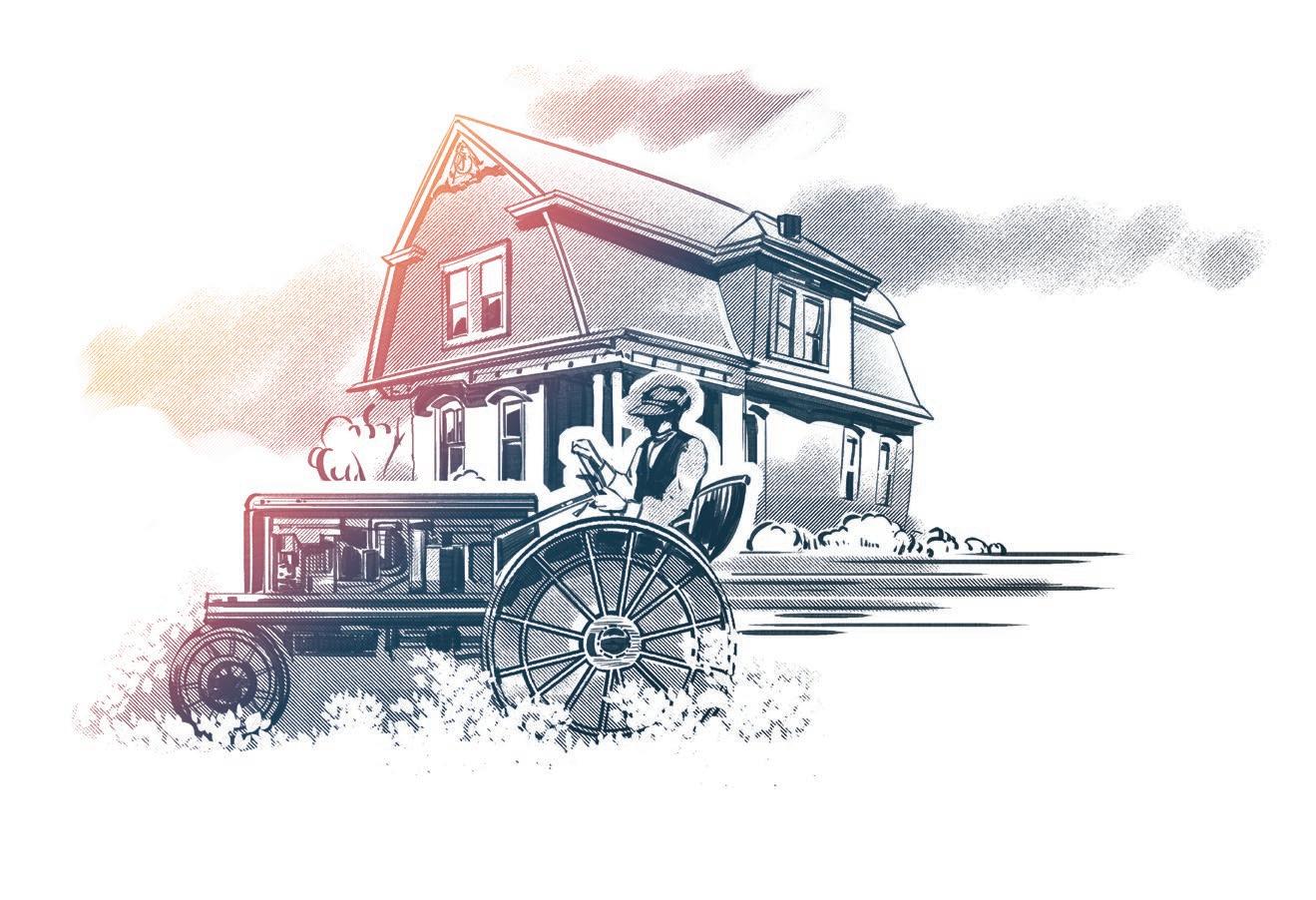
From Colony High, Kauger’s academic career took her to Southwestern Oklahoma State University (SWOSU), where she studied in biology and chemis try, minoring in English and earning a teaching cer tificate. She did it all in three years and began work ing as a medical tech at Oklahoma City’s St. Anthony Hospital.
Why would someone who’d wanted to be a lawyer her whole life switch gears and embark on a medical career? It was all part of the game plan; remember, Kauger is a long-shot artist. She had every intention of going to law school but “I needed a trade to pay for it,” she says. “So I worked at Medical Arts Lab in the daytime and I went to law school at night.”
OCU’s night program allowed her to realize her dream. “I started in ’65 and graduated in ’69,” she says. Her class broke a record for the number of wom en enrolled, which in years past had hovered at one or two. “That year they admitted eleven or twelve oth ers, and they called us the petticoat class.” Did the sil ly nickname bother her? Again, there’s a subtle twin kle. “Well, the top three in our class were women,” she says. Kauger graduated first in the class.
In a 2020 interview in The Oklahoman, Kauger reflect ed on her time at OCU. The law school “had wonderful professors. Wayne Quinlan, they now have the Quin lan Constitutional Law lectures.... He made learning exciting and fun. He had a joke or a story that fit every facet of the law along the way."
Justice Marian Opala, who graduated from OCU Law in 1953 and served as a supreme court justice for the State of Oklahoma from 1978-2010, during which time they were colleagues, was one "colorful professor,... and I had him for many courses. We had professors... actually practicing law downtown. Jack Sheehan for the uniform commercial code. Abe Erdberg for corpo rations.... Judge David Cook, my evidence teacher, was wonderful. It was a fun time.”
As her law school years came to a close, Kauger found herself with career decisions to make. Her daughter, Jonna Kauger Kirschner (now an American attorney and a British solicitor and president of Chickasaw Na tion Industries Manufacturing LLC), was in elemen tary school when her mother graduated. Kauger was asked by Judge A.P. Murrah to be his law clerk, but “I couldn’t do it because I had to drive carpool and could only work half days. G.T. Blankenship offered me a job as member of his staff in the Attorney General’s office. Senator Cleeta John Rogers was a good friend of one of Kauger’s professors and, undeterred by her parental responsibilities, offered her a job. “So I worked for him for two and a half years at a law firm called Rogers Tra vis and Jordan. Rex Travis is a wonderful lawyer and has just retired this year,” she says.
Then a seemingly unremarkable moment, which had occurred during her 1L year, came into play, one of those moments that turned out to be pivotal. “I was invited to a party that OCU gave at the Beacon Club and several members of the of the Oklahoma Supreme Court attended and Justice Ralph Hodges was one of them. And after that, our families became friends. And so, after I'd worked for Senator Rogers, for two and a half years, Justice Hodges came and asked me if I would like to come and be his staff lawyer.”
Kauger laughs a little as she recalls, “He said he was hesitant to offer me the job because he had previously had terrible luck with his staff lawyers. One of them got a brain tumor, one got into a motorcycle wreck, and an other had a heart attack.” But she took the job, and on September 6, 2022, Kauger marked her 50th year as an employee of the Court. She was the first woman staff lawyer at the Oklahoma Supreme Court. “I don’t even feel 50, I don’t know how it could have been 50 years.”
ALUMNI NEWS 50 OKLAHOMA CITY UNIVERSITY SCHOOL OF LAW IN BRIEF
She worked for Justice Hodges for eleven and a half years before becoming the second woman appointed to the Oklahoma Supreme Court herself, by Governor George Nigh, who had also appointed the high court’s first female justice, Alma Wilson. Before Kauger’s ap pointment, she had thought about the possibility of becoming a justice, but she felt the odds weren’t in her favor after Nigh appointed Wilson, because she (and others) suspected that he would not appoint two women in a row. Justice Pat Irwin, from Kauger’s dis trict resigned to become a federal magistrate judge, and she applied to the court. “One of my friends, a district judge, came up to me and said, “Hey kid, you aren’t going to get it.” I said, “Oh well really Judge, why not?” And he said, “The governors already had his woman and you’re just not going to get it.” I had on my power shoes, and I patted him on the shoulder and I said, “Don’t you worry about it, Judge. Sometimes the best man for a job is a wo-man.”
She was sworn in on March 22, 1984. “When the gov ernor appointed me to the court, I called Daddy and said ‘Well, Daddy I can still hit the long shot.’” Kauger served as Chief Justice from 1997 to 1998 and from 2007 to 2008. As she told the OSU historians, “My daddy had always told me I could do anything I wanted to do and be anything I wanted to be. And my mother always said I better do it right.”
In 1986, Oklahoma’s Chief Justice John B. Doolin ap pointed Kauger, an honorary member of the Chey enne and Arapaho Tribes, to establish and coordi nate the Sovereignty Symposium, to provide a forum in which ideas concerning common legal issues can be exchanged in a scholarly, non-adversarial environ ment. It has become a respected annual event with an array of panels and public discussions on Indigenous affairs and state relations. It’s the largest Indian Law seminar in the United States.
“Chief Justice Doolin had been going to the National Conference of Chief Justices…he had been to three and he came back and said, ‘They keep talking about having a conference on Indian law.’ And he said they're never going to do it…so you just do it. This will be our 34th year.”
Arguably the most enduring (non-law) project Kauger has tackled is the acquisition of the Judicial Center, 2100 N. Lincoln, Oklahoma City (formerly the Okla homa History Center), and the curation of its vast, world-class art collection, much of it Native Amer ican. Kauger swears it was her oatmeal cookies that netted the Court its beautiful, permanent home just a block or so southeast of the State Capitol.
“I just nagged everyone for years. It took 30, and three bond issues. But my secret weapon was a recipe,” she says. At Colony High School, home eco nomics classes were often substituted for science classes. “I got

this recipe for oatmeal crispy cookies. And I made oatmeal crispy cookies for every meeting of the Ap propriations Committee.” Kauger jokingly says the Judicial Center building isn't really built out of mortar and limestone. It's built out of cookie dough. She also had some help from folks like Cal Hobson, Stratton Taylor, and Bob Blackburn, to name a few.
The building was soon filled with art, more than sev enty pieces, many from heavy hitters in Oklahoma’s current and past arts scene. “I had my eye on the collection at the History Center from the time Blake Wade was there and I knew that they had some really nice stuff, and Art in Public Places requires 1% for art, so we spent a third of the money on restoring the Vet erans Memorial,” Kauger says.
Kauger has owned an art gallery in Colony, The Gal lery of the Plains, since 1981 and has been steadily filling her hometown with art. “We are the mural capital of the world per capita,” she says of Colony, where she keeps a home, and where the buildings are graced with works by artist Patrick Riley.
“They're not merely murals, they are fine art, all of them, in an outdoor gallery.”

Kauger's great grandfather, Fred Kauger, arrived in Colony (one of the old est towns in West ern Oklahoma) in the 1890s and developed the business district on Main Street in the 1920s. To day, thanks to a collaboration between the Justice and Colony’s mayor, Lonnie Yearwood, a retired CPA who spent much of his career in Oklahoma City, the Colony Mu seum now occupies the restored Fred Kauger Build ing, 105 E. Seger Street, which was built by Fred Kauger in 1924.
At 85, Kauger shows precisely zero sign of slowing down. She’s vibrant, sharp and says she’s pretty darn happy doing what she’s doing.
Illustrations by WFlemming Illustration wflemmingillustration.myportfolio.com
OCU School of Law Alumni Awards Dinner
April 22, 2022 • Oklahoma City Golf & Country Club
Emceed by OKC’s Mayor David Holt ’09
OCU Law alumni
many contributions within the legal community. We believe
award winners will continue the legacy of excellence in their legal communities and beyond.
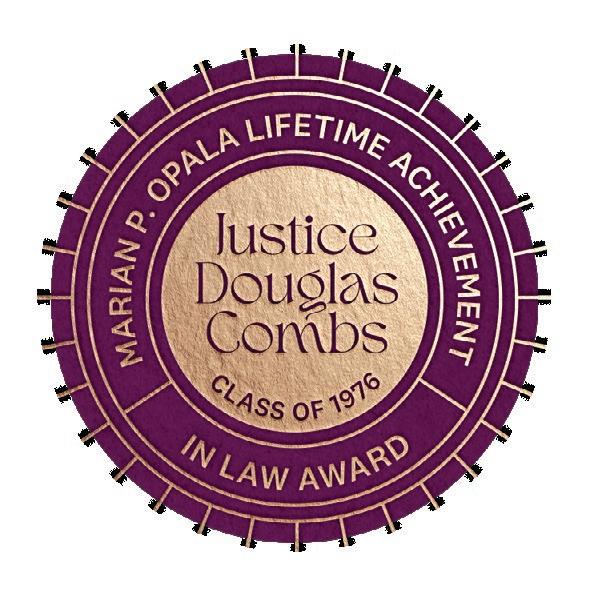
Susan Carns Curtiss is a plaintiffs’ trial attorney in Oklahoma City. Her work as a trial attorney began with Farmers Insurance Company, followed by several years working for a large plaintiffs’ firm. She started her solo firm in 2014, Carns Curtiss Law, PLLC, where her work is devoted primarily to resolu tion and litigation of personal injury and wrongful death claims that are motor vehicle related.
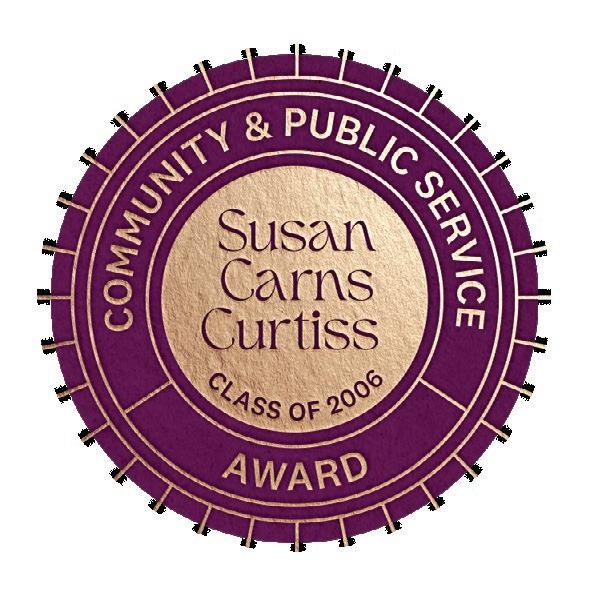
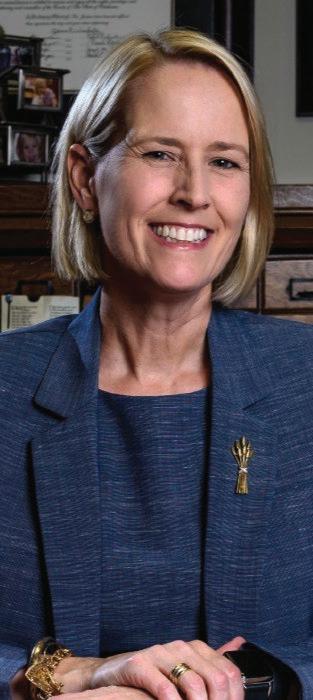
Susan’s experiences in the profession, specifically related to the small percentage of women in litiga tion, led her to look for, and then create an online “place” for women in the profession to gather. Her passion for the empowerment of women attorneys led her to create GIRL ATTORNEY®, a business devoted to facilitating community for women attorneys, with the purpose of helping level the “playing field” for women in the practice of law. Since its inception in 2016, through the GIRL ATTORNEY® blog, directory, newsletter, and primarily through the state-specific and national Facebook groups, this community has or ganically grown to over 32,000 female attorneys across the U.S.
Susan is an active member of the state and local Bar Associations, a member of the American Association for Justice, the Oklahoma Association for Justice, is a graduate of the Trial Lawyers’ College, and has earned honors from her colleagues including those awarded from SuperLawyer, Litigation Counsel of America (FEL LOW), 405 Top Attorneys, and Martindale-Hubble.
A native of Shawnee, OK, and a member of the Muscogee Creek Nation, Combs received his bachelor’s degree in Political Science from the University of Oklahoma in 1973. While in law school, Combs worked as a Deputy Court Clerk for the Oklahoma Supreme Court. Following admission to the Oklahoma Bar Association, Combs served as an Assistant Attorney General for the State of Oklahoma under Attorney General Larry Derryberry. In 1977, he returned to his hometown and entered private practice as an as sociate with the firm of Henry, West & Sill. Combs remained in private practice as an associate and then a partner in the firm until 1982, when he opened his own law office in Shawnee.
Combs began his judicial career in 1995 as a Special Judge for the 23rd Judicial District, serving both Pottawatomie and Lincoln Counties. In 2002, he began serving as District Judge for the 23rd Judicial District, being elected to that post twice without opposition. While serving as a special judge, Combs was responsible for the establishment of the first Drug Court in the 23rd Judicial District—a docket over which he presided as both special judge and district judge until his appointment to the Supreme Court. Combs also served as Chief Judge of the 23rd Judicial District and as Presiding Judge of the North Central Judicial Administrative District, which encompasses Kay, Lincoln, Logan, Noble, Payne, and Pottawatomie Counties. He was active in the Oklahoma Judicial Conference, serving on the Ex ecutive Board as both a Special Judge and District Judge. Combs also served as a member of the Oklahoma Court on the Judiciary, Trial Division, while he was a district judge. He served as Pres ident of the Judicial Conference in 2009 and has been a member of the legislative committee for more than 15 years.
On January 1, 2011, Governor Brad Henry appointed Combs to serve as Supreme Court Justice for District 8. He served as the Vice Chief Justice of the Oklahoma Supreme Court from 2015 to 2016 and as Chief Justice of the Oklahoma Supreme Court from December 2016 through December 2018. During a portion of his tenure as justice, Combs also served as a member of the Oklahoma Court on the Judiciary, Appellate Division.

ALUMNI NEWS
Presenting Sponsors: DeWitt, Paruolo & Meek • Polston Tax Resolution & Accounting Table Sponsors: Dunlap Codding • Fuller Tubb Bickford Warmington & Panach • Fulmer Sill GableGotwals • Gungoll, Jackson, Box & Devoll • Heidi Slinkard Johnson Hanan Vosler Hawthorne & Snider • Mazaheri Law • Ogletree Deakins Phillips Murrah P.C. • Sweet Law • Stump Immigration
Honoring
and their
these
Born in Oklahoma City to parents who are both physicians from Kashmir, India, for Naureen Hubbard it was natural that she developed a passion for medicine, the law, and defending healthcare providers and entities.
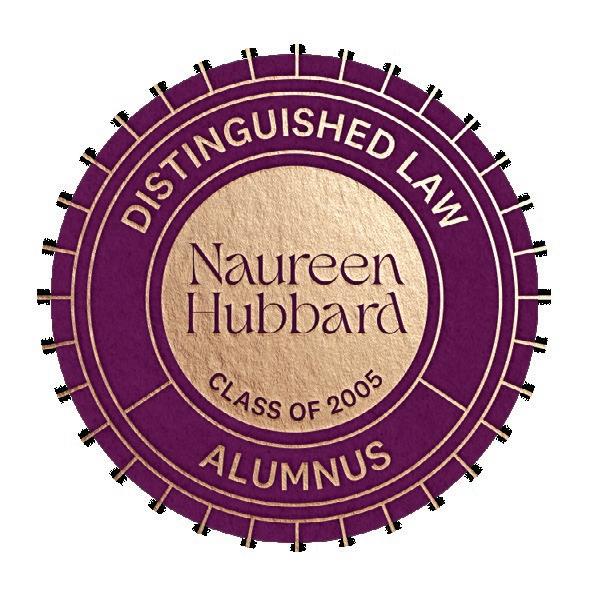
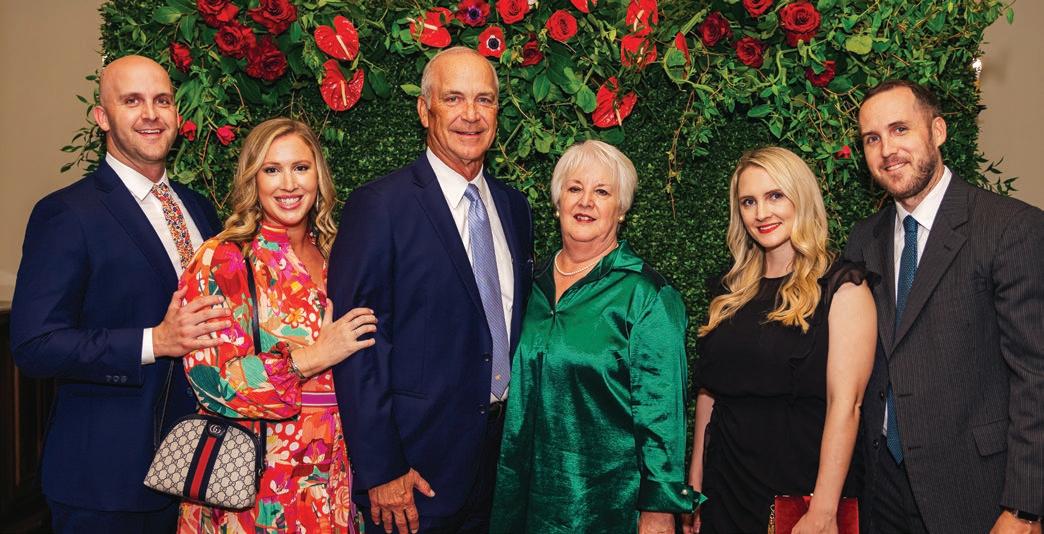
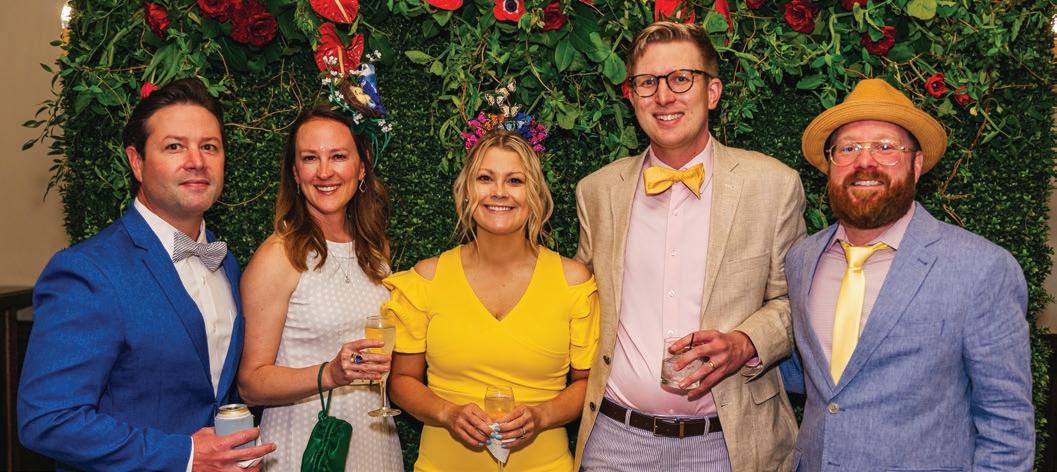

While in law school and after graduation, she specialized in medical malpractice defense. She spent eight years practicing general insurance defense before transitioning back into medical malpractice defense as a partner at Sweet Law Firm in Oklahoma City. She has tried numerous civil cases throughout the State of Oklahoma and was named a Super Lawyers Rising Star since 2015.
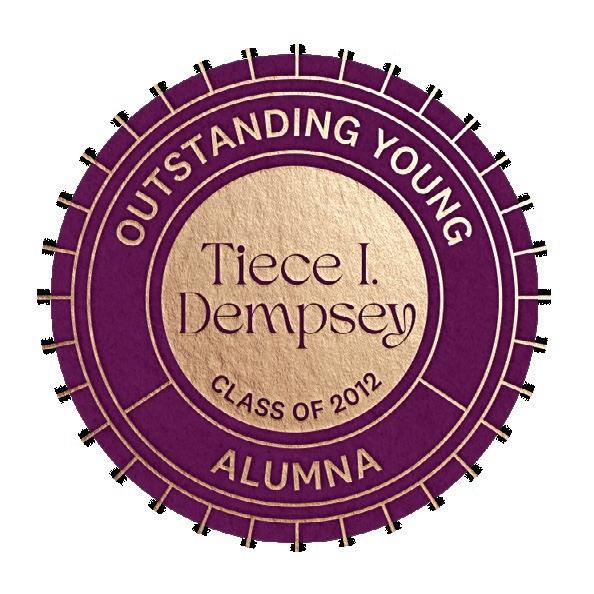
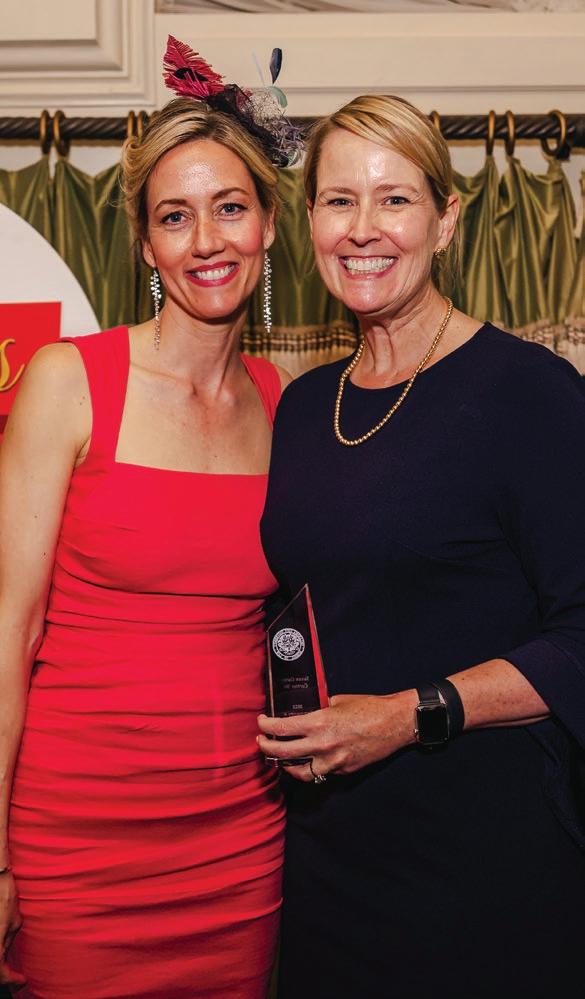
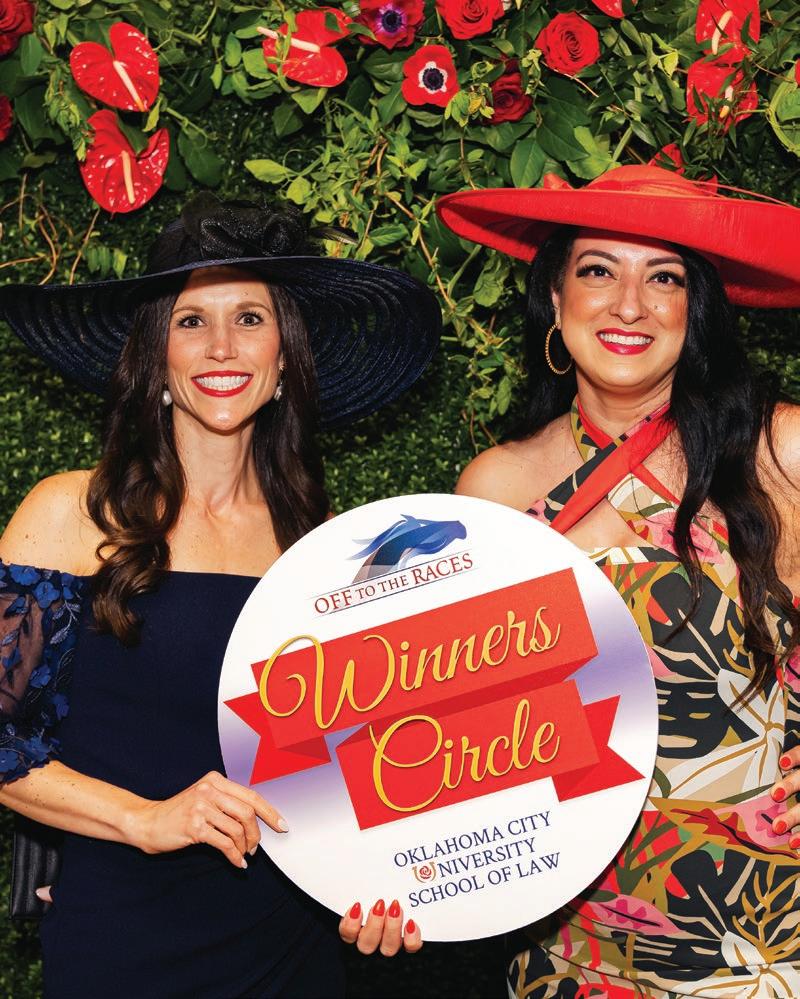
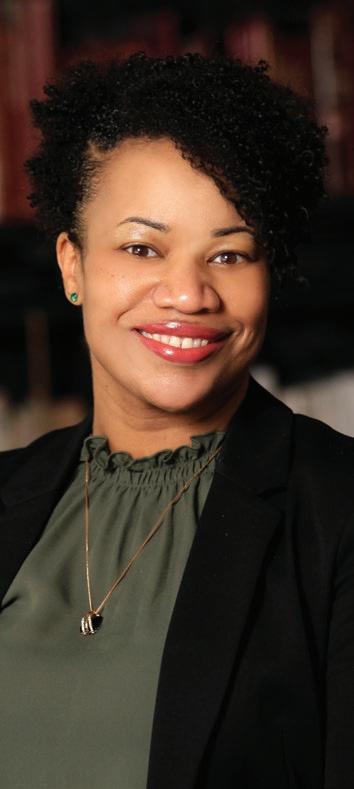
Naureen is a member of the Oklahoma Bar Association and is admitted to prac tice before the United States District Courts for the Northern, Eastern, and Western Districts of Oklahoma. She is the President of the Robert J. Turner Inn of Court, an association of federal and state judges, master lawyers, less expe rienced lawyers, students, and law professors modeled after the English Inns of Court who together constitute a chapter of the national American Inns.
Tiece Dempsey serves as the Criminal Justice Act Resource Counsel for the Office of the Federal Public Defender in the Western District of Oklahoma. In this role, she secures appointments and assists the Federal Public Defender Office and CJA court-appointed attorneys in representing indigent defendants. Before her current position, Tiece worked as a policy analyst with the Oklahoma Policy Institute before accepting a judicial law clerk position with the Honorable Vicki Miles-LaGrange, Retired Senior Judge of the United States District Court in the Western District of Oklahoma.
Tiece earned a bachelor’s degree in General Business from Oklahoma State University and a master’s degree in Health Administration from the University of Oklahoma. In addition to her professional work, Tiece is actively involved in several professional, civic, and social organizations. She is the current pres ident of Alpha Kappa Alpha Sorority, Inc. Sigma Sigma Omega Chapter. Further, she is the immediate past chair of the Oklahoma Bar Association Diversity Committee and the immediate past president of the Oklahoma City Association of Black Lawyers. Tiece also serves as a trustee for the Oklahoma Bar Foundation, a member of the Board of Directors of the Oklahoma City Black Chamber of Commerce, and a member of Leadership Oklahoma City Signature Program Class 38.
Phillips Murrah P.C. is a commercial law firm with offices in Oklahoma City and Dallas, providing integrated business and litigation strat egies to a diverse base of industry-leading clients. The firm was founded in 1986 with one guiding vision: Empower clients with the fresh insight, unique perspective and strategic legal counsel nec essary to achieve and maintain a competitive edge.
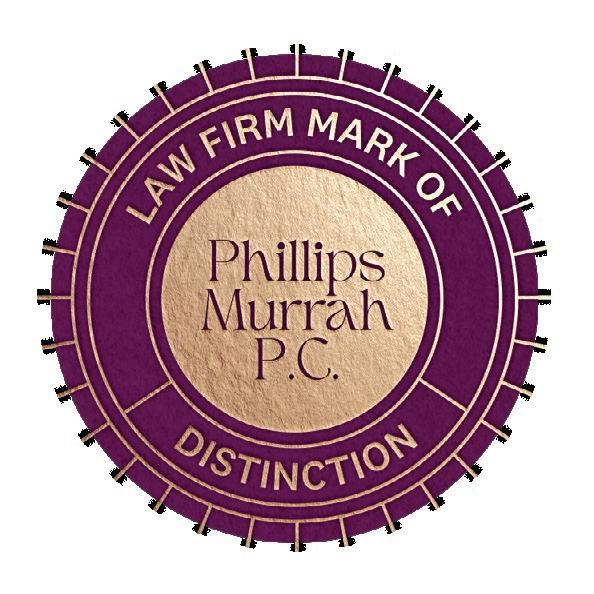
The Oklahoma City University School of Law Alumni Association has been hard at work in its aim to deliver engaging and meaningful connections with current students and alumni.
The purpose of the Association, which was relaunched in 2018, is to promote the general welfare and effectiveness of OCU Law through strengthening the ties between former students of the school, stimulating the interest and activity of the alumni of the school, preserving and furthering the mission of the school, and participating in further development of the school.

If you graduated from OCU Law and are not a member, we encourage you to join!
Your membership, which begins at $100 per year, allows the Alumni Association to deliver student-centered programs implemented by dedicated board members and volunteers and law school staff. The Association encourages and supports students during their final exams and bar exam studies, provides scholarships, connects enrolled students with mentors from the legal community, delivers our CLE program, and plans the annual Alumni Awards.
Members receive free, high-quality, monthly CLE organized by the Alumni Association and discounts to other OCU Law events. Members also receive discounts at partner businesses, and the list continues to grow.
This school year brought some much-missed in-person interaction with the students which included an Orientation Reception for incoming 1Ls hosted by the Alumni Association at Dunlap Codding, P.C., finals and Bar exam hospitality, which included coffee, snacks, inspirational notes, and a gift card scavenger hunt. After receiving the idea from the Black Law Student Association, the Alumni Association presented the firstever book grants to deserving students.
The Alumni Association Awards dinner occurred in April where two-years’ worth of honorees were recognized and celebrated at a lively and sold-out gala at the Oklahoma City Golf and Country Club. Attendees were encouraged to dress in Kentucky Derby attire and enjoyed a long-awaited opportunity to come together to celebrate leaders in our legal community. OCU Law’s own Oklahoma City Mayor David Holt (’09) was the emcee and he kept the audience in good spirits with his humor.
It has been a productive and meaningful year for the Alumni Association, and I want to recognize and thank the dedicated alumni who commit their time and talents to the success of OCU Law. If you are interested in joining these efforts, please contact me at 405-206-9575 or lindsey@anewenergylaw.com.
Lindsey Pever ’18 Chair, Oklahoma City University School Law Alumni Association Attorney, A New Energy
ALUMNI NEWS
Arly
alumni profiles

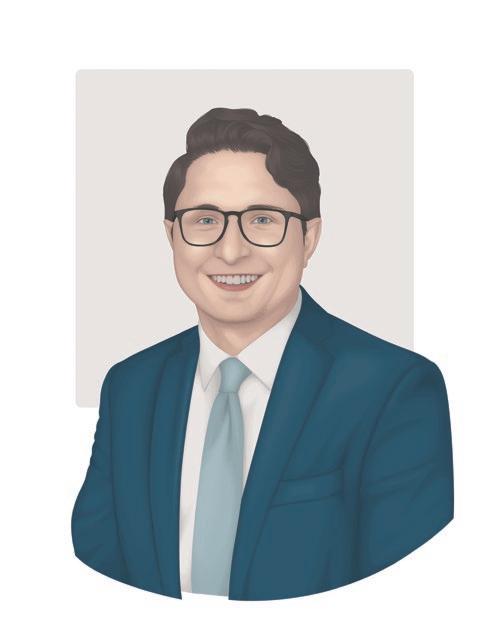
Janie Simms Hipp
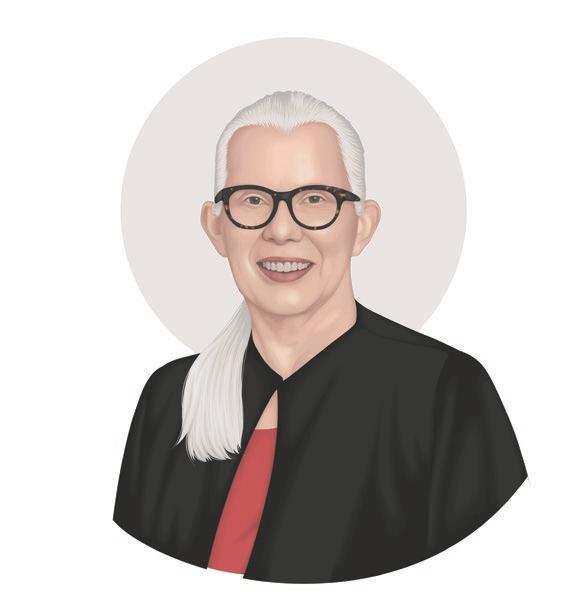
CLASS of 1984
Thomas Lee Grossnicklaus
CLASS of 2020
Jessica Sherrill
CLASS of 2006
Sunil Isaac
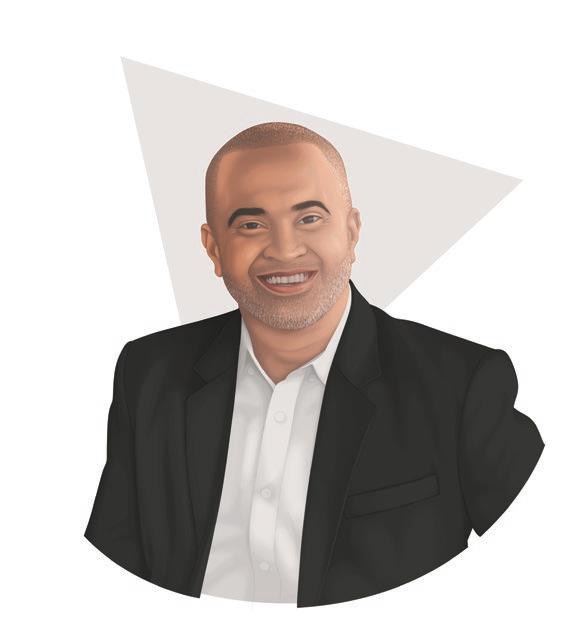
CLASS of 2013
The ranks of distinguished OCU Law alumni are over 7,000 strong. In the United States and nations around the world, alumni leverage their expertise practicing law, leading corporations, teaching, governing, advocating, developing legal theory, crafting policy, and engaging with their communities. Read the reflections of four of our alumni and the difference they are making.
Portrait Illustration by
OKLAHOMA CITY UNIVERSITY SCHOOL of LAW
Yuschav
IN BRIEF OKLAHOMA CITY UNIVERSITY SCHOOL OF LAW 55
Janie Simms Hipp
Was there a particular experience or person that guided you to a career in the legal field?
I have shared with many folks in many public settings that I went to law school on a dare! I was headed to wards a path in public administration but the lawyer for our agency “dared” me to go to law school. I had never considered a career in the legal arena(s), but he was my supervisor at the time, and I thought “maybe he has something…!” So, I took the LSAT on a dare, applied to law school on a dare, and here you go…
Describe your work. What is a regular day like?
Packed with meetings back-to-back, usually in halfhour increments. Jumping from meetings with my various agency clients, the front office, the depart ment leadership, and other lawyers in the federal gov ernment. But each of the jobs I have held as a lawyer have a different cadence and feel.
What do you enjoy most about your job?
The people. Always the people. Right now I am working with extremely committed and capable and brilliant public lawyers who have dedicated their careers to ad vising the government on matters involving agriculture and food and all sorts of related issues. But I have held other positions where the people I worked with every day were law professors and law students. In other positions, it was farmers and ranchers (who are my favorite)! But it is always about the people.
What do you see as the biggest challenges for the legal field in the future?
Keeping up with the rapidly changing needs of our clients — no matter who they are. The world is changing. Lawyers will have to run to keep up, while also maintaining the highest professional and ethical standards. We have many challenges ahead - no mat ter the field you choose to work within — and making sure we keep abreast of the rapidly changing worlds within which our clients must exist will be the biggest challenges of all.
What advice would you give a young lawyer starting out?
Be open. Be a good person. Remember you don’t know everything. Find good mentors and stay with them. Be humble. Remember your family and friends. They are the ones you will always turn to when you need a break,
CLASS of 1984
General Counsel at United States Department of Agriculture in Washington DC
need to recharge, need to rest, and regroup. Remem ber to keep them close. But also remember that your life will change over the years ahead. You will move, you will take new jobs, you will have ups and downs. Stay grounded.
You were nominated by President Biden to be general counsel for the USDA. Tell us about the confirmation process and your experience.
Before my nomination occurred, I underwent a significant vetting process, which continued after the announcement of my nomination. The vetting process includes numerous interviews by the admin istration, background checks, FBI interviews, and a variety of financial and ethics clearances. After the public announcement of my nomination to serve, the focus then shifted to interactions with the Senate. The Senate Agriculture Committee is the committee of jurisdiction for the USDA. The Committee reviews all vetting, conducts additional interviews and background checks, and eventually interviews by Senate Agriculture Committee staff and the members themselves are held. The next step in the confirmation process is a public hearing before the Senate Agricul ture Committee. My nomination then headed to the floor of the Senate for a vote. When the Senate voted affirmatively on my nomination, I was then considered Senate confirmed and was cleared for swearing in and my service as General Counsel began. I was sworn in by Secretary Vilsack a few days after the Senate vote and began work the next morning.
As a member of the Chickasaw Nation, how do you feel like your personal connection to the indigenous community helps guide your work?
I am constantly quoting Governor Anoatubby and our leadership within the Chickasaw Nation. We have many accomplished Chickasaw leaders in our history, and I am amazed how often I call upon my under standing of our history in my day-to-day work. The many challenges the Chickasaw Nation has faced and surmounted are lessons for living and serving. When I walk in my office at the USDA, I am greeted by a wall of photos of those who have served as General Counsel before me. I am the fourth woman to serve and the first Chickasaw citizen to serve in this role in one of the oldest federal departments.
Portrait
Illustration by Yuschav Arly
ALUMNI NEWS
56 OKLAHOMA CITY UNIVERSITY SCHOOL OF LAW IN BRIEF
“We have many accomplished Chickasaw leaders in our history, and I am amazed how often I call upon my understanding of our history in my day-today work. The many challenges the Chickasaw Nation has faced and surmounted are lessons for living and serving.”
JANIE SIMMS HIPP ’84

IN BRIEF OKLAHOMA CITY UNIVERSITY SCHOOL OF LAW 57
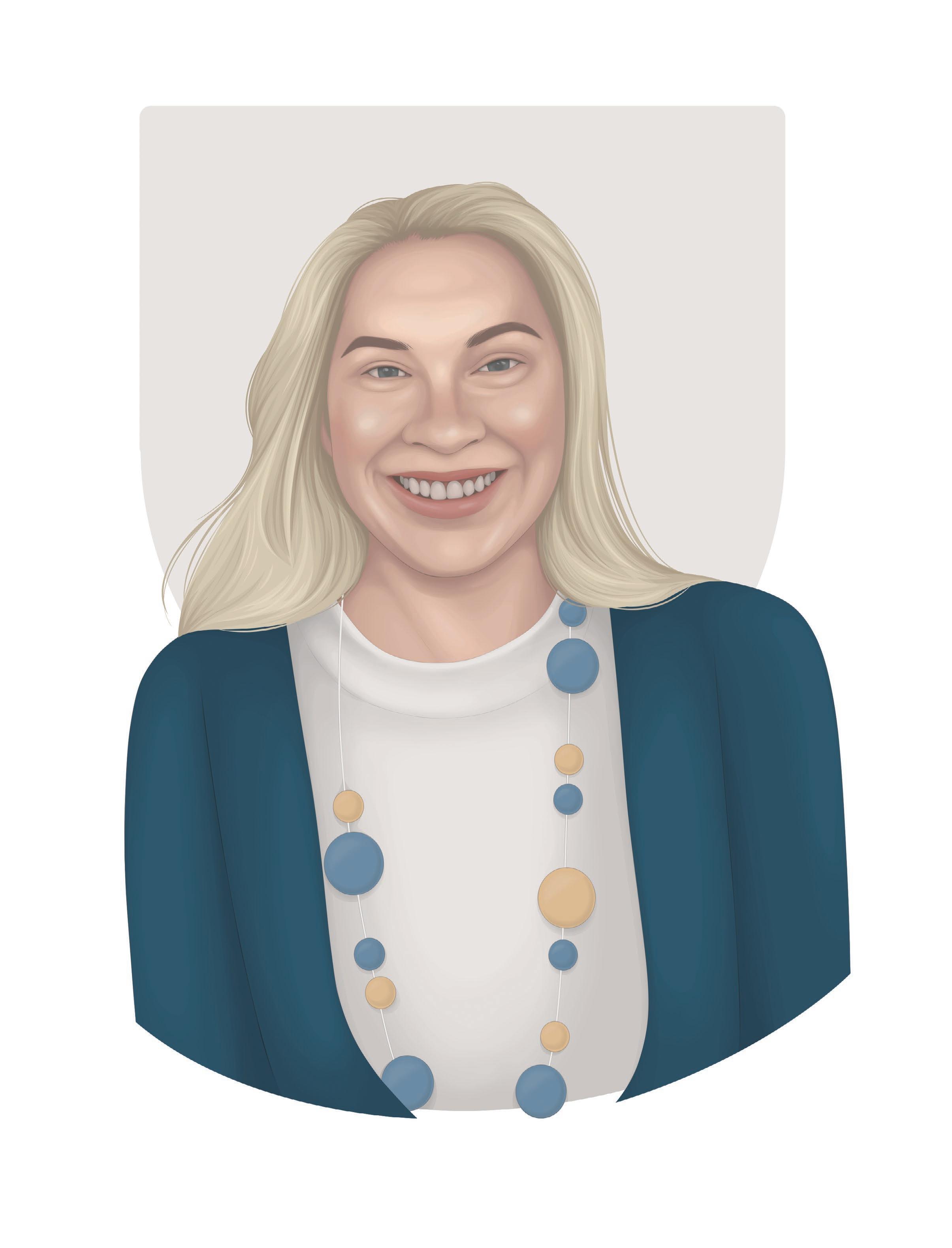
“... we embraced a saying about being a pineapple: ‘Stand Tall, Wear a Crown, and Be Sweet on the Inside.’”
JESSIC A SHERRILL ’06
ALUMNI NEWS
58 OKLAHOMA CITY UNIVERSITY SCHOOL OF LAW IN BRIEF
Why were you interested in attending OCU School of Law?
Law school was not my plan. After graduating from the University of Oklahoma with a Psychology degree, I was considering graduate school to become a school coun selor. I knew I wanted to protect children as my career.
I credit my husband, Jay, for my applying to law school, because he convinced me that going to law school could be an even better way to launch a career advocating for children on a large scale. A best friend of mine, Andrea Moates, was returning as a 3L at OCU Law in the fall. I decided to apply to OCU Law — and only OCU Law. My mother was recovering from breast cancer and lived in Oklahoma City. After I was ac cepted, I set a personal goal to graduate as quickly as possible to minimize the semester fees. The flexibility offered by OCU allowed me to do that, and I graduated a semester early in December 2006 - saving myself nearly $25,000 in student loan debt.
What did your time at OCU Law mean to you?
My time at OCU Law was intense with a crash course on time and priority management. I met incredible lifelong friends but still felt like an imposter. Many of my peers had always planned to become lawyers with their political science and business degrees, and many came from families of lawyers. And there I was, an Alpha Chi Omega chapter advisor (OU) who wore pink and purple and jumped in without a clue. I needed to find my community, and OCU Law provided many ways to do just that.
I joined the Black Law Students Association, Women’s Law Student Association, and was selected as an OCU Law student ambassador. I obtained a limited law license and was hired as a licensed legal intern for Okla homa Lawyers for Children and was a CASA volunteer.
The OCU Law Career Services team became a conduit to my future, and I am extremely grateful. I became familiar with public service legal jobs and knew that was where I was heading. Professor Laurie Jones was a role model for me through law school and connected me with the public education law field.
Are you where you expected to be at this stage of your career and life?
In a way, I knew I would spend my career helping
others, protecting children, and doing it my own way. But being the first college graduate and lawyer in my family, I could not possibly have imagined where this degree would take me. It is beyond my wildest dreams what I get to do today!
Although I had borrowed from my future self, student loans were the only way I could continue my education. I remember my mom’s reaction to my news that I was considering law school, “I don’t know how you will be able to do that.” That was her way of using reverse psy chology to motivate me to think big. Unbeknownst to all at the time, my working in public service as a lawyer allowed a large portion of my student loans to later be forgiven through a federal public loan forgiveness program. It worked out!
If I could go back in time to that pivotal moment when I decided to go to law school and to only apply to OCU Law, I would do it all over again!
What inspires you?
The ups and downs and surprises of life inspire me. No matter what happens, there is a new day around the corner. I lost my mother to cancer several years ago, but before she passed, we embraced a saying about being a pineapple: “Stand Tall, Wear a Crown, and Be Sweet on the Inside.” Life will take you where it may, but you decide that which is within your control. Your actions and words matter. Choose them wisely.
Tell us about your experience providing legal advice to the Superintendent and the school board. Are there any lessons you take away from it?
As in-house counsel, my client is the school district, which is run by a school board consisting of eight (8) locally elected members. The board employs a Super intendent who runs day-to-day operations. We all work together as we maintain a laser focus on the students and their needs. This aligns our collective priorities.
I recall a great lesson from one of my OCU Law profes sors who explained that law is a practice. There are no set steps to reach your desired outcome. You digest the relevant facts, conduct your research, consider all an gles, assess your risk, anticipate all possible outcomes, and advise your client as best as you can. Some final outcomes of our decisions remain to be seen, but I know I did my best and will continue to do so for our students.
by
General Counsel at Oklahoma City Public Schools
CLASS of 2006
Portrait Illustration
Yuschav Arly Jessica
Sherrill IN BRIEF OKLAHOMA CITY UNIVERSITY SCHOOL OF LAW 59
What do you enjoy most about being a mediator?
I was certified as a mediator while I was still in law school, which allowed me to do mediation in Oklahoma County. The thing I enjoyed most was being able to do mediation for parties and helping them agree to settlements that were agreeable to both sides. This prevented them from staying on the docket and pro ceeding in the court system, which saved them time and money.
How does your background in the United States Marine Corps come into play as an Assistant Attorney General?
I think that there are many traits that the Marine Corps taught me which carry over into my work every day. I can be detail oriented, which allows me to know what the end goal is and helps me draft the best path forward to accomplish the goal. It also makes me selfaware in the sense that if I do not know something it makes it easy for me to ask for advice from others that may have dealt with a similar situation.

What is the most important lesson you learned from your time as a clerk for Oklahoma Supreme Court Justice Jim Winchester?
Justice Winchester is one of the most influential peo ple I have ever met. I think the most important lesson I learned from him is that every decision has a lasting impact and that we have a responsibility in making those decisions to make them in an informed, well thought out, carefully tailored and clear way.
You currently serve as the District 3 Representative for the Oklahoma Bar Association and as a member of the YLD. Why is it important for OCU
Lee Grossnicklaus
Law Alumni to get involved with their local bar association?
Serving on the YLD board helps me give back to the le gal profession and ensure that the profession is doing everything we can to be well informed and influential to our local communities and to our great state. The local bar association does a great job connecting the attorneys and the local community, which allows for attorneys to know important issues in those areas while also providing a way for the profession to aid in our state.
What activities do you enjoy outside of work?
I enjoy spending time with my wife (Emily) and our family, watching sports, playing golf, and serving in any capacity that I can.
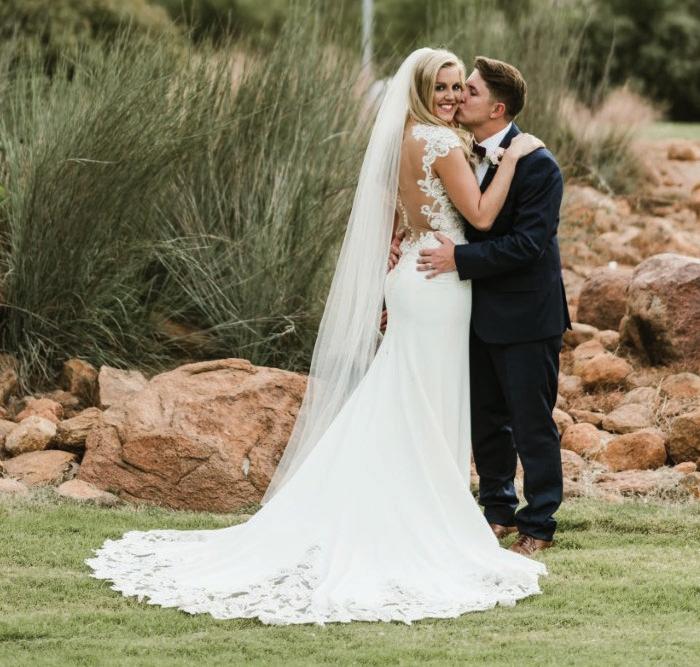
What is your favorite memory of attending OCU Law?
My favorite memory is going through law school with my wife and building friendships with my classmates and surviving the grind of law school, as well as all of the knowledge and interactions with the great profes sors and staff at OCU Law.
What inspires you about the legal field and its future?
I think that the legal profession has such an impact on so many issues that affect our daily lives. From the courtroom to business to legislation, the legal profession has a duty to ensure that all these interac tions benefit our field and the public. I believe that the future for our profession is bright, but we must realize that the future starts today.
CLASS of 2020 Assistant Attorney General at Office of the Attorney General in Oklahoma City
Portrait Illustration by Yuschav Arly
ALUMNI NEWS Thomas
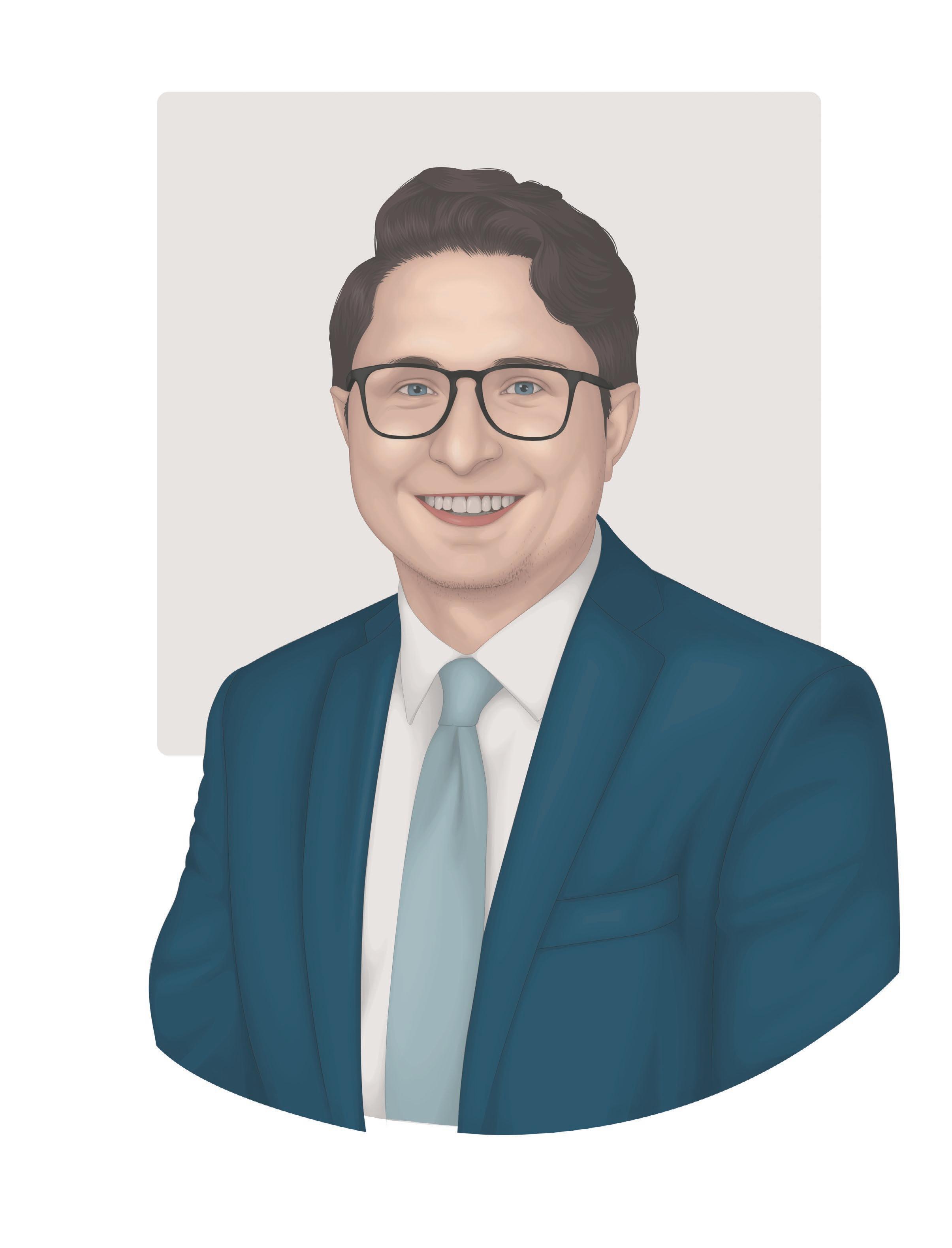
“I believe that the future for our profession is bright, but we must realize that the future starts today.”
THOMAS LEE GROSSNICKLAUS ’20
IN BRIEF OKLAHOMA CITY UNIVERSITY SCHOOL OF LAW 61
“Do what you love. I think there's a misconception that if you're a lawyer, you need to be practicing in a courtroom or in a law firm. That is simply not the case. Law school works to create skill sets that can be used in any arena.”
SUNIL ISSAC ’13
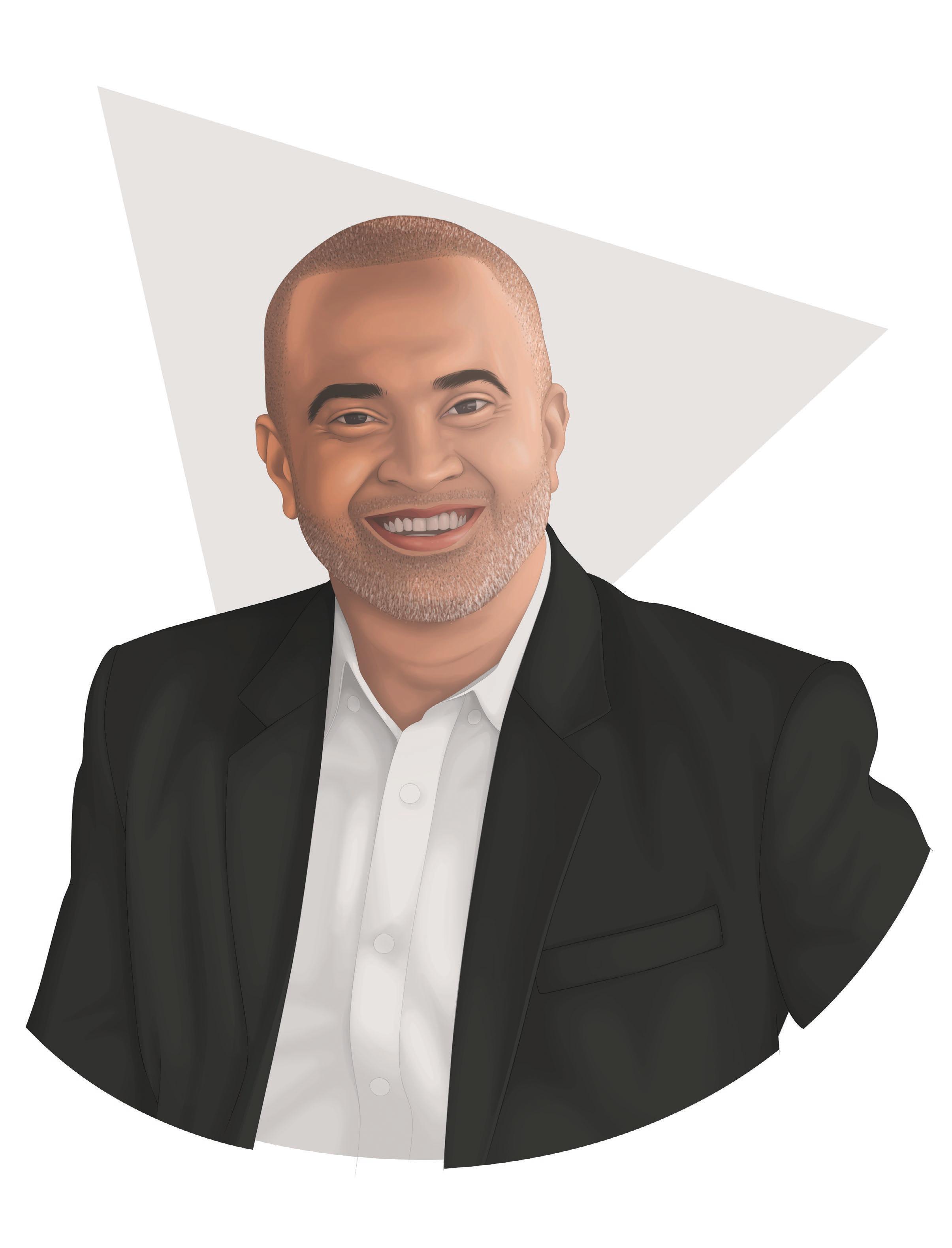
ALUMNI NEWS
62 OKLAHOMA CITY UNIVERSITY SCHOOL OF LAW IN BRIEF
Portrait Illustration by Yuschav Arly
Sunil
CLASS of 2013 Technology Supervisor EHS/ESG at Devon Energy in Oklahoma City
Issac
You have and are currently serving on a number of local Nonprofit Boards. Why is it important to you to give back to your community?
Growing up in a family dedicated to the church and community, donating our time and resources to others proved to be an integral and expected part. Early in life, the church granted me opportunities to serve and lead others through service. I now strive to focus my efforts on one or two organizations to maximize my contribu tions for the betterment of the organizations. Time and money are valuable assets to any community. In my opinion, serving my time is more meaningful because time and expertise can result in dividends far greater than any financial contributions a single person can offer. One person’s impact may be multiplied by the effect they’ve had in touching numerous individuals.
How has your law degree helped you in your role as Technology Supervisor at Devon Energy?
I use my law degree every day through my interactions at work, the organizations I serve, and the family I am raising. Law school, as well as the practice of law, requires us to approach problems differently. We use critical thinking and logical reasoning for everything we do. We identify risks and develop creative ways to mitigate those risks. Probably most importantly, we carefully communicate our findings and guidance to our stakeholders.
Describe your work. What is a regular day like?
Every day is different at Devon. As part of the Tech nology department, our primary responsibility is to ensure that various operational teams always have the tools they need to make their lives easier, and to make the organization more successful in utilizing technology for their needs. Much of my focus resides around support. With multiple internal stakeholders, balancing competing priorities is baked into the work we do daily. With a company like Devon, there can be 50 different efforts that require prioritization and coordination on any given day.
What do you enjoy most about your job?
One of the things I love about my job at Devon Energy is that every day is different. I thrive on that! In the 7+ years that I have been there, I have never had a day where I dreaded going into the office. There may be some days where I feel I didn’t accomplish much.
There are also days where I feel like I accomplished a lot. However, I can honestly say that every day, I leave knowing I added some value.
We hear you are a big Chicago Bulls fan. Do you have a favorite game or memory?
My favorite memory of the Bulls would have to be the game winning shot by John Paxson against the Suns in 1993. Everyone was standing in the living room watch ing with anticipation. We were all watching Michael and knew that he would take the final shot. However, with seconds left in the game, Michael got caught up by the Suns' defense and they couldn’t get the ball to him. Somehow the ball makes it to an open John Pax son as he attempts his 3 pointer. He nails it.
How has your OCU Law education contributed to your success?
I do not believe I would be in the position I am in now, or as satisfied with my career, if I didn’t have my OCU Law education. I started my career at Devon as a Business Analyst in the Technology organization. I was new to Oil & Gas, but Technology was the industry I had worked in for years before law school.
The training I received from OCU Law contributed to my success in that role, and eventually to other roles I took on for the organization. My training gave me skill sets that were unique from other people in my po sition. I first learned to master the role I was brought in for. I continued to do more due to the passion and the skills I had available to me. Over time, I was able to create the role I wanted within the position I had, and the organization was better for it.
What advice would you give a young lawyer starting out?
Do what you love. I think there's a misconception that if you're a lawyer, you need to be practicing in a courtroom or in a law firm. That is simply not the case. Law school works to create skill sets that can be used in any arena. These skill sets are valuable in both professional and personal settings. Lawyers use legal analysis and critical thinking to work through prob lems. Lawyers have exceptional writing skills and can communicate effectively. If you find something that you are passionate about, pursue it. These skill sets that you have obtained will follow you into any career you pursue.
IN BRIEF OKLAHOMA CITY UNIVERSITY SCHOOL OF LAW 63
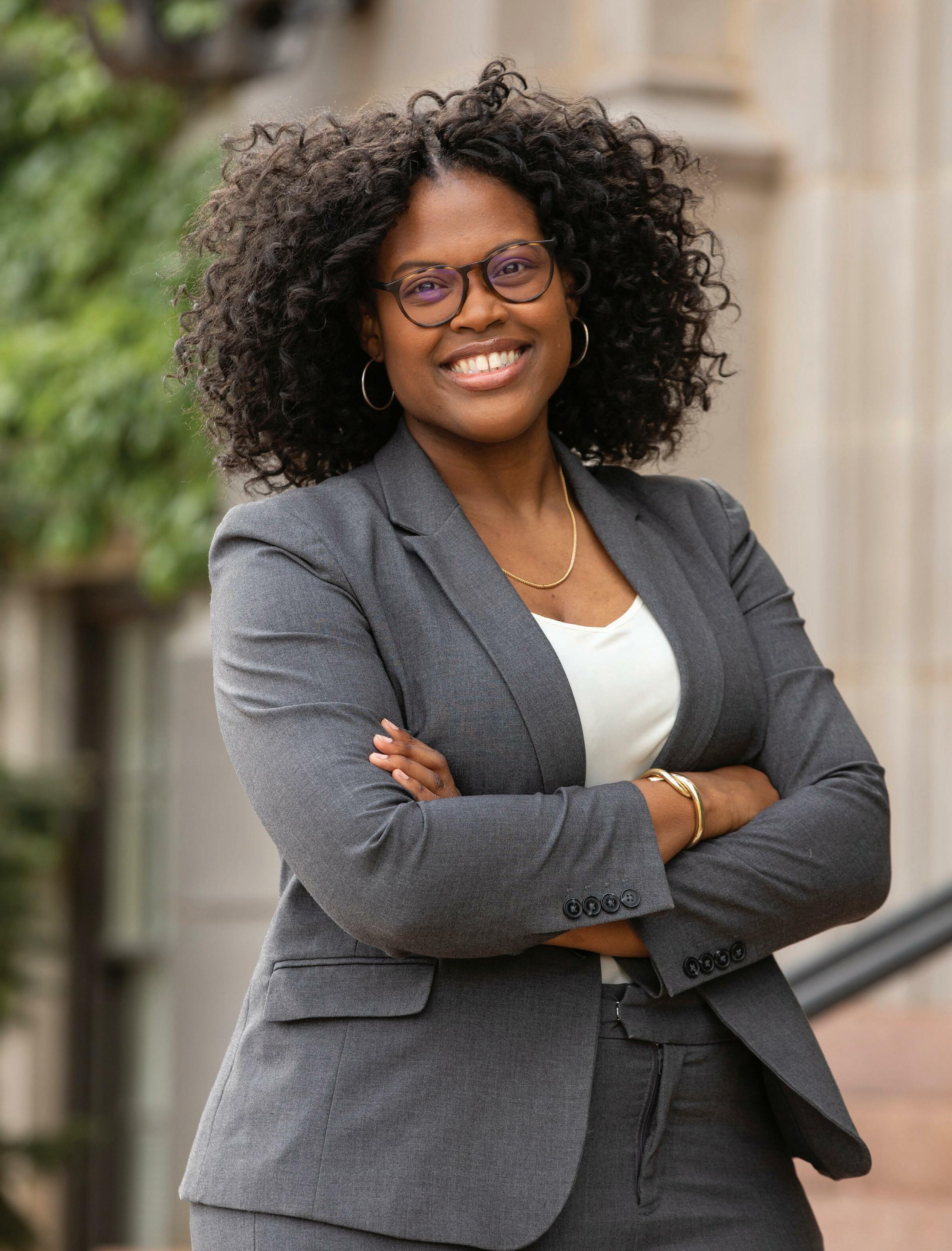
GIVING BACK
OBSTACLES AS OPPORTUNITIES
A Scholarship Story
If someone had told me that I would quit my job to start law school at thirty years old in the middle of a global pandemic, I would have looked around for hidden cam eras and a film crew. Somehow, though, that’s exactly what I did.
I am originally from the east side of Oklahoma City. Growing up, we received public housing, food stamps, and other social services benefiting the impoverished. What we lacked in material things, though, we made up for with gumption.
My perspective of seeing obstacles as opportunities to be innovative was forged in the hardships of poverty and nurtured through the encouragement of my family. As a kid, my mom taught me how to spell my name and introduce myself: Ta’Chelle Nichollette Ashley Jones. She’d remind my sister and me to be confident and to keep our heads held high. By the time I was in elemen tary school, I was utterly convinced that I could do any thing; be anything.
So rather than be overcome by adverse circumstances, I was imbued with the conviction that I was wildly capa ble. More than an affirmation, the belief that I could do just about anything kept my eyes set beyond the bound aries of Section 8 housing. For me, perseverance wasn’t just a noble character trait, but a necessity. Holding fast to these lessons, I adjusted their utility from one of sur viving to one meant for thriving.
Upon graduating from Northeast Academy for Health Sciences and Engineering, I earned a Bachelor’s in Jour nalism and a Master of Human Relations with a con centration in human resource development from the University of Oklahoma. Before law school, I enjoyed a career as a human resource professional.
Most recently, I worked as an HR Business Partner on the U.S. Field Services team at Crawford & Company, the world’s largest publicly traded claims management firm. There, I contributed to global projects, conduct ed internal investigations, and coached executives and managers alike while collaborating with internal and external legal counsel. Through these experiences, I be came fascinated with the intersection of business and people, especially in relation to how local and federal laws impacted that relationship.
BY TA’CHELLE JONES SECOND YEAR LAW STUDENT
As my interest in the law continued to grow, I shifted my focus to pursuing law school. Though my goal was to earn a full-tuition scholarship, I received so much more. In earning the Sumners Scholarship and coming to OCU Law, I gained a wonderful community and an other place to call home. As a second-year law student, I have already created bonds that I know will last a life time and obtained opportunities of which I didn’t even know to dream.
I served as a judicial intern for the Oklahoma Court of Criminal Appeals under Presiding Judge Scott Row land and competed in the ABA National Appellate Ad vocacy Competition. This semester, I worked as a law clerk at Ogletree Deakins, a premiere international la bor and employment firm. In the summer I will be join ing the decorated global firm, Norton Rose Fulbright, as a returning summer associate.
Personally, law school has been a vehicle for the pur suit of a dream. But at a time where the world seems so close through technology and information sharing, yet so divided by topics like policy, health, and basic hu man rights, law school has proven incredibly import ant as a training ground. Here, students learn how to be engaged citizens and change agents not only for the world as we know it today, but for the future to which we aspire. I look forward to joining the ranks of this noble profession and making a positive impact on my corner of the world.
Photograph by Simon Hurst
“My perspective of seeing obstacles as opportunities to be innovative was forged in the hardships of poverty and nurtured through the encouragement of my family.”
IN BRIEF OKLAHOMA CITY UNIVERSITY SCHOOL OF LAW 65
thank you for giving
Dean’s Level

$20,000+
Kirkpatrick Foundation
Micheal Salem
Oklahoma Bar Foundation
Oklahoma City Community Foundation
Ray and Patricia Potts
Tom Quinn and Tommy Thompson
Bill and Pam Shdeed
The Sumners Foundation
Platinum Level
$10,000+
Justin and Becky Meek
Gold Level
$5,000+
Jim Beers
Scott and Vicki Behenna
Steven and Dawn Camp
Joe and Kristin Carson
DeWitt, Paruolo & Meek
Frank S. and Julia M. Ladner
Family Foundation
Robert and Sarah Haupt
J.R. and Patsy Homsey
Steven and Carrie Katigan
Brad and Stacy Klepper
Silver Level
$2,500+
Rob and Autumn Abernathy
Bob and Chimene Burke
Bill and Mary Ann Corum
Steven and Carol Goetzinger
John and Janet Hudson
George Milner
Christina and Richard Murray
Oklahoma County Bar Foundation
Sword & Gavel
$1,000+
William and Leslie Ackerman Frank and Kit Addleman
David and Kathie Aelvoet
Kalani and Alexandra Ah Loy Ronald and Deborah Barnes
Stan Basler
Jerry Bass
Doug and Rhonda Buckles
Conklin Family Foundation
Valerie and Joe Couch
Von Creel
John and Cindy Crittenden
Paula J. Dalley
Patricia R. Demps
Dunlap Codding
Drew and Linda Edmondson
Timothy Foley
Fuller Tubb Bickford Warmington & Panach
Garfield County Bar Association
Sarah J. Glick, Esq.

Harry Goldman and Jettie Person
Lydia Y. Green Ron Griffin
Michelle Gunter Healthcare Partners Investments
Larry and Gay Hellman
Claudia Holliman
Johnson Hanan Vosler Hawthorne & Snider
Joe and Kathy Biscone
Michael and Summer Krywucki Art and Betsy LeFrancois
Brandon and Joanna Long Robert and Martha Margo Katherine R. Mazaheri
Rozia McKinney-Foster and Rev Larry Foster Sr. Bud and Marilyn Meade
Nikki and Joel Miliband
Oklahoma City University School of Law gives thanks to our donors who provide critical ongoing support, the members of the Sword & Gavel Society.
Sword & Gavel Society members make an annual commitment to the law school and can direct their gifts to any of the law school’s programs or funds, including scholarships, the Center for Criminal Justice, or faculty research and development. Members are also able to split their gifts to benefit multiple law school programs.
We value the generosity of our supporters, and none more than our Sword and Gavel Society members, whose gifts represent an investment in OCU Law and our students, the servant leaders and justice-seekers of tomorrow.
Join the Sword & Gavel Society today by donating to OCU Law at any of the levels below: (Requested 3-year minimum commitment)
Sword and Gavel $1,000 annually
Silver Level $2,500 annually
Gold Level $5,000 annually
Platinum Level $10,000 annually
Dean’s Level $20,000 annually
For more information, please contact Jennifer Prilliman at (405) 208-5174.
GIVING BACK
66 OKLAHOMA CITY UNIVERSITY SCHOOL OF LAW IN BRIEF
Kyle and Ashley Murphy
Dana L. Murphy
Ogletree, Deakins, Nash, Smoak & Stewart
Melissa Pasha
Ed Proctor and Nancy Dumoff
Casey R. Ross
Jim Roth and Phillip Koszarek
Hiram and Robbie Sasser
Andrew and Paulette
Schroeder
Heidi Slinkard
Irwin and D. Kelley Steinhorn
Brent and Debi Stockwell
Adam Hall and Kelli Stump
Sweet Law
Michael To and Kim Tran
Kay Van Wey
Carroll Wheeler
Benefactors
Up to $1,000
Rose Barber and Geoff Hefner
Hamden and Robyn Baskin
Mike and Nancy Berland
Cathy Campbell
Douglas and Janet Combs
David Echols
Jennifer Finley
Barry and Renee Grissom
Sally Jacobs
John and Tamra Rhea
Michael Kaplan
Fred Kempf
Eric Laity
Stephanie Liebl Huber
Tracy Lloyd
Carmen Lynch
Meredith Manning
Rachel Mathew
Isai Molina
Brenda Nazari-Robati
Keri Norris and Ty Norris
John and Debra Owen
Lindsey and Brian Pever
Rick Rose
Robin Roberts Krieger
Peter Spivack
Phyllis Taite
The Kerr Foundation

Pendleton Tompkins
“My wife and I are currently completing our estate plan. The reason we chose to make OCU Law a beneficiary is to say ‘thank you’ to an institution from which I have received much more than I could ever possibly repay.
I see this with more clarity over the last several months. I was recently represent ing a client in a matter concerning a license agreement for real estate. Among my ref erence tools was The Law of Easements and Licenses in Land. One of the co-au thors was Jon W. Bruce, Distinguished Professor Emeritus of Law at Vanderbilt University. Professor Bruce was my in structor in Property during my first year in law school at OCU. I communicated with him, and in his generosity, he provided me with the most recent volume of his trea tise and personally autographed it to me.
I was asked to judge a Moot Court Argu ment at my undergraduate Alma Mater, Susquehanna University. The case to be argued is the current case of Oklahoma v. Castro-Huerta, before the Supreme Court of the United States. The issue is whether a State has authority to prose cute non-Native Americans who commit crimes against Native Americans on tribal land. I will be thinking of my professor in my third year of law school, Maurice Hitch cock Merrill, late Distinguished Professor Emeritus of Law at the University of Okla homa and Distinguished Visiting Lecturer of Law at Oklahoma City University. The course was entitled ‘Advanced Constitu tional Law and Seminar on the Judiciary in Oklahoma.’ Dr. Merrill explained, with thoroughness, the jurisprudence of Trib al Law, a subject with which, as a Penn sylvanian, I was totally unfamiliar. It was very gratifying to return to Susquehanna for the oral argument, knowing that I was taught the subject matter of the argument by a recognized national expert.
I am very grateful to Oklahoma City Uni versity School of Law and to those who taught me there. Having been admitted to the Pennsylvania bar, I continue to use the knowledge received from OCU Law ev ery day of my professional life for the last 45 years.”
S. JOHN PRICE, JR., ESQUIRE JD, CLASS OF 1977
Sponsors

Up to $500
Angela Ables
Salima Ahmad
Allison and Kevin Bailey
Larry and Charlotte Berry
Karen Berry
Joey Croslin
Susan C. Curtiss
Elizabeth Davis Chuck Day
Michael Decker
Jo Anne Eason
Judy and Brian Federa
Danielle Fielding
Brent Greyson
Janie Hipp and Mitch Rogers
Brian Hobbs
Donald and Carole Hoeft
Alana and Nkem House
Ed Moehlenbrock and Carrie Hulett
Donna Jackson
Yvonne Kauger
Emma Kincade
Joseph and Luz Leszczynski
Zino Magbegor
Byrona Maule
Thomas and Linda McCoy
Buddy and Maggie Neal
Janet New
Robert and Vanmai Nguyen
Todd Pauley
Suzanne E. Pointer
Dawn Rahme
Christine and Gary Reid
Edwin Reid
Dani Schinzing
Fred and Pat Schonwald
Hayley Sloat
Kevin Smith
John and Laurie Stansbury
Mary Anne Sullivan
Tara and Habib Tabatabaie
Collin Walker
Tim Warner
Nancy Watkins
Scott Webb
Heidi M. Weingartner
Michael and Betty Wolf
Tom Wolfe
Supporters
Up to $250
806 Manvell, LLC

R. Daniel Alcorn, Jr.
Billy and Katy Alven
Bill Anderson
Carolina Attaway
Furqan Azhar
James and Stephanie Biscone
Seth Blanton
Stephen Booth
George and Lorraine Bradley
Lauren Brown
P. Scott Buhlinger
Adam Bush
Stephen and Gabrielle Butler
Jerome and Pamela Carlson
Patrick and Robi Casey
Mickey Clagg
Jerry and Amie Colclazier
Faustine E. Curry
Debbie Davis
Justin Davis
Chance Deaton
Jay and Sherry DeBord
Daniel Defilippi
Tiece Dempsey
Thomas Dill
Richard and Susan Dimick
Jacqueline DiPillo
Karen Eby
Michelle Edstrom
Sarah Evans
Lisa Fales
Marilyn Fisher
Andrew Garrett
Timothy Gatton
Jerry Geiger
Pete Gelvin
Mark Gerstein
Brent Gurney
Rick and Ann Hadrava
Christopher Hall
Claude Harris
Kari Hawthorne
Jordan Haygood
Marty and Paula Himeles
Tami Hines
David and Rachel Holt
Gary and Alyce Sue Homsey
Abigael Hood
Bambi Hora
Tina Hughes
Innocence Project, Inc.
Garvin Isaacs
Philip Isaacs
Nathan Jacob
Tom Jones and Leslie Tregillus
Yvonne Jones
Alan and Angela Kennington
Jim and Pamela Klepper
Ted and Sharon Knight
Wade Kovash
Paul and Julie Lacy
William Lange
Pat Layden
Bob Lewis
Dan Burdette and Janis Love
Carol Mazzetti
John and Ann McCulla
Theresa Mcculla
Debbie McKinney John McShane
Cynthia Merwin Matt and Raye Mickle
Kelly Monroe
Daniel and Andrea Morgan
Christin Mugg and Chris Purget
John Myers
Michael and Paula Neely
Amber Nelson Ruey Newsom
Robert and Karen O'Bannon
Nancy O’Bryan
Martin Ozinga
Zach and Andrea Painter
Leonard and Kathleen Pataki
Emma Payne
Trevor Pemberton Luciana Perez
Amy Pierce and John Barbush Harlan Pinkerton
Mike and Sara Potts
John Powers and Martha Herron
Marvin and Linda Resnick Karlena Risenhoover
Malcolm and Kathryn Savage Peter and Whitney Scimeca Shane and Karla McLaury
Michael Silver
Eric Singleton
Harry Shapiro Kara I. Smith
Mackenzie Smith
Dick Smith and Ann Bowman
Dean and Maribeth Snapp Andrew and Ellen Spiropoulos
Barry and Tonda Stafford Colby Stephenson Matthew Stump Paula Sullivan
Michael Taber Rogan Thompson Mark and Carol Toffoli Elizabeth Tonn Linda Ware Toure
Michael Vernon
Earle and Margaret Wagner Collin and Lori Walke
Bill Wantland
Chad and Courtney Warmington
Travis Weedn Vialo and Shannon Weis Mary Westman
Joe Wheeler and Lynda Simms-Wheeler
Daniel and Sarah Whitmarsh Larry and Dawn Wiese
Tony Fitch and Leslie Wileman Bryson and Kelly Williams Kyla Willingham
Anthony Winter Sammy Wong Eileen Wooten Monica Ybarra Melissa Young Sajani G. Zachariah
Donors
Nathan Adams Dana Ashcraft
Colin Barrett
Barton Production Tiffani Bates Bianca J. Bryant
Harrison Burton Austin Caldwell Lavaughn Carey
Ashley Cash Mercedes Charles Carey-Elisa Christie Ernest Cockrell and Jill Shirk Cockrell
Tyler Kemp and Susan Damron
Kevin Dellinger Charlie DeWitt
James Dixon Marvin and Liz Quinn
Jay and Olivia Evans Irving and Sandy Faught
Chris and Abby Foshee Steven and Jennifer Foster Douglas and Rebecca Gaff Cathryn Gibbs
Thomas Gilchrist Douglas Golden Grecia Gramajo
Preston Gunkel
Preston and Barbara Hatfield
Eric Holey
Mary Jackson
Robyn Jefferson
Andy and Rachel Koester
James Littlefield
David and Lea Ann Livingston Matthew Lynam
Beverly Mason Mitchell and Allison McGrew Cynthia Ngo
Carol North Persimmon Hill Neighborhood Association
Wendi Peterson Sarah Powers Jennifer Prilliman
Peter Roller
Kate Springer Jeffrey Sprung Jahni S. Tapley Bachman Andrew and Patricia TepperRasmussen Tina Thomas
Bill and Patsy Wakeham Sandra Williams
If you would like to join the growing list of alumni, faculty, staff, students, friends and community partners who are investing in Oklahoma City University School of Law, we invite you to make a gift today. Visit law.okcu.edu/give or call (405) 208-5174 to make your donation.
68 OKLAHOMA CITY UNIVERSITY SCHOOL OF LAW IN BRIEF GIVING BACK
GETTING & GIVING the most from assetsyour

Donating appreciated securities – such as stocks or mutual funds – to Oklahoma City University School of Law is a tax-wise approach to supporting the next generation of servant leaders. You may want to donate to OCU Law using long-term appreciated stocks and mutual funds due to the attractive tax advantages associated with such gifts.
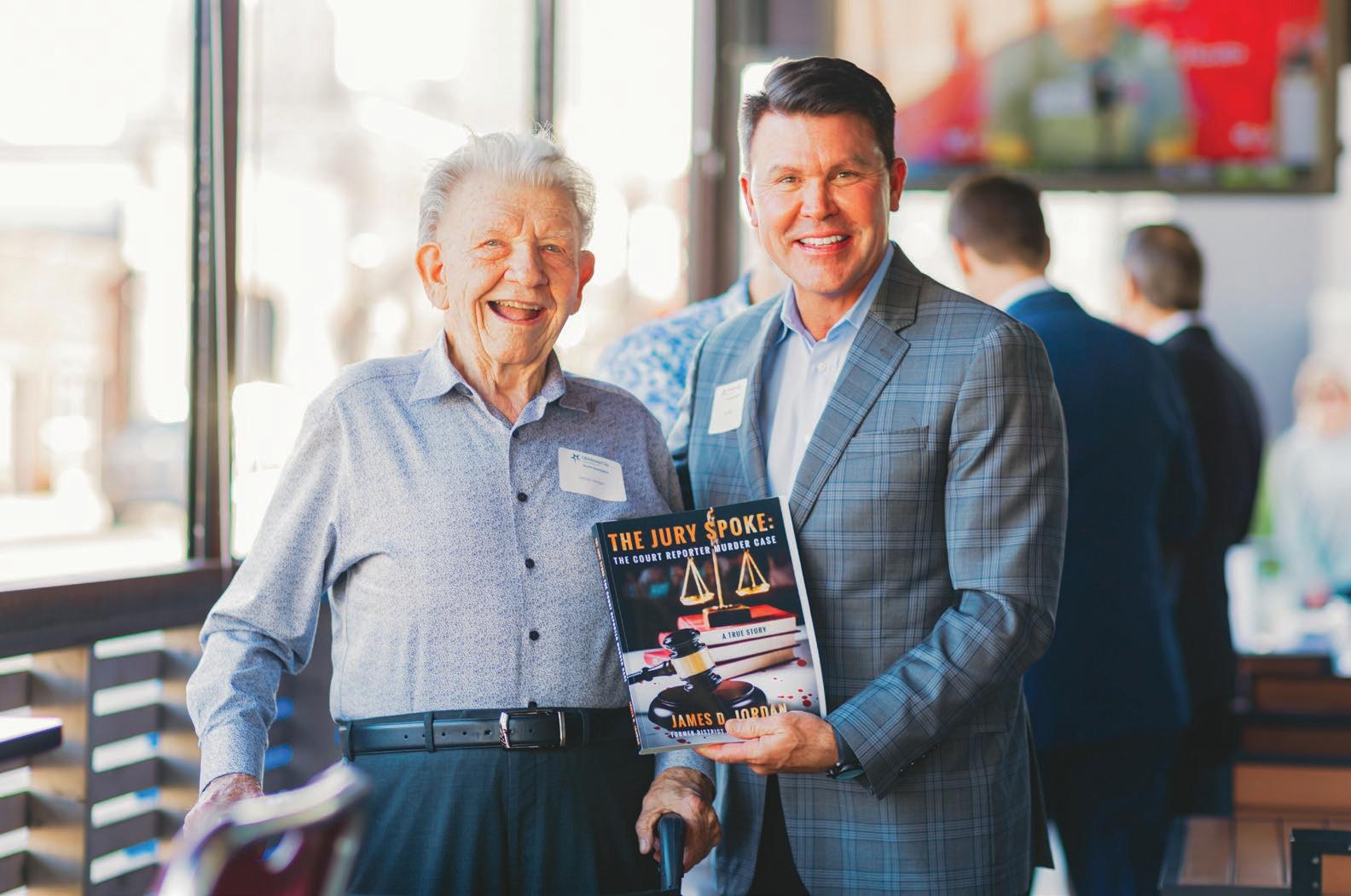
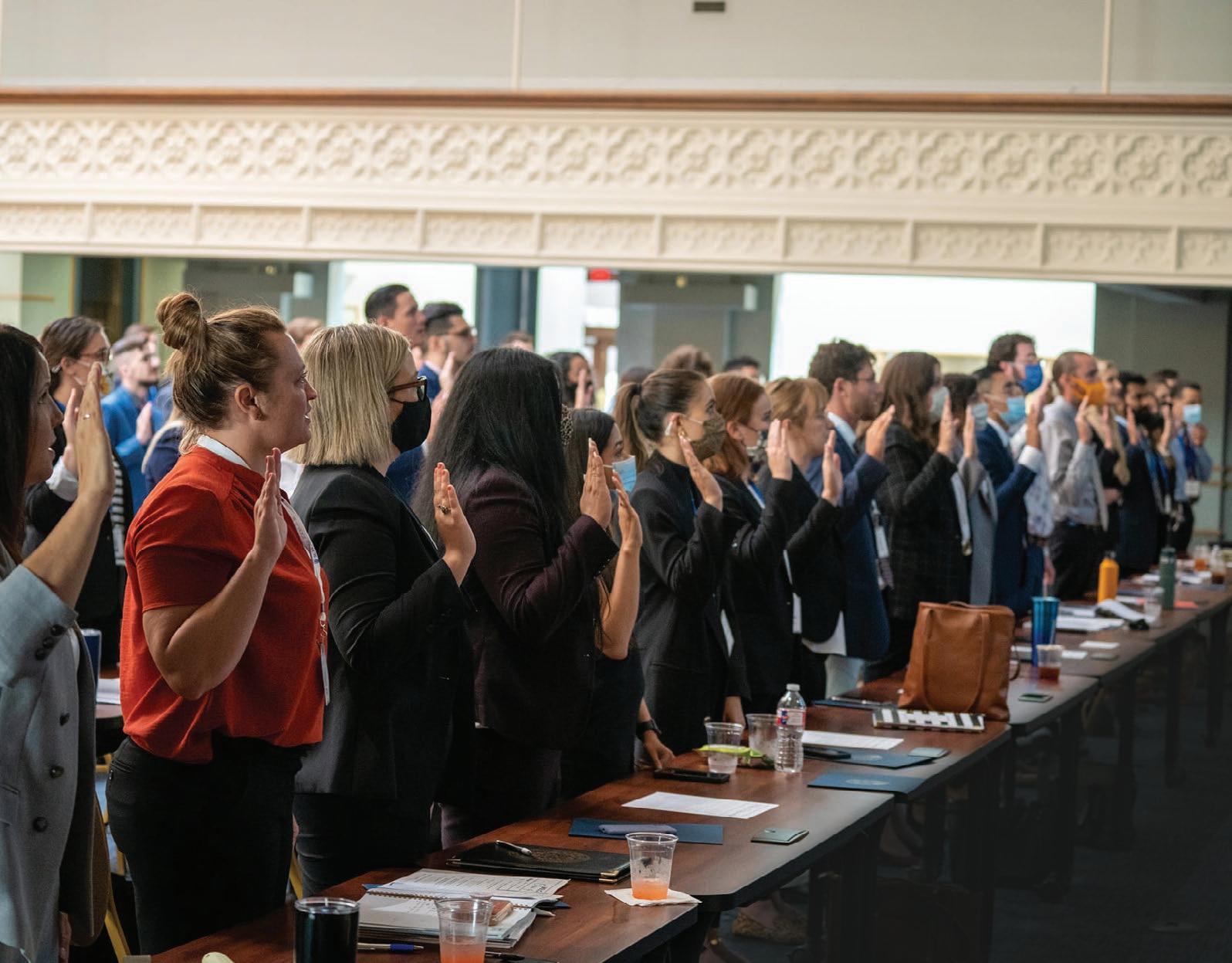
The benefits available to you when making a charitable contribution of stock or mutual funds may include:
• Avoiding federal and state tax on capital gains
• Receiving an income tax deduction (federal and most states) for the full market value of the gift if you itemize deductions on your tax return and have held the assets one year or longer
• Making a larger gift at a lower original cost to you You can explore other options for appreciated stocks at oculegacy.org.

You might be surprised!
What types of non-cash assets do you own? A gift of any of these assets – CDs and money market accounts; real estate such as commercial, rental, farm, and ranch; life insurance policies; tangible personal property such as art, coins, and collectibles; and retirement accounts – may provide you with benefits. Plus, it will have an immediate impact on OCU School of Law. Please contact Jennifer Prilliman at (405) 208-5174 to learn more on how you can give and get the most from your assets.
Incoming 2021 1L students took the Pledge of Professionalism during their orientation in August
Law students with Dean Roth after orientation
Dean Roth joins alumnus James Jordan ’69 at the Tulsa Alumni Reception
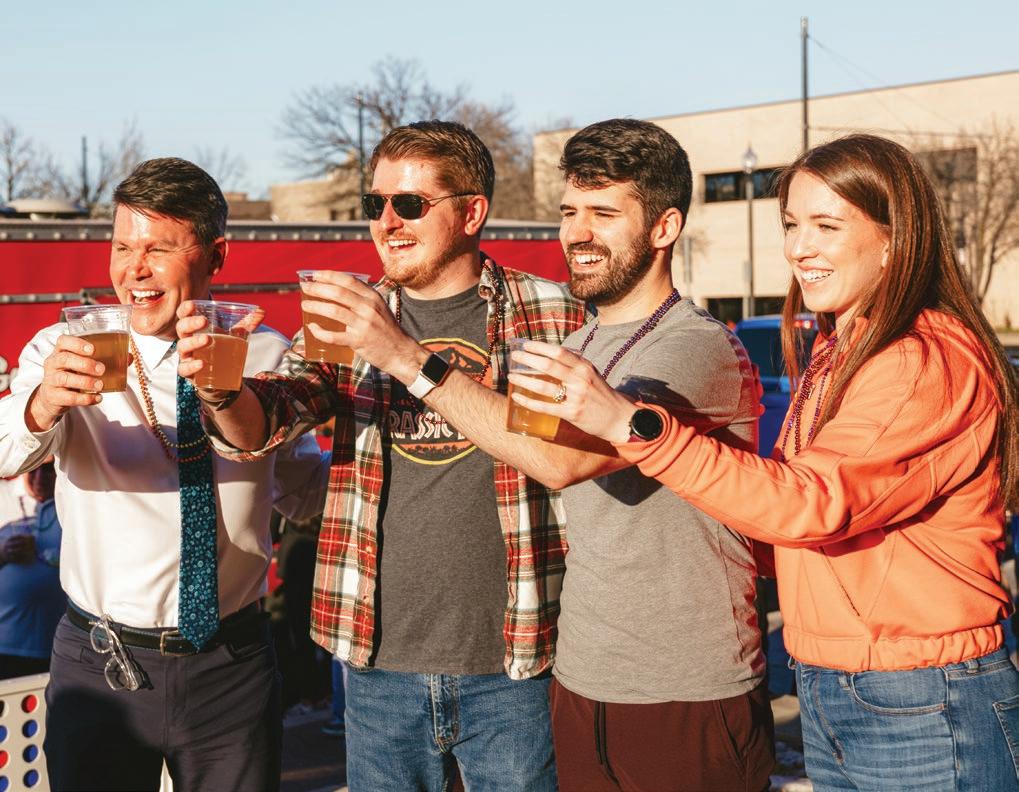
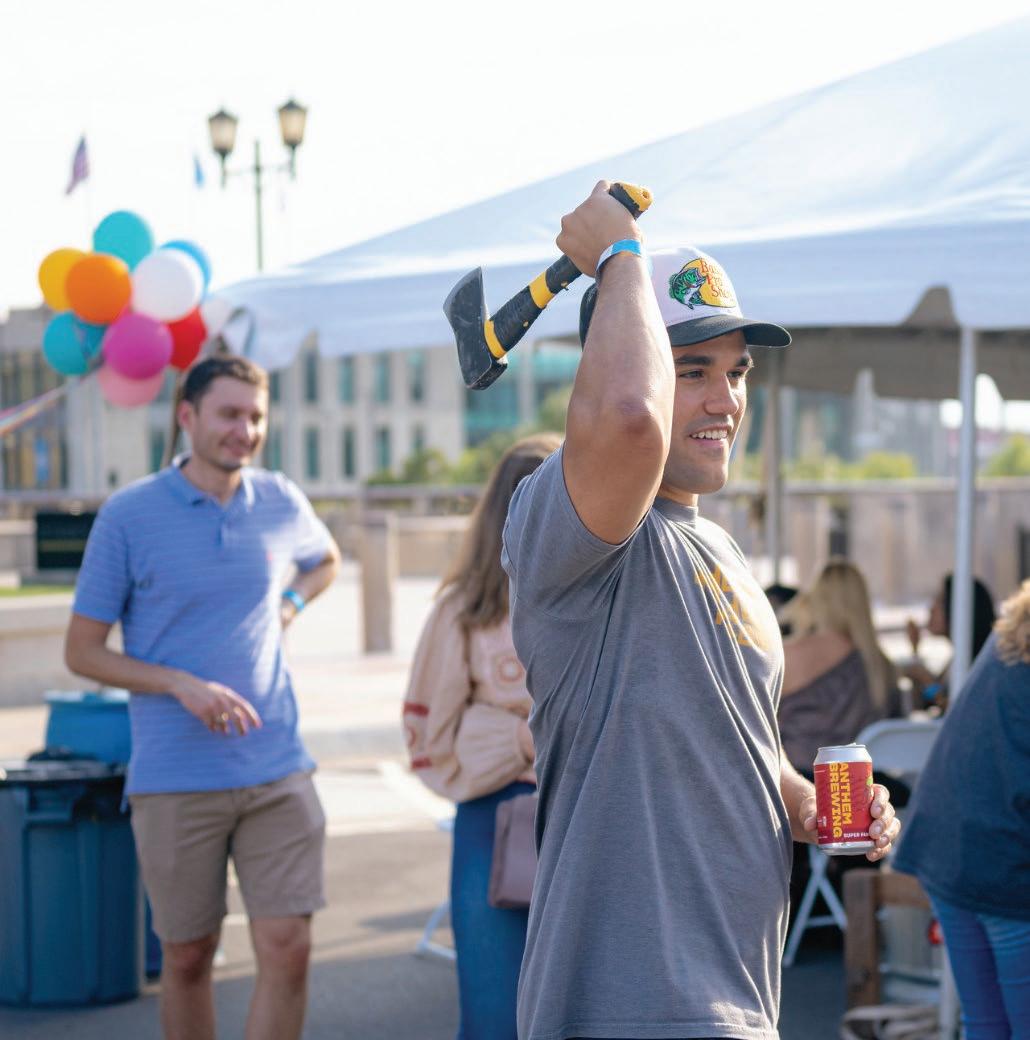
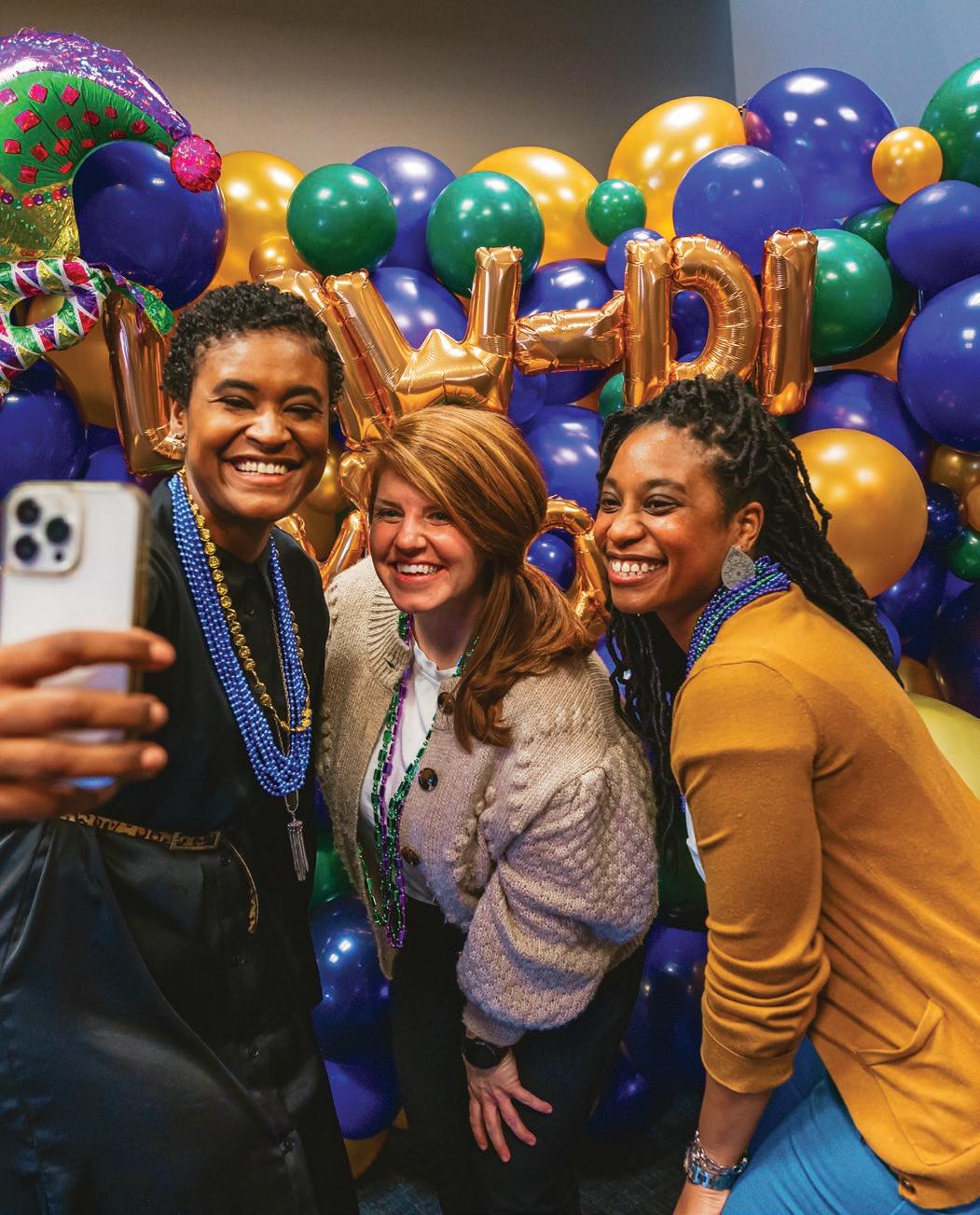

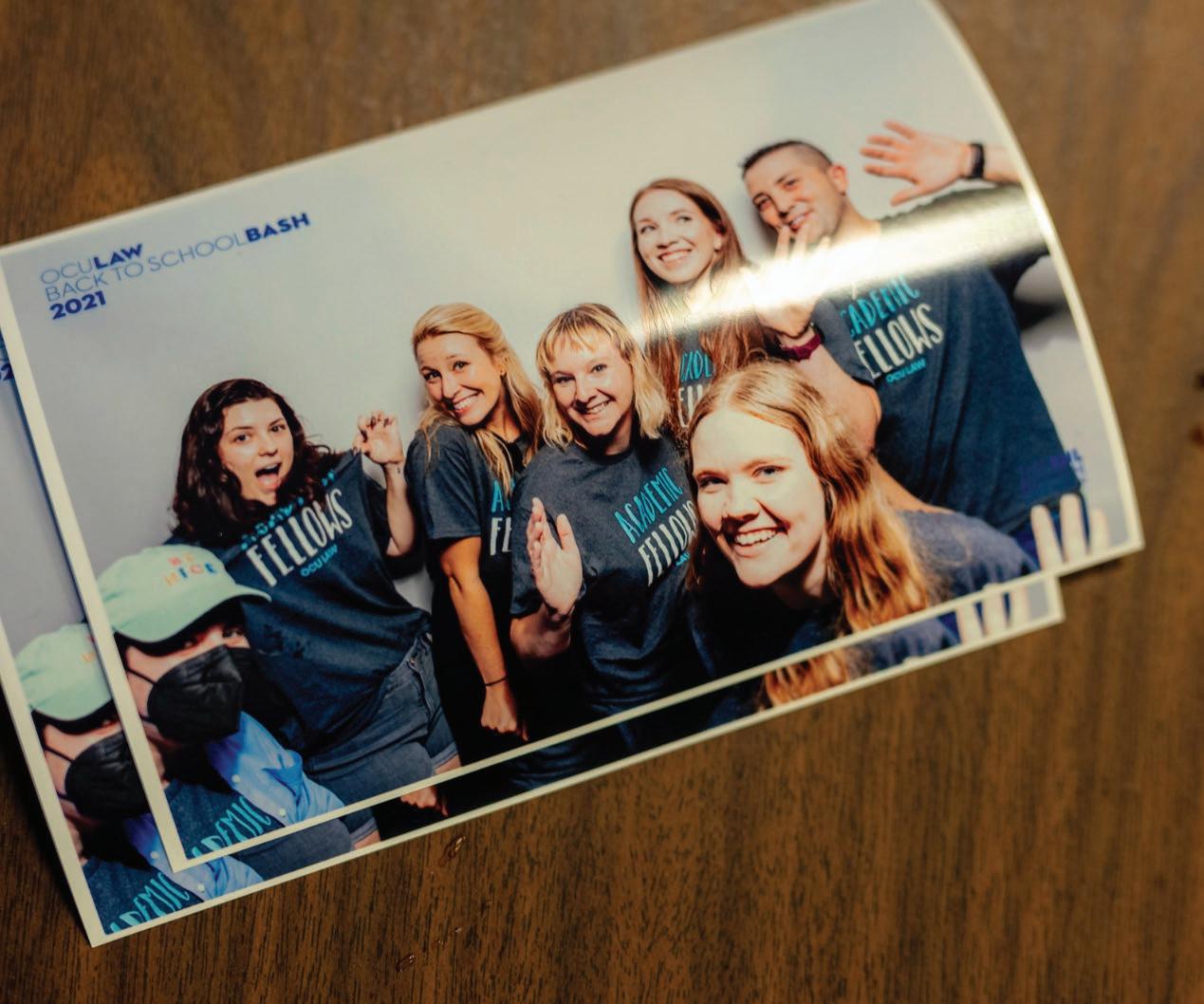
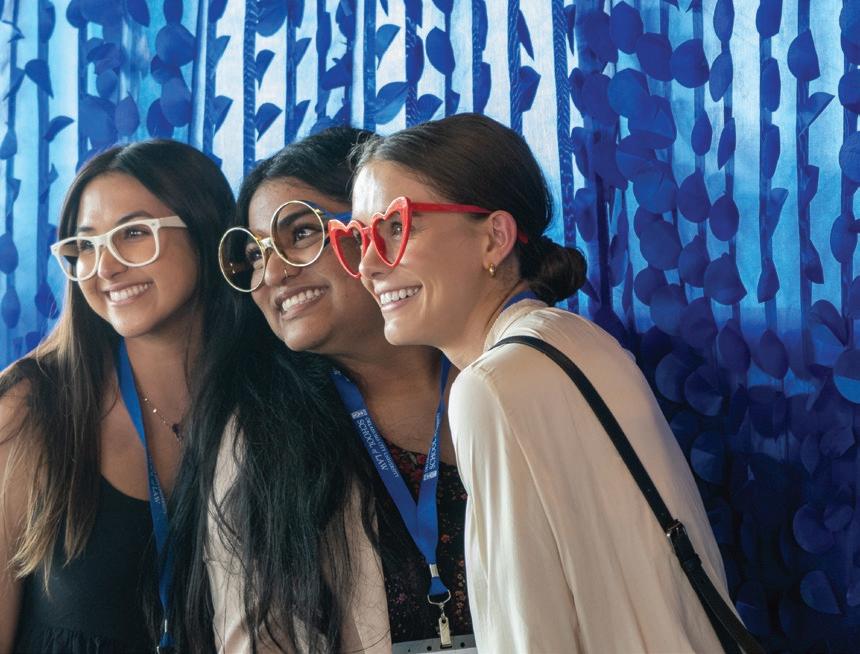
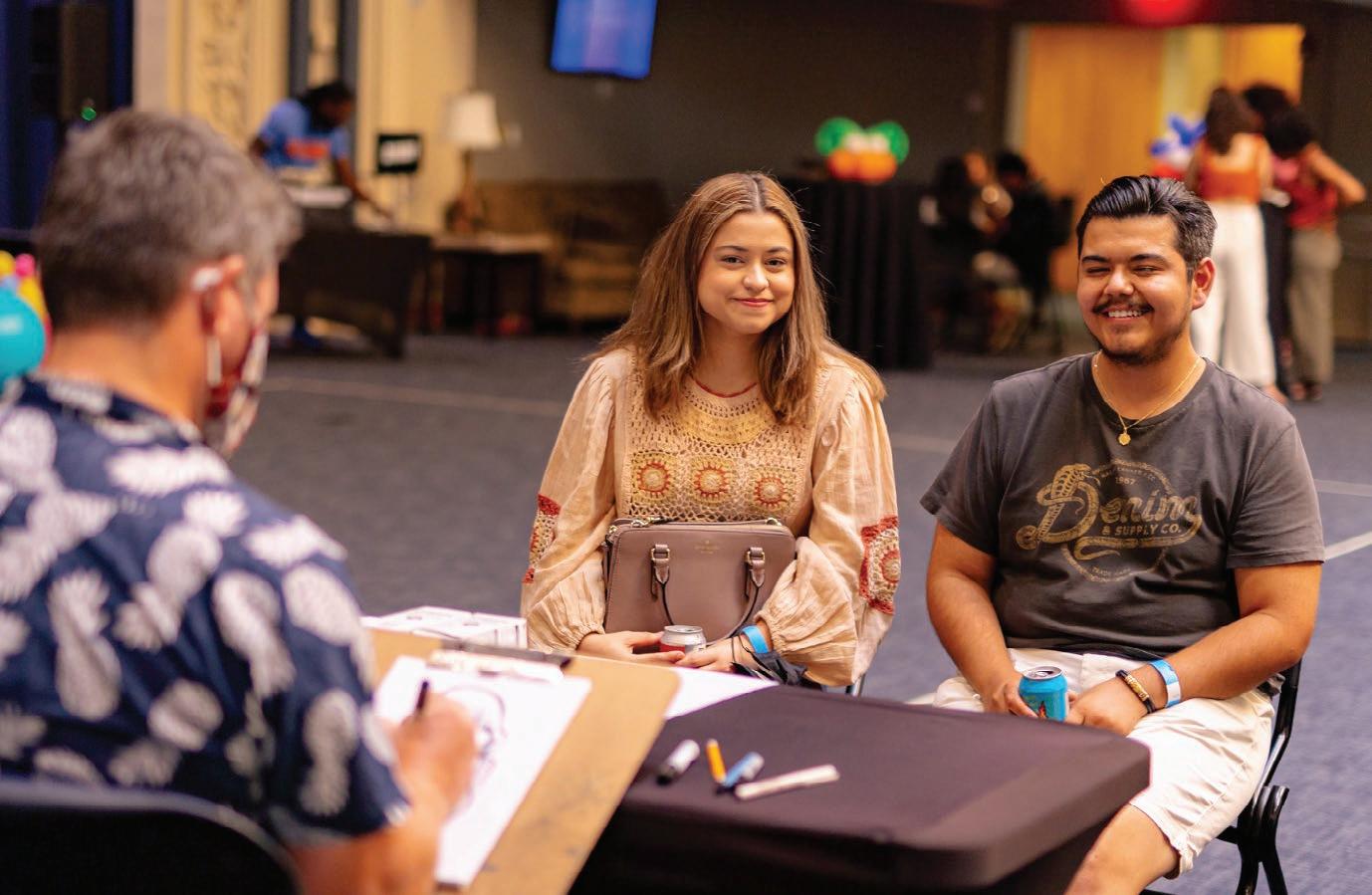
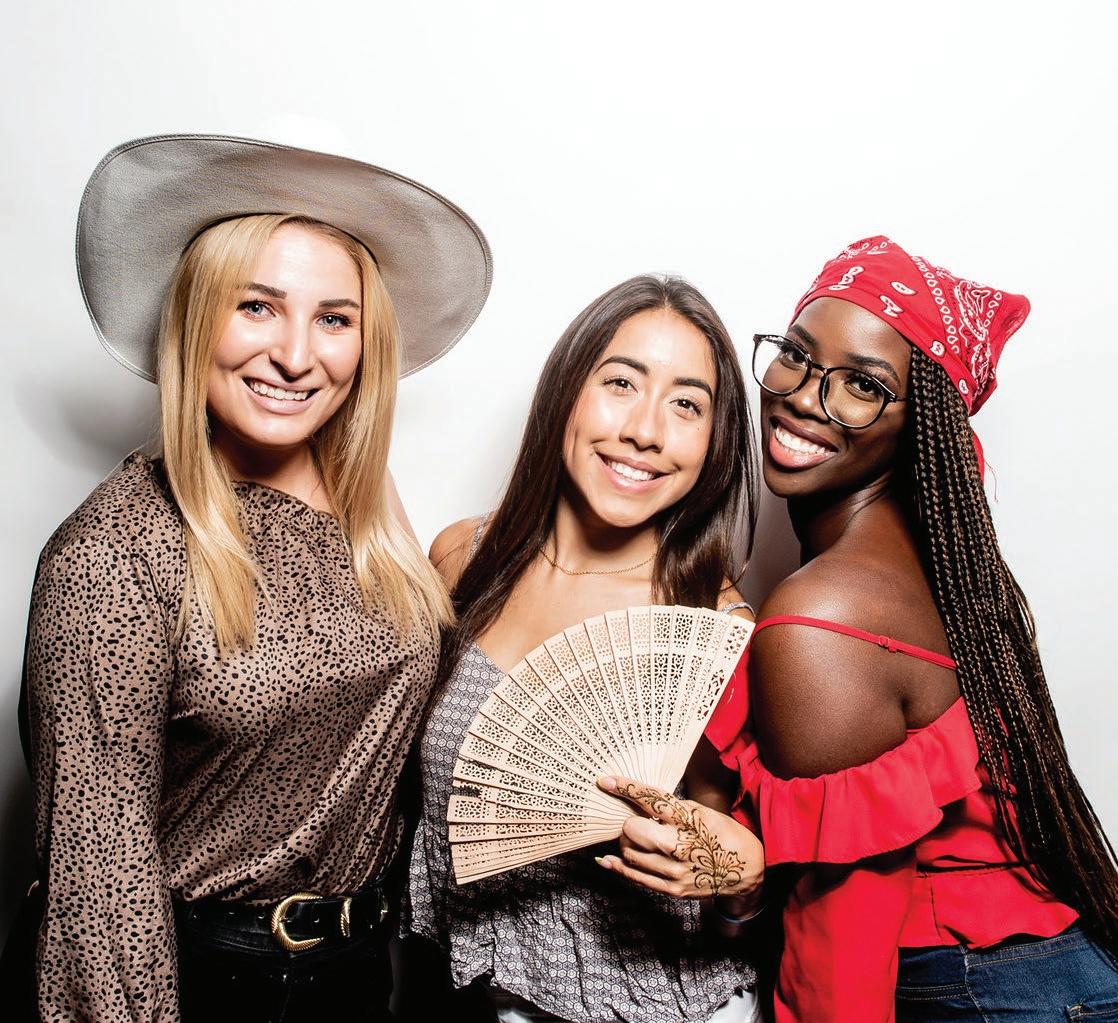 Dean Jim Roth and Philip Koszarek (and their golden retrievers) are joined by Rosemary Howard, Dr. Talia Carroll and Assistant Deans Gunter, House, and Butler at the Back to School Bash
Assistant Deans House and Gunter pose with Kelli Hildreth at Law Di Gras
Students at the Back to School Bash sat for a caricature drawing
Law School Dean Jim Roth gathers with students for the first Law Di Gras
Academic Fellows at the Back to School Bash
Students say “cheese” during orientation
Students at the Back to School Bash enjoyed food, games and fellowship
Students were all smiles at the
Dean Jim Roth and Philip Koszarek (and their golden retrievers) are joined by Rosemary Howard, Dr. Talia Carroll and Assistant Deans Gunter, House, and Butler at the Back to School Bash
Assistant Deans House and Gunter pose with Kelli Hildreth at Law Di Gras
Students at the Back to School Bash sat for a caricature drawing
Law School Dean Jim Roth gathers with students for the first Law Di Gras
Academic Fellows at the Back to School Bash
Students say “cheese” during orientation
Students at the Back to School Bash enjoyed food, games and fellowship
Students were all smiles at the
1L
2021BacktoSchoolBash
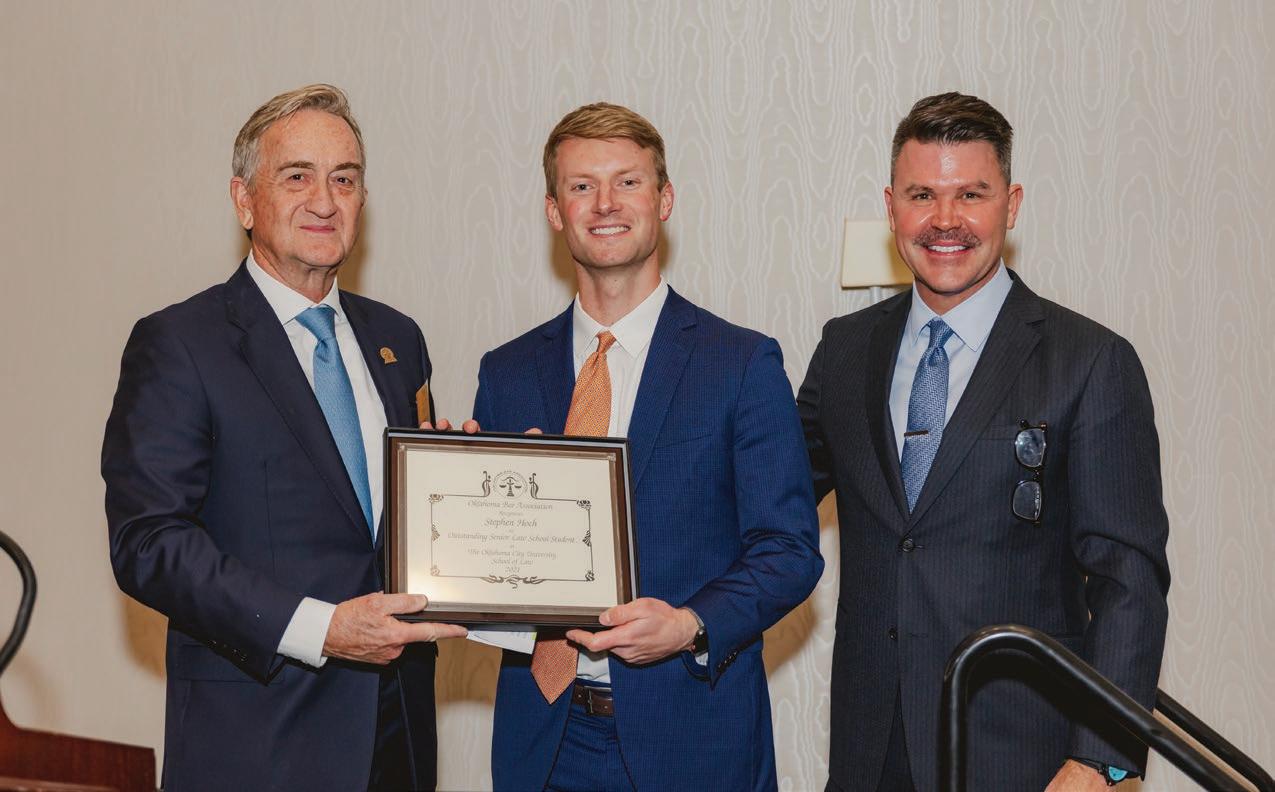

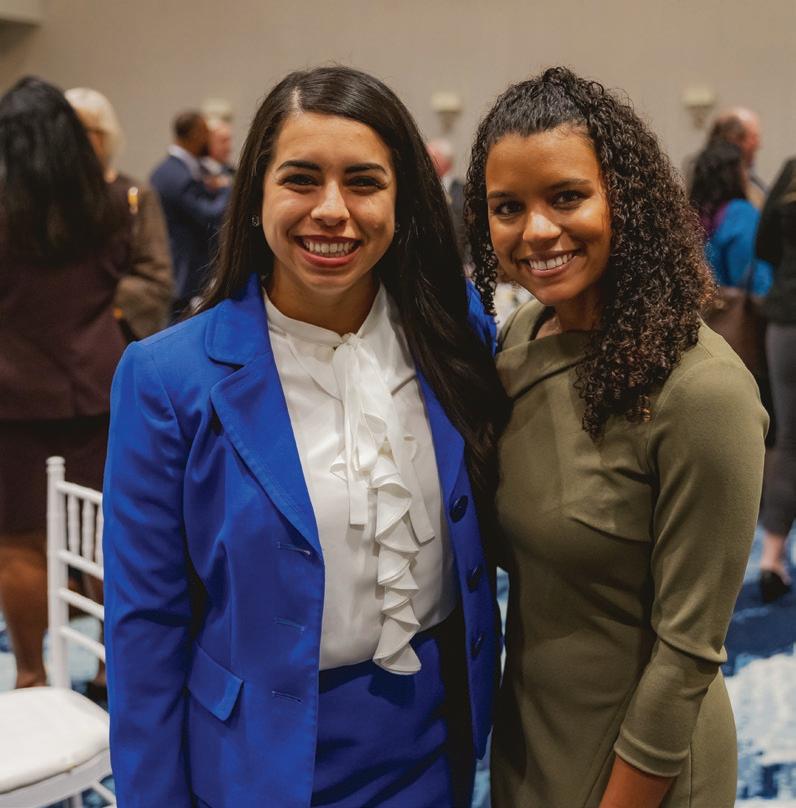
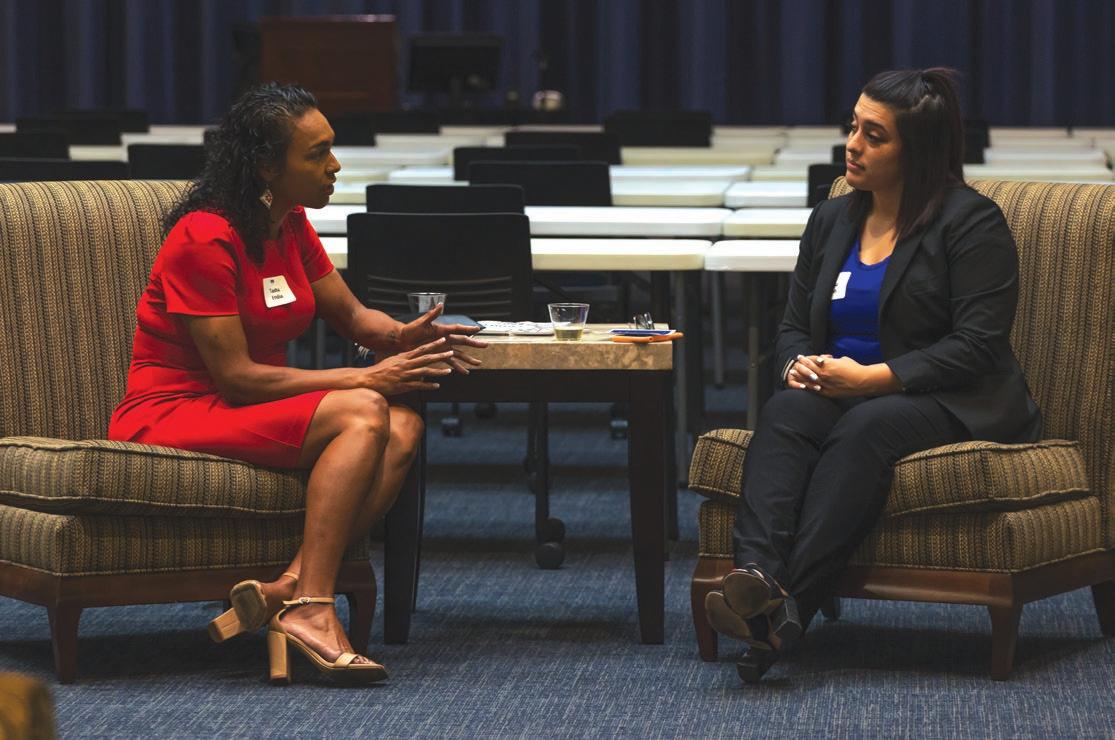
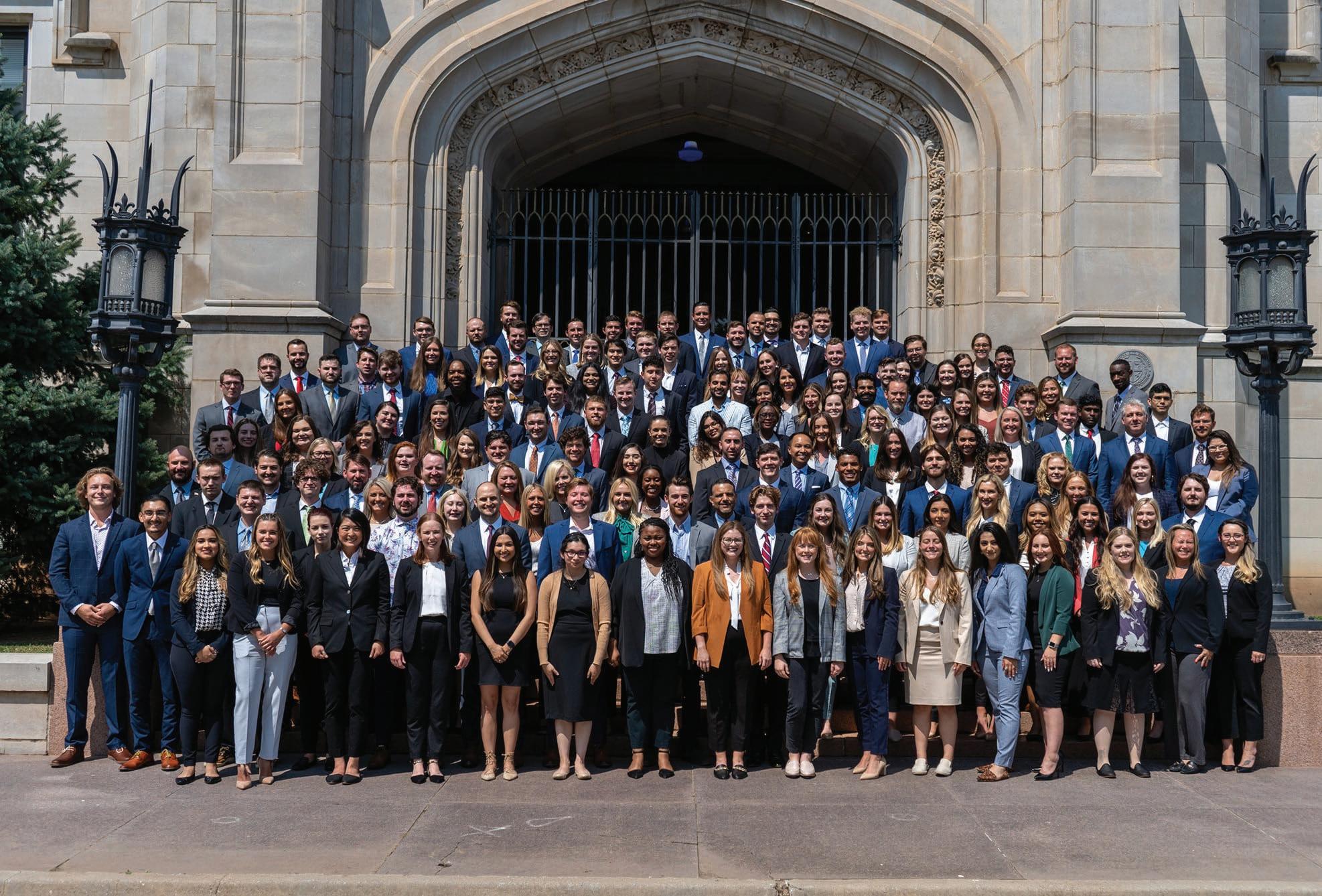 The incoming 2021 1L class during orientation
OCU Law Alumni mentors and mentees
Alumni gathered in Oklahoma City at the Law Alumni Luncheon during the OBA annual meeting Arrow-Left ARROW-RIGHT
Stephen Hoch ’22 accepts the Outstanding Senior Law Student award from Oklahoma Bar Association president Michael Mordy ’80 and Dean Jim Roth
The incoming 2021 1L class during orientation
OCU Law Alumni mentors and mentees
Alumni gathered in Oklahoma City at the Law Alumni Luncheon during the OBA annual meeting Arrow-Left ARROW-RIGHT
Stephen Hoch ’22 accepts the Outstanding Senior Law Student award from Oklahoma Bar Association president Michael Mordy ’80 and Dean Jim Roth
What Makes OCU Law
SPECIAL
Oklahoma City University School of Law pro vides a unique experience to each student who walks through the door. When students are debating on the best institution for their legal education, I always remind them to find the law school where they will be supported, encouraged, and are able to find the system of faculty, staff, and students who will help them move forward. For many, OCU Law is that place.
Housed in the first public high school in Okla homa City, our historic building adds charm, beauty, and sophistication. When you walk through the halls of this building you can feel the generations of students who have come before you. Located in downtown, minutes from federal and state courthous es, major law firms and corporations, our students have access to the very best legal opportunities.

Our law school has some of the most diverse and award-winning faculty who care about the community and their students. You will learn from former federal public defenders; big firm associates and adjuncts from all ar eas of legal practice. The open-door policy and support of student organizations allow professors and students to develop strong relationships. From advising on law review articles to discussing the latest Supreme Court case, our faculty engage with stu dents on a level that allows students to be come the best thinkers and analyzers in the state. Our faculty can be found on local news channels sharing their legal opinion on any given day. These moments put our faculty in the spotlight and give our students more opportunities to engage in meaningful and thought-provoking conversations.
Students graduate and walk away with an un forgettable experience. From the friendships that are grown to the experiences you never imagined you would have. Here at OCU Law we know you will have an experience of a life time. Our students work on notable cases in
GIVING BACK
the Innocence Clinic, helping wrongfully convicted people find freedom. With opportunities like the pro bono housing eviction legal assistance pro gram, our students impact local Oklahomans who are facing eviction. These direct practice experi ences not only change our students but change our community. Our students can take advantage of externship opportunities across Oklahoma and the nation. From healthcare to nonprofits, to gov ernment agencies, there is a place for you to grow, learn, and develop while being under the supervi sion of a licensed attorney. These are just small ex amples of how OCU Law creates an experience like no other in Oklahoma.
The community at OCU Law is one of collabora tion, encouragement, and fun! While the impres sion of law school is one of a competitive nature, OCU Law is one of a collaborative nature. I like to describe the law school as a track team. While ev eryone may want to be first, they don’t have to trip the person in the lane next to them to win. Stu dents learn together, study together, and prepare together and push each other to become better lawyers in training. Outside of the classroom, the greatest friendships are formed. From meeting new classmates at orientation, to relaxing at one of the many social events hosted by the law school students, our faculty and staff build a community. While law school can feel overwhelming, OCU Law’s wellness programs provide the avenue to release the stress. From stress relief week pri or to finals to access to mental health profession als, our Office of Student Services seeks to offer opportunities to manage anything life may send a student’s way. Students gain access to wellness programs and education as early as orientation. Student services don't stop with health and well ness. It extends to career services who will begin working with you in your first semester, making sure you are prepared for interviews to start you on your path to your legal career.
Our alumni are some of the most prestigious in the country. From the Mayor of Oklahoma City to White House advisors, to Oklahoma Supreme Court Justices, our alumni serve in all areas of the law. No matter what your goal is upon grad uation, you won’t have to forage that path alone. Our alumni connect with students from orien tation through graduation. As you enter your 1L year you have 3 years to create a professional ver sion of yourself. This program allows students to recognize their skills, and to grow into the attor neys they were meant to be. With over 7,000 alum ni across the nation, our students are joining a leg acy of influencers.
No matter your goal, OCU Law can help you ac complish it. Come to Learn. Learn to Lead. Wel come to Oklahoma City University School of Law, an experience like no other.
 BY MICHELLE D. GUNTER
ASSISTANT DEAN for ADMISSIONS
Photograph by Simon Hurst
BY MICHELLE D. GUNTER
ASSISTANT DEAN for ADMISSIONS
Photograph by Simon Hurst

